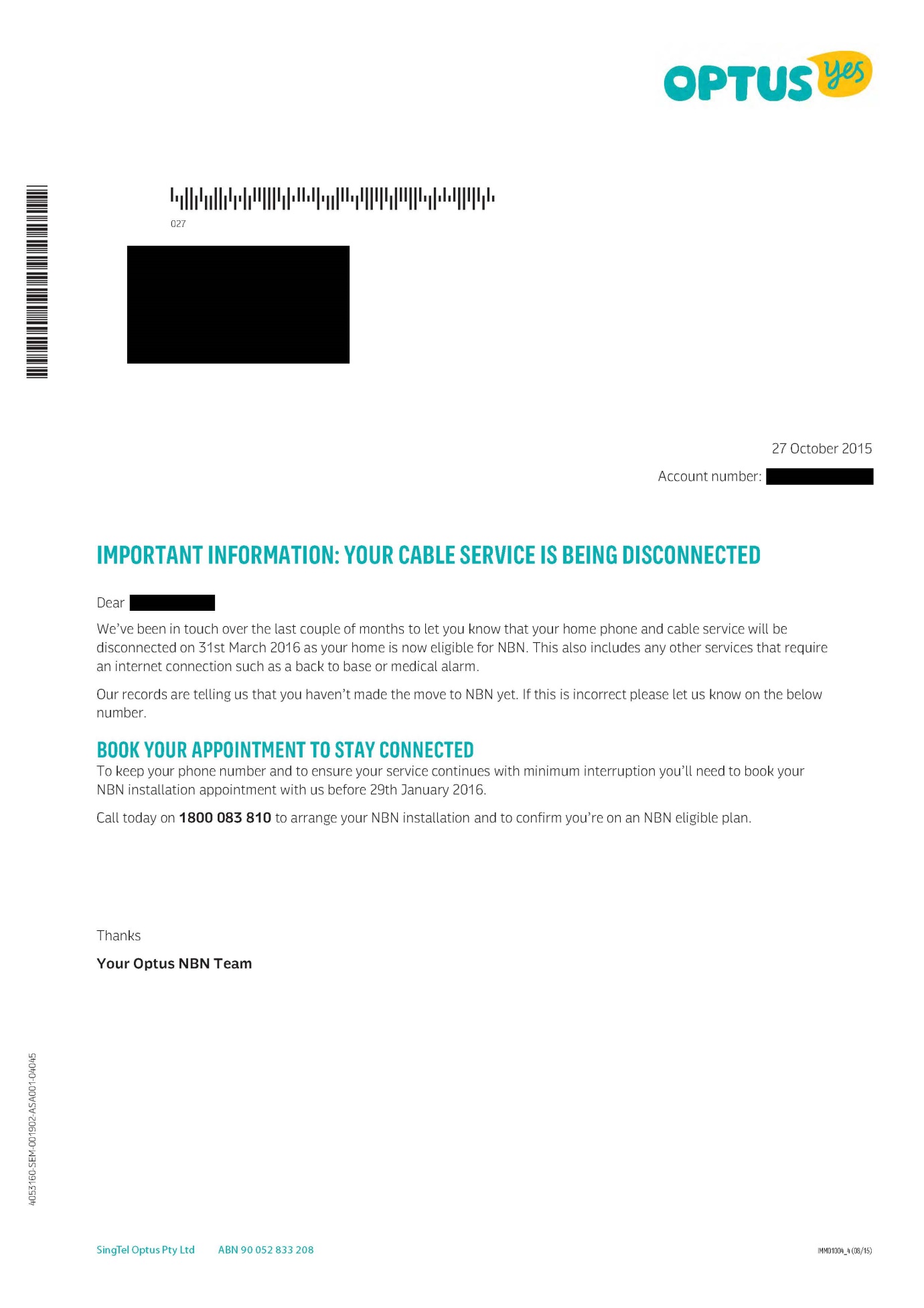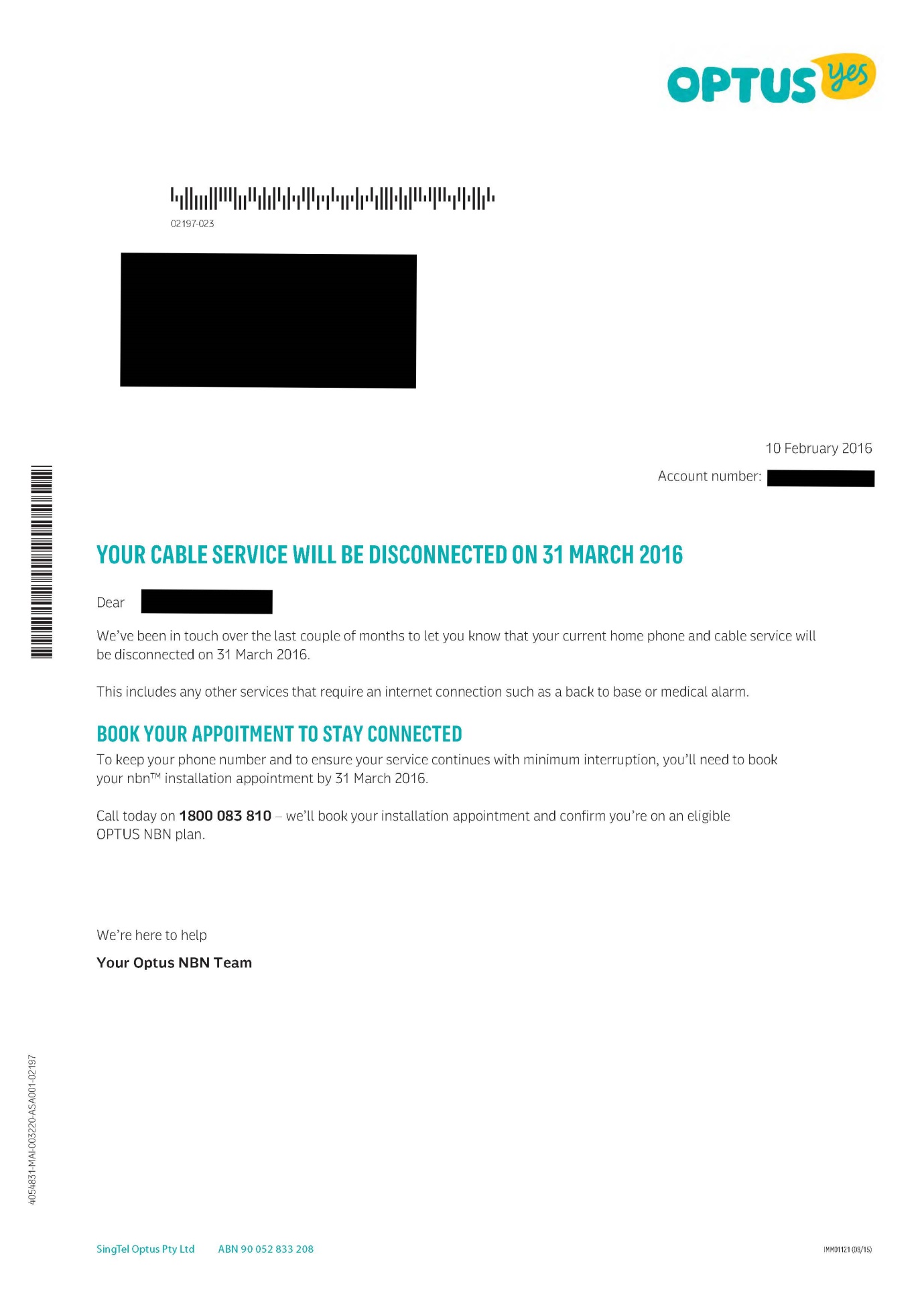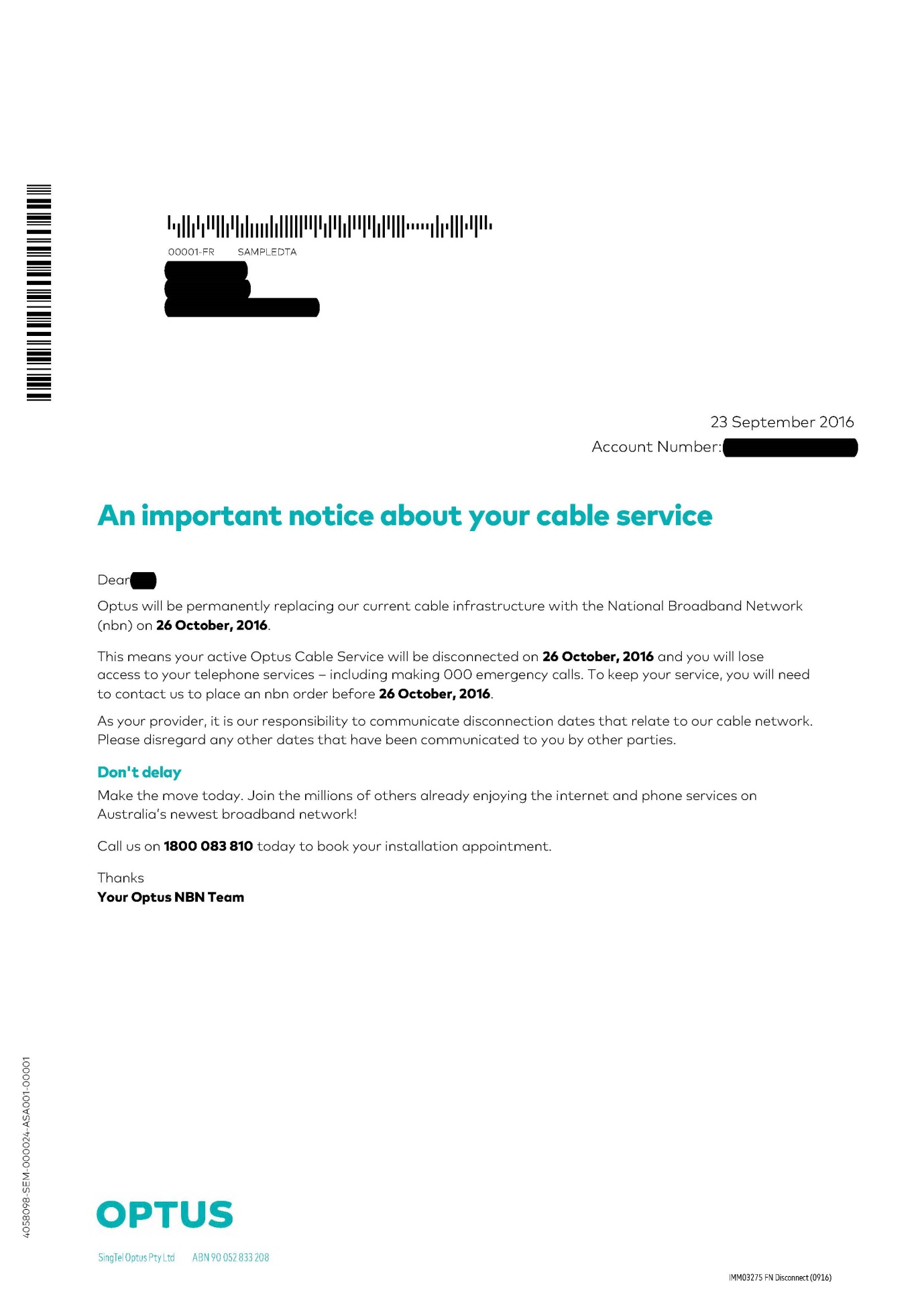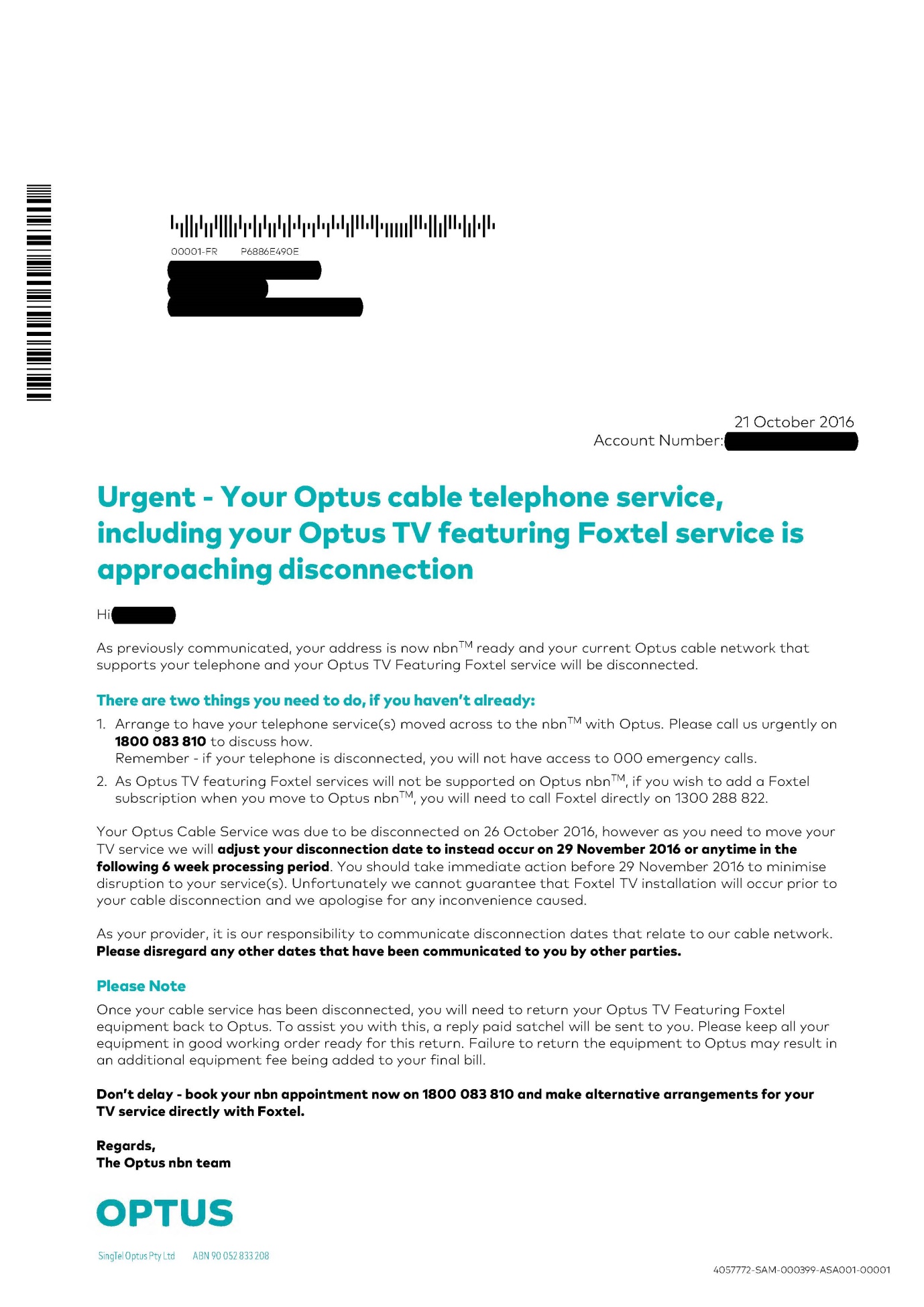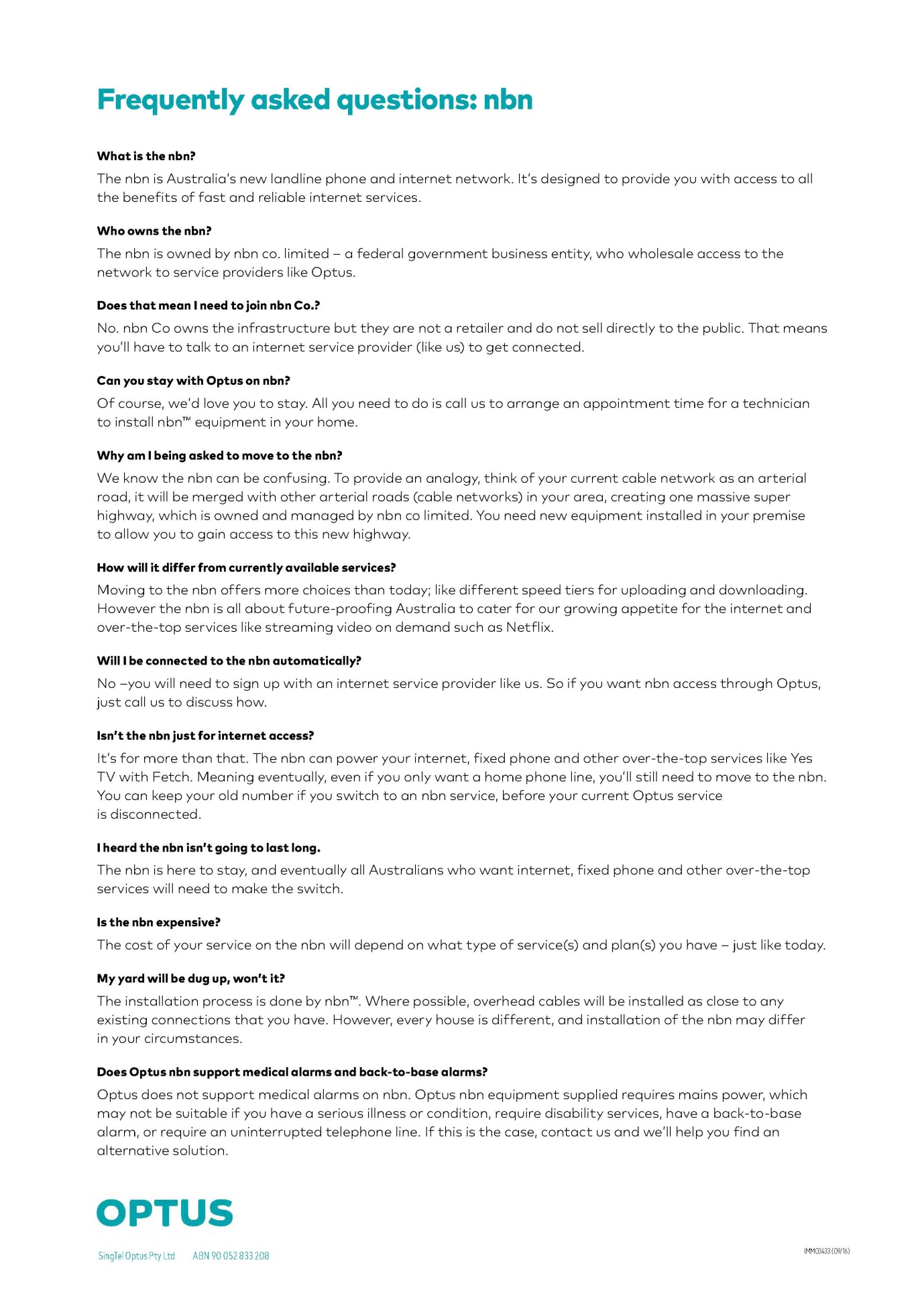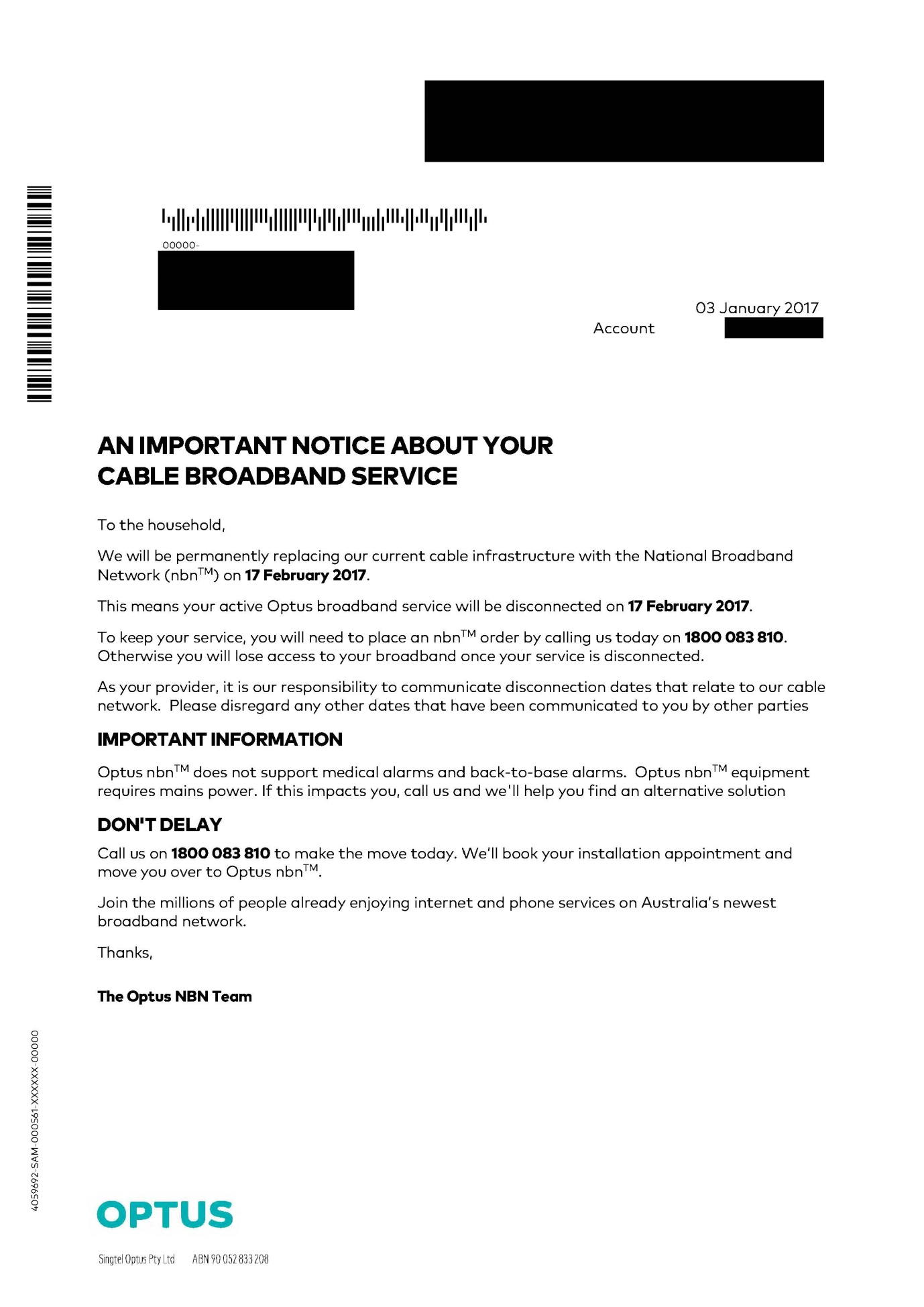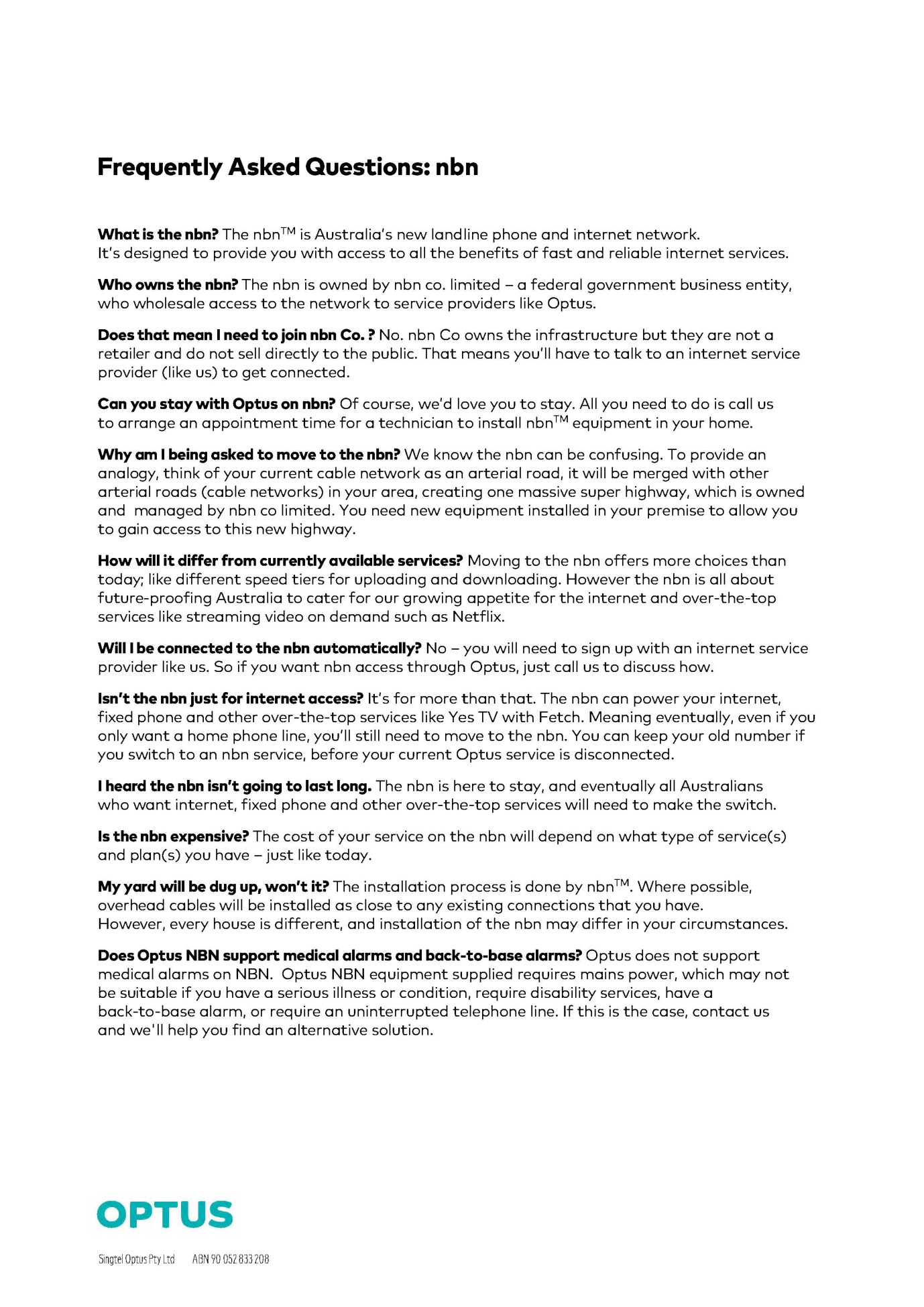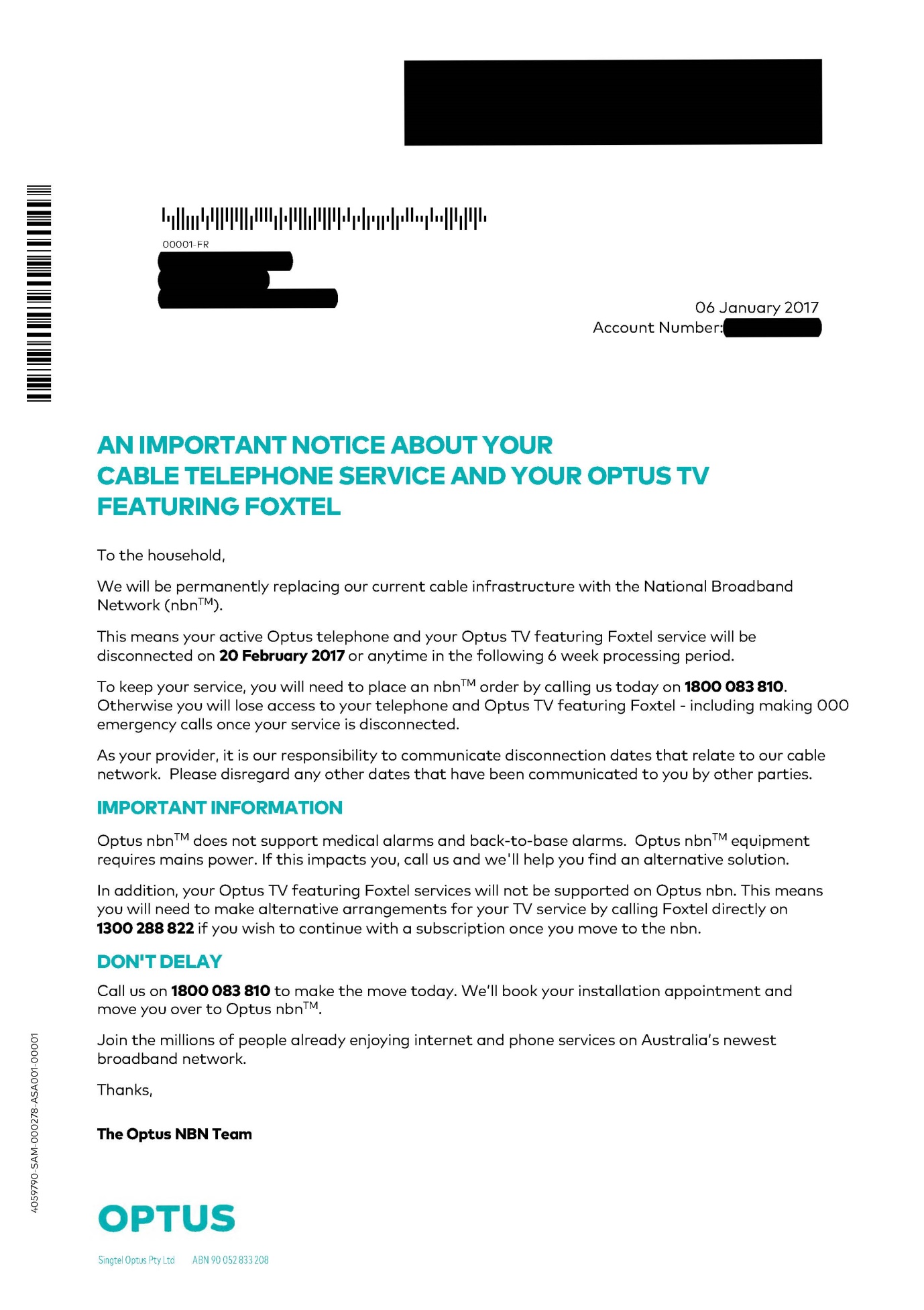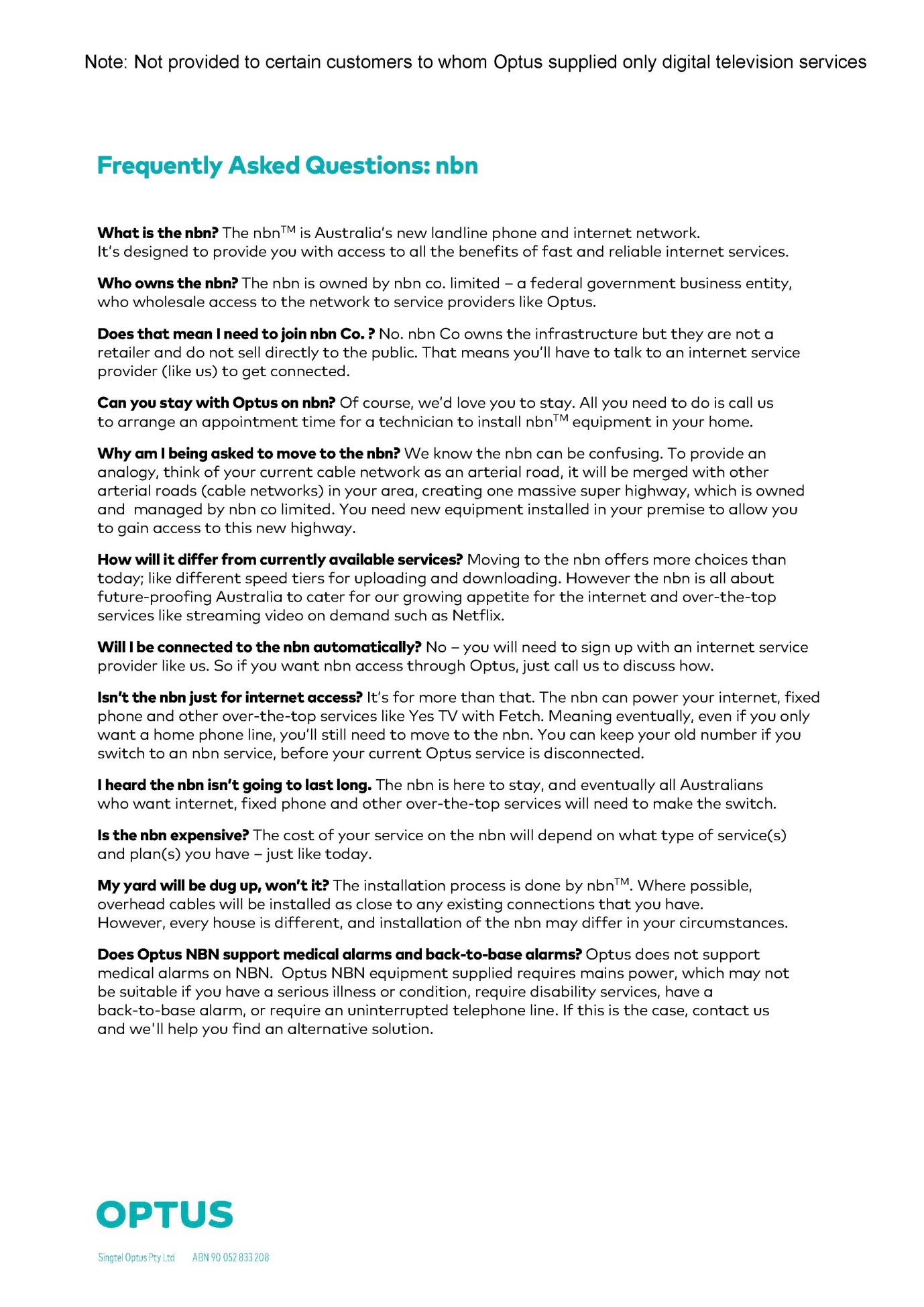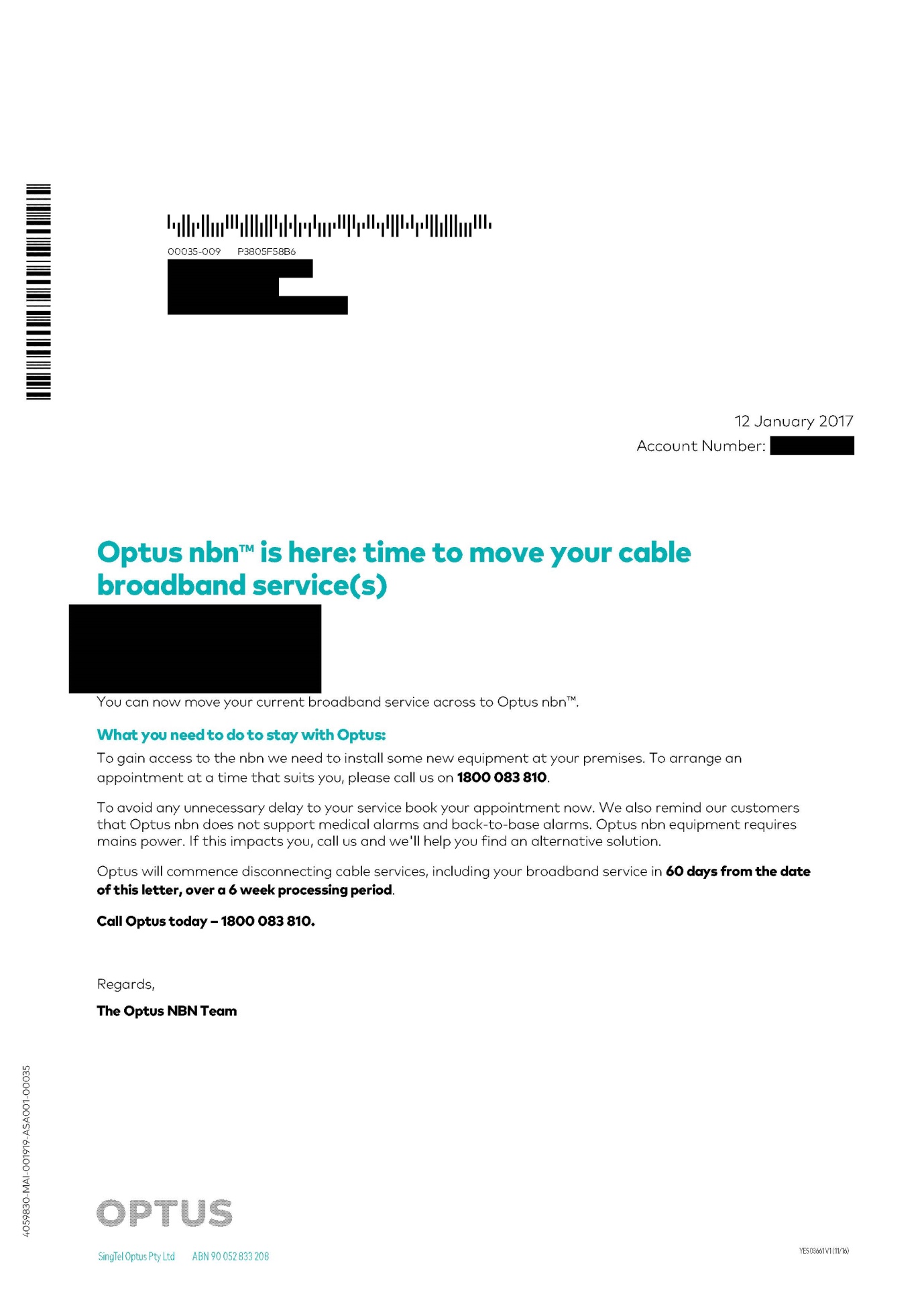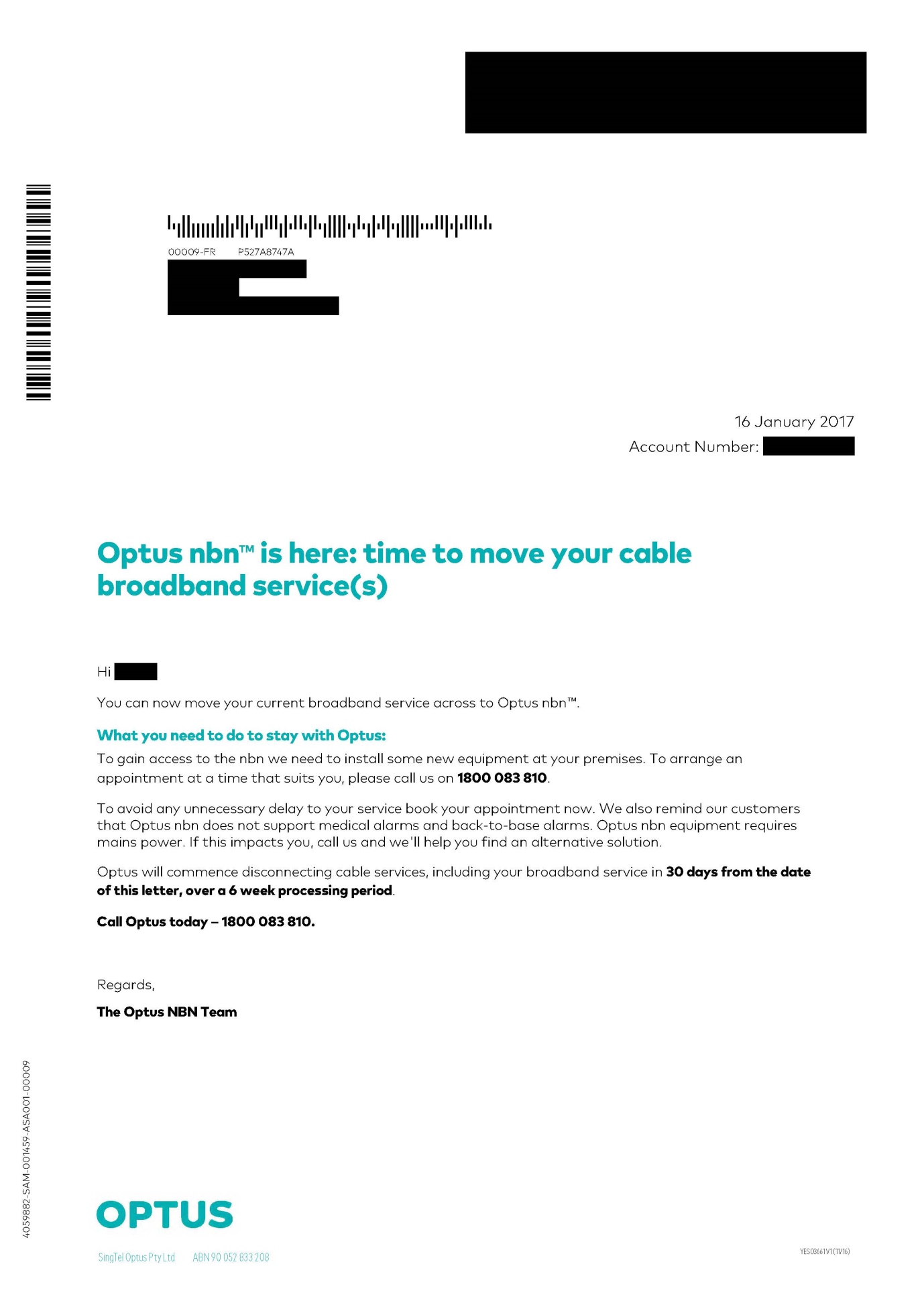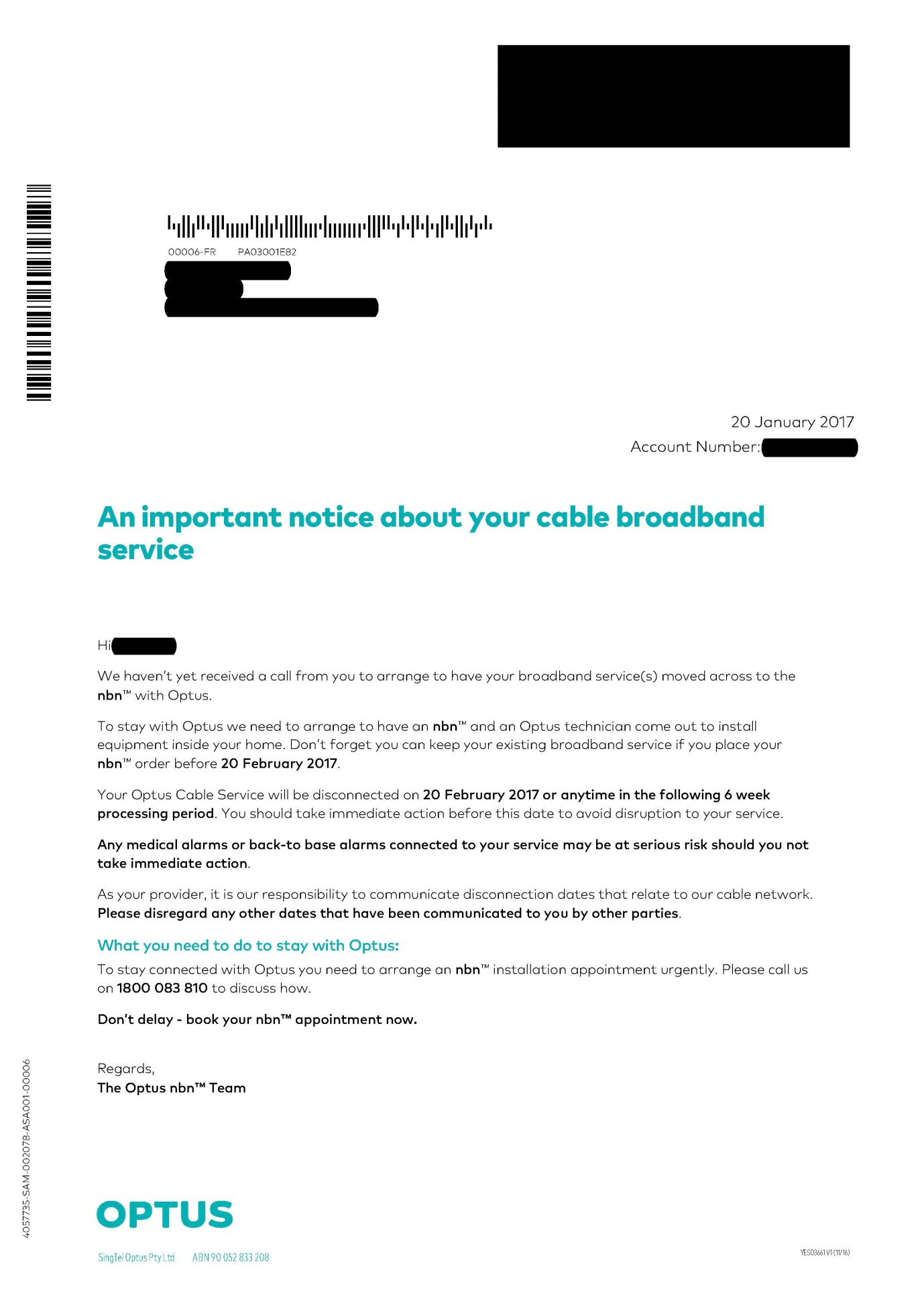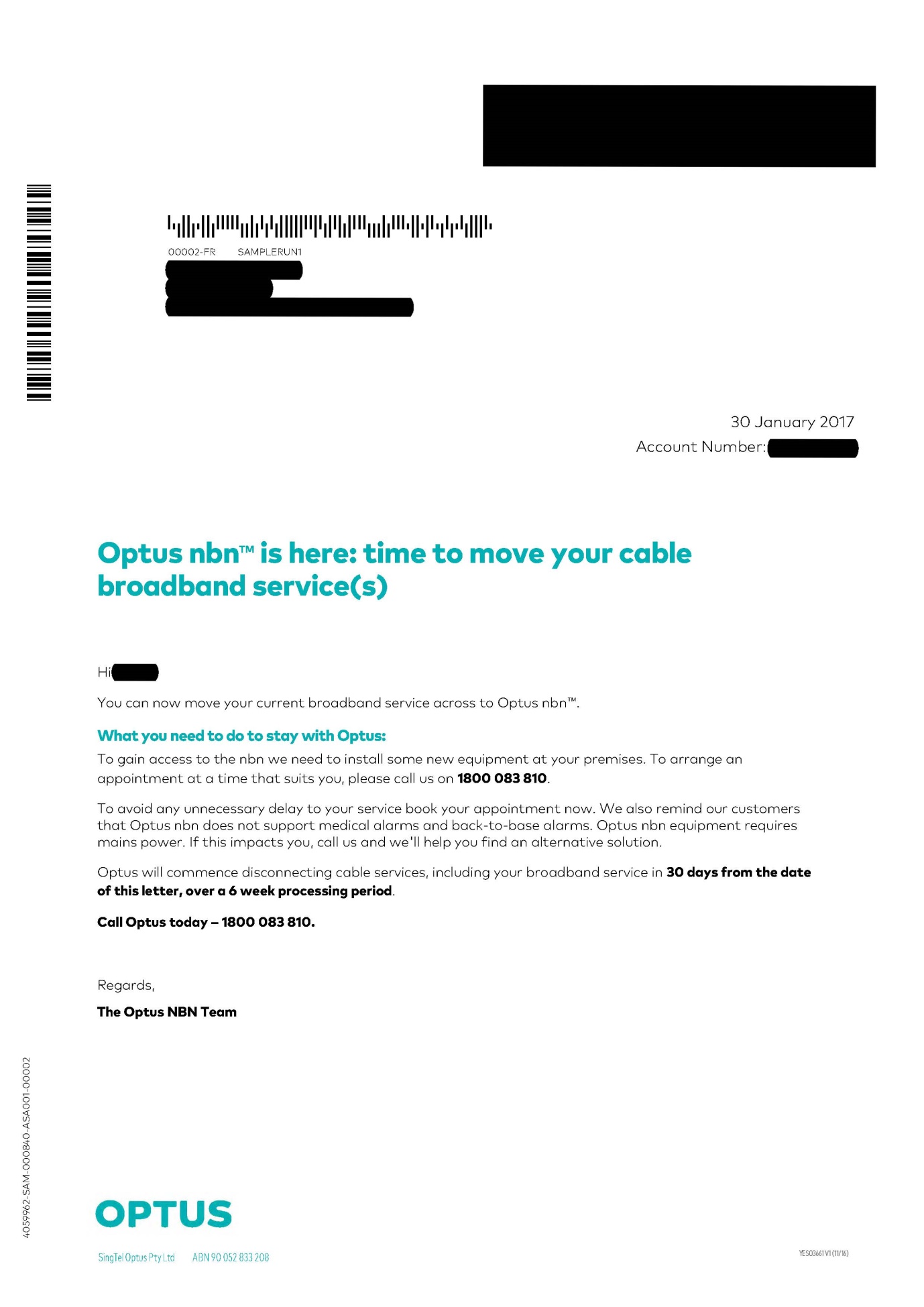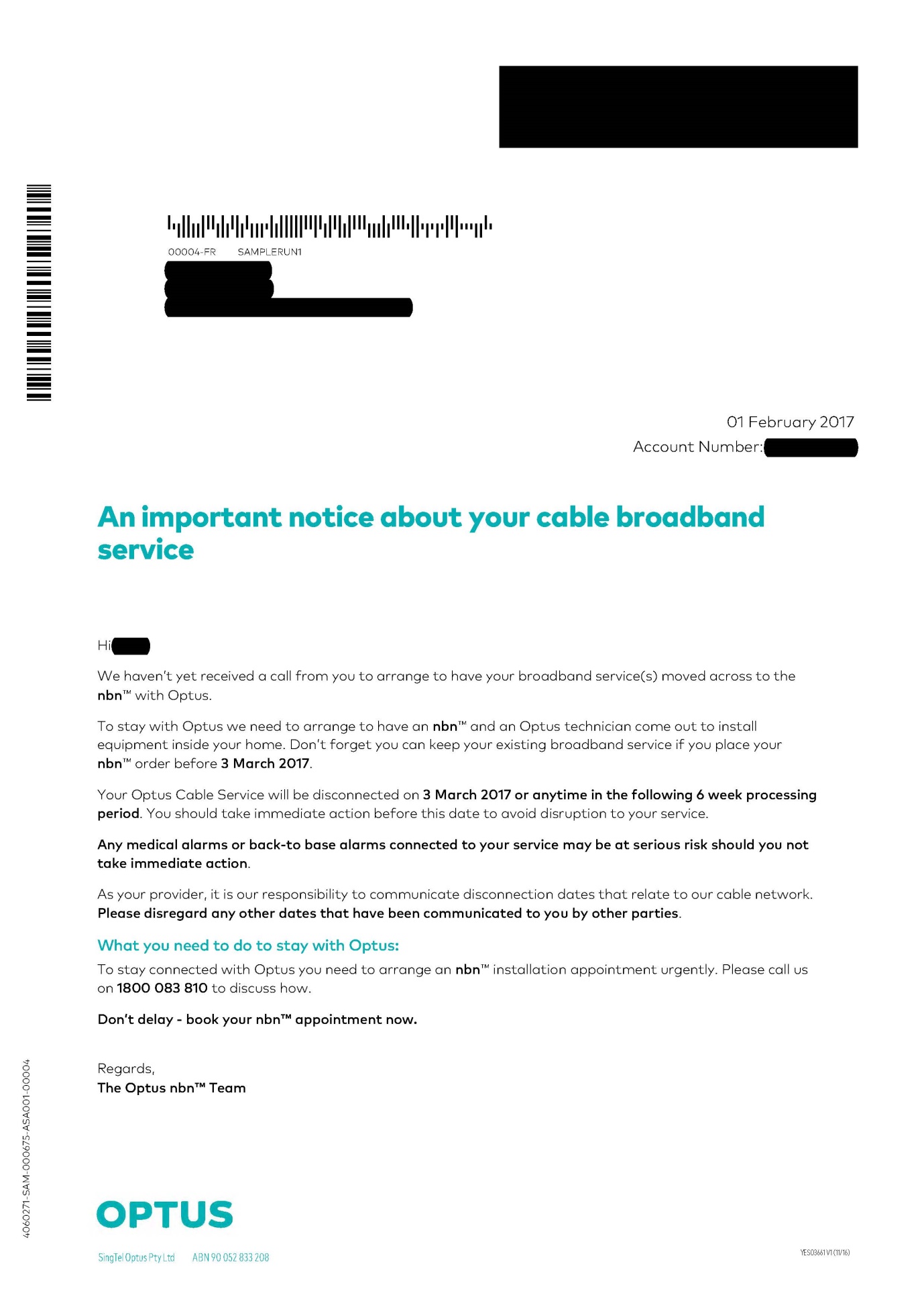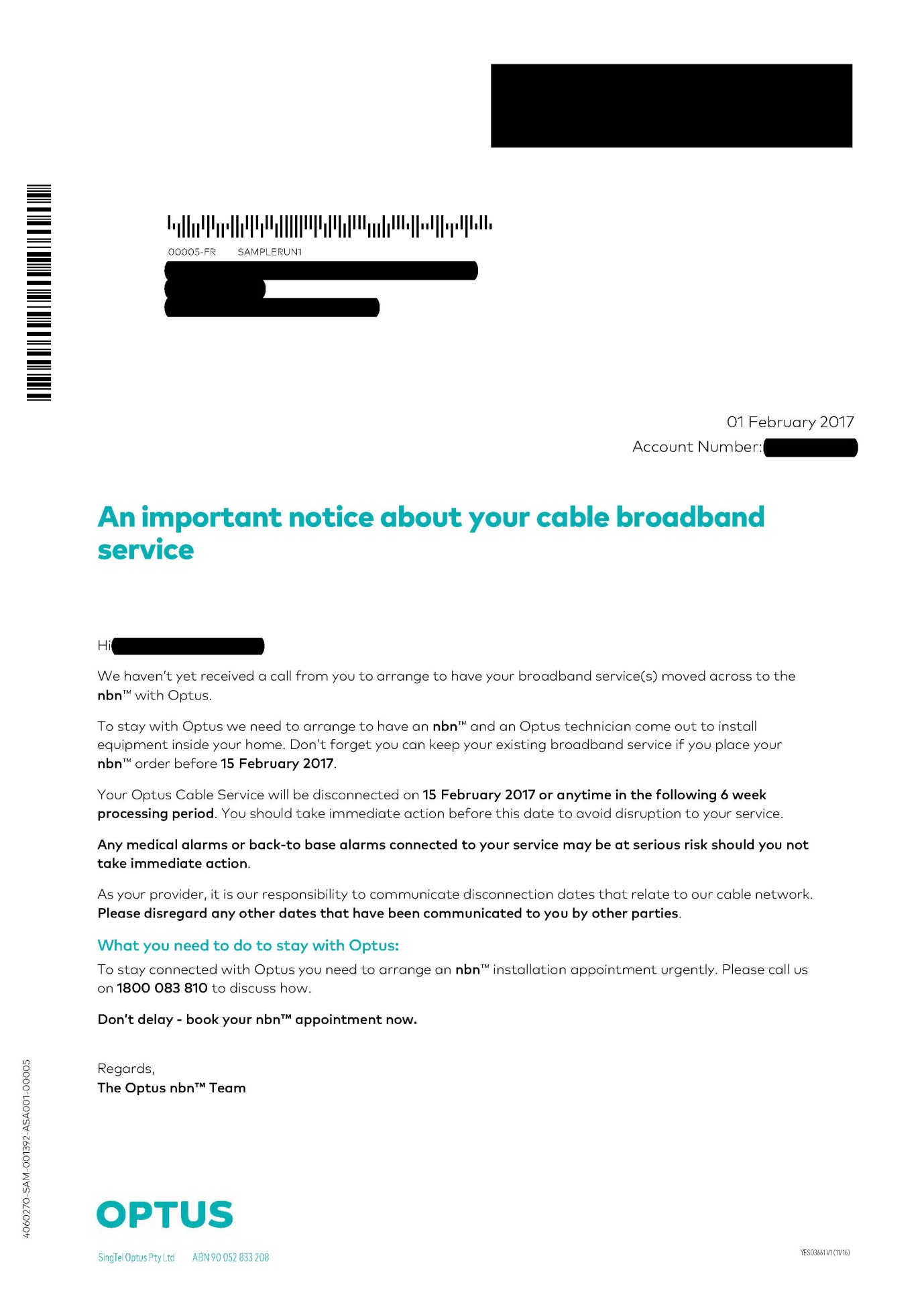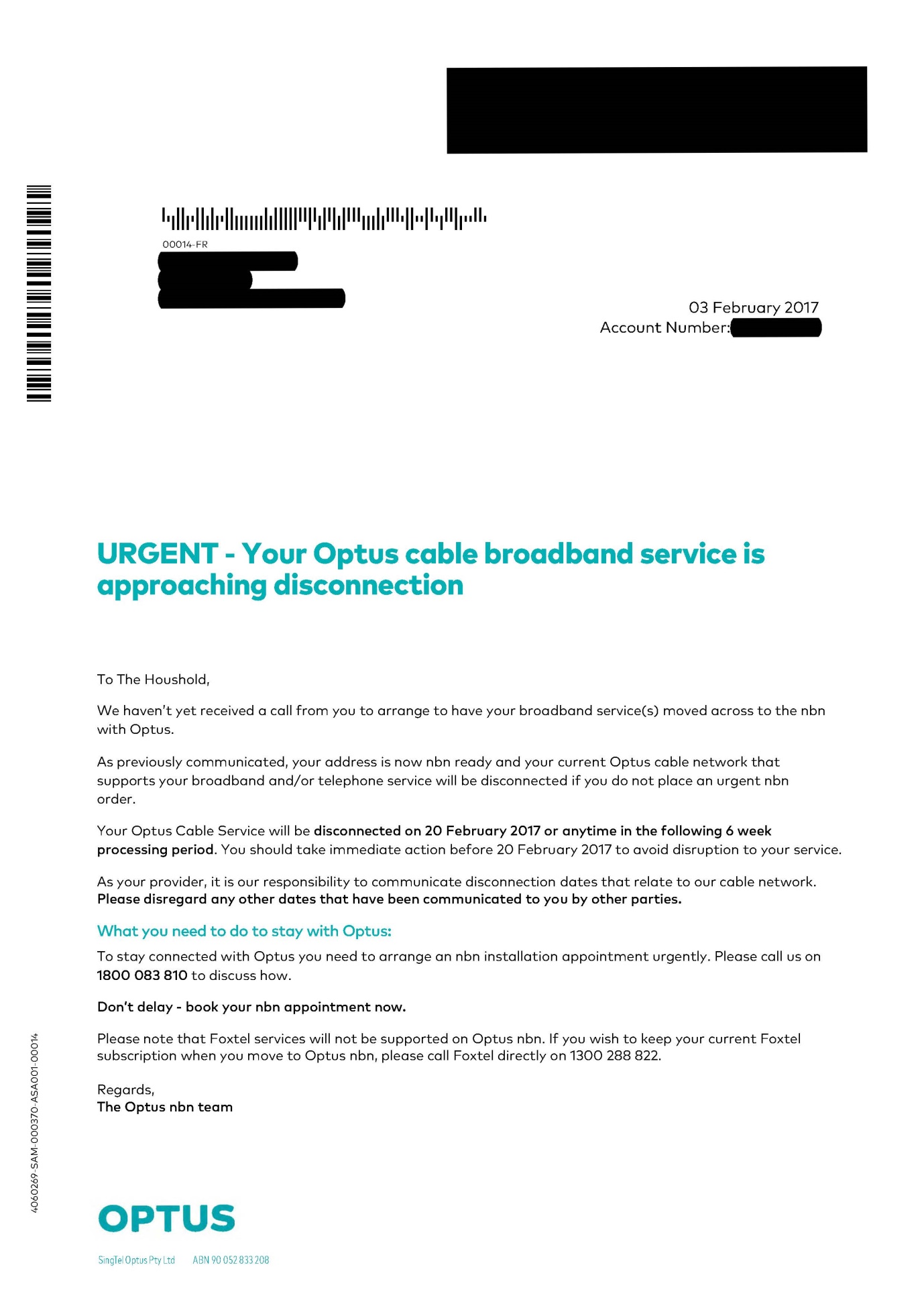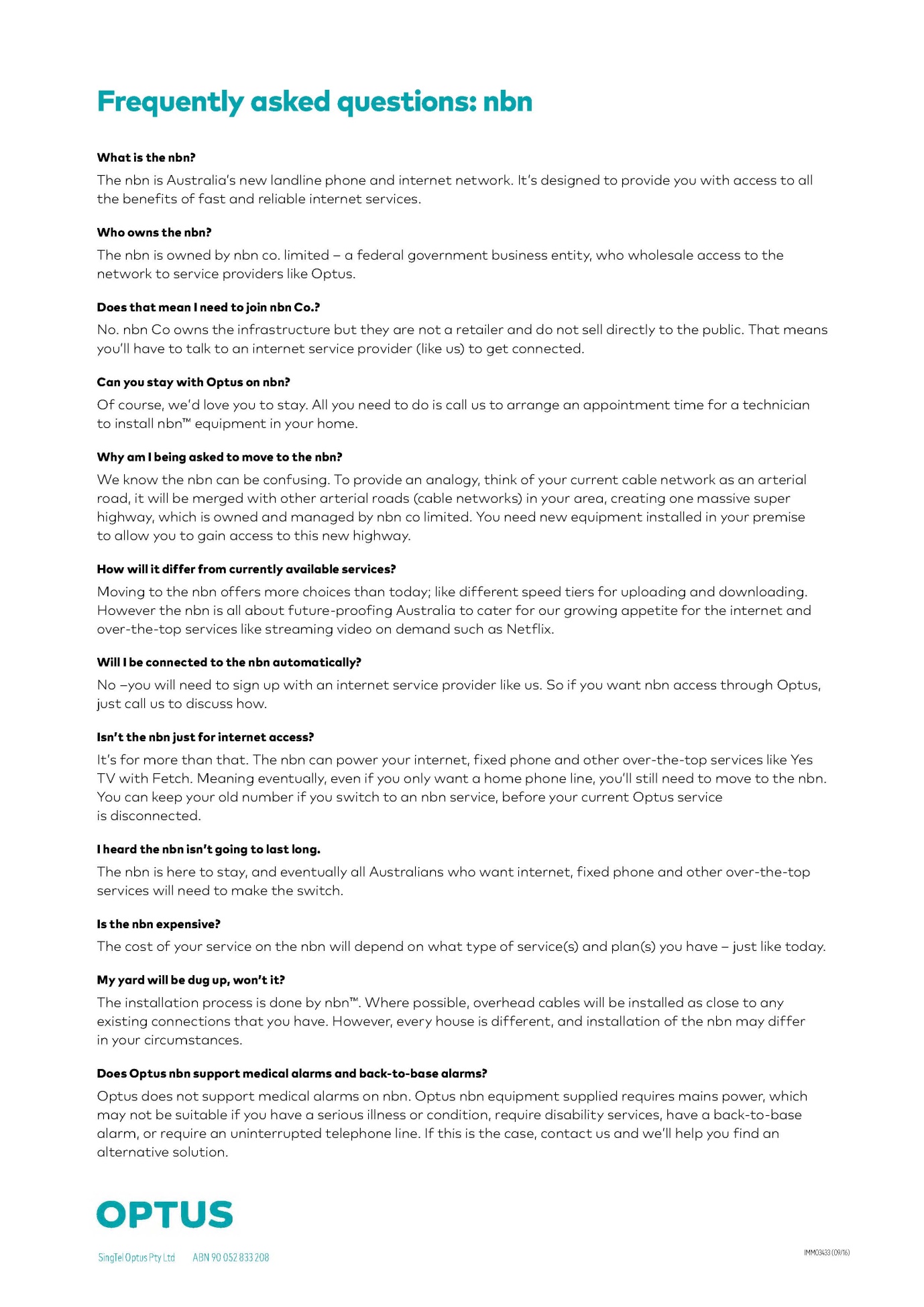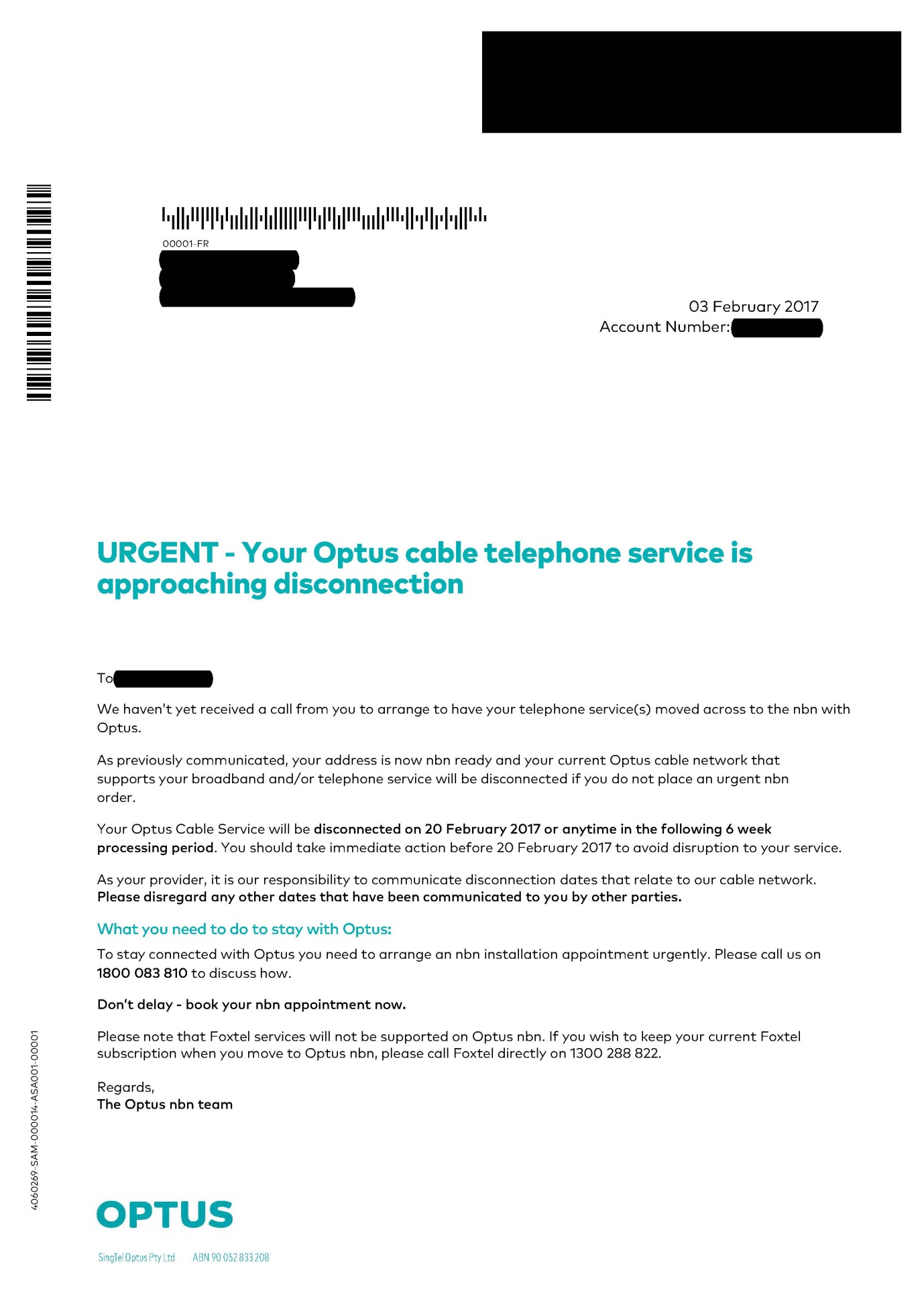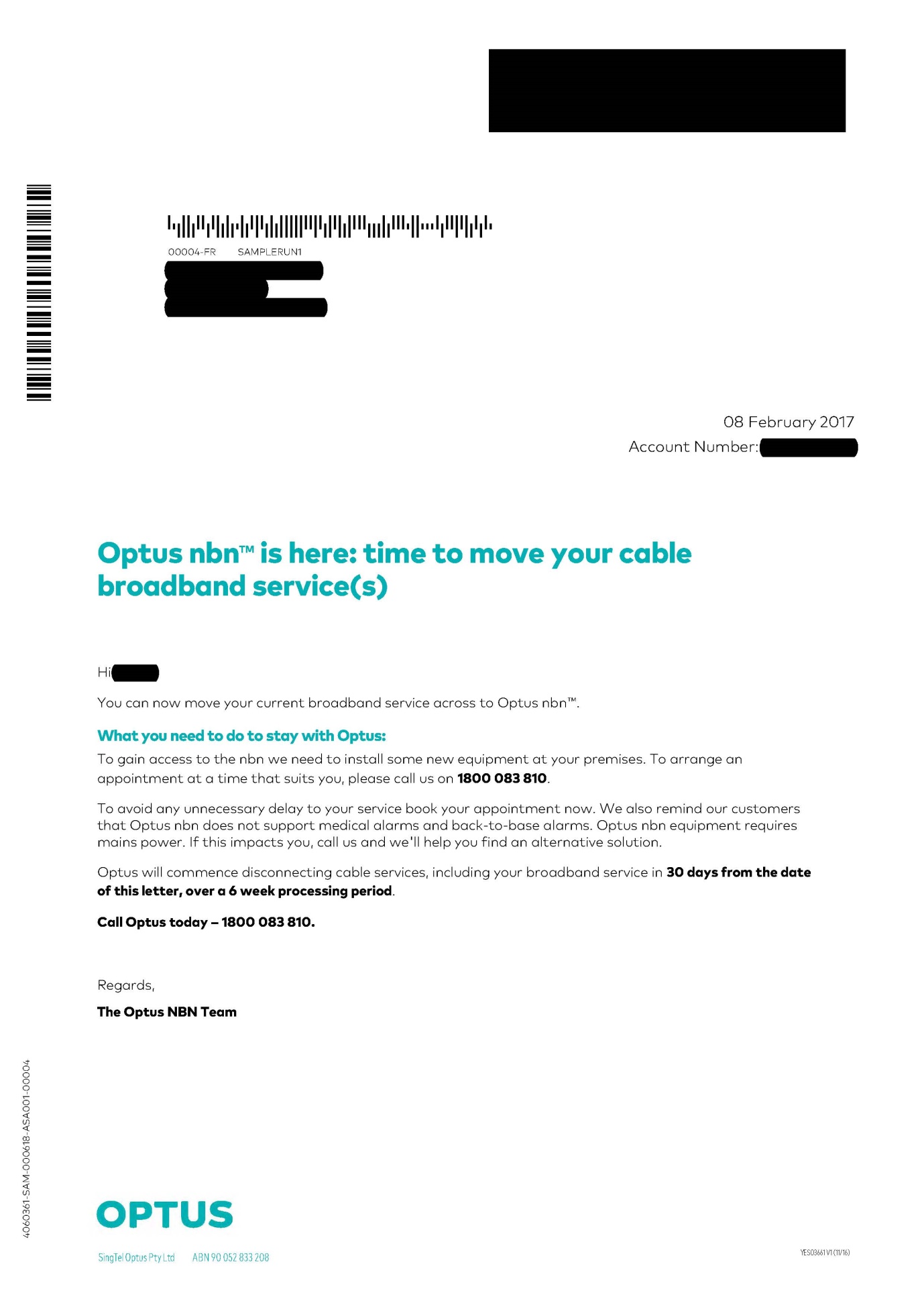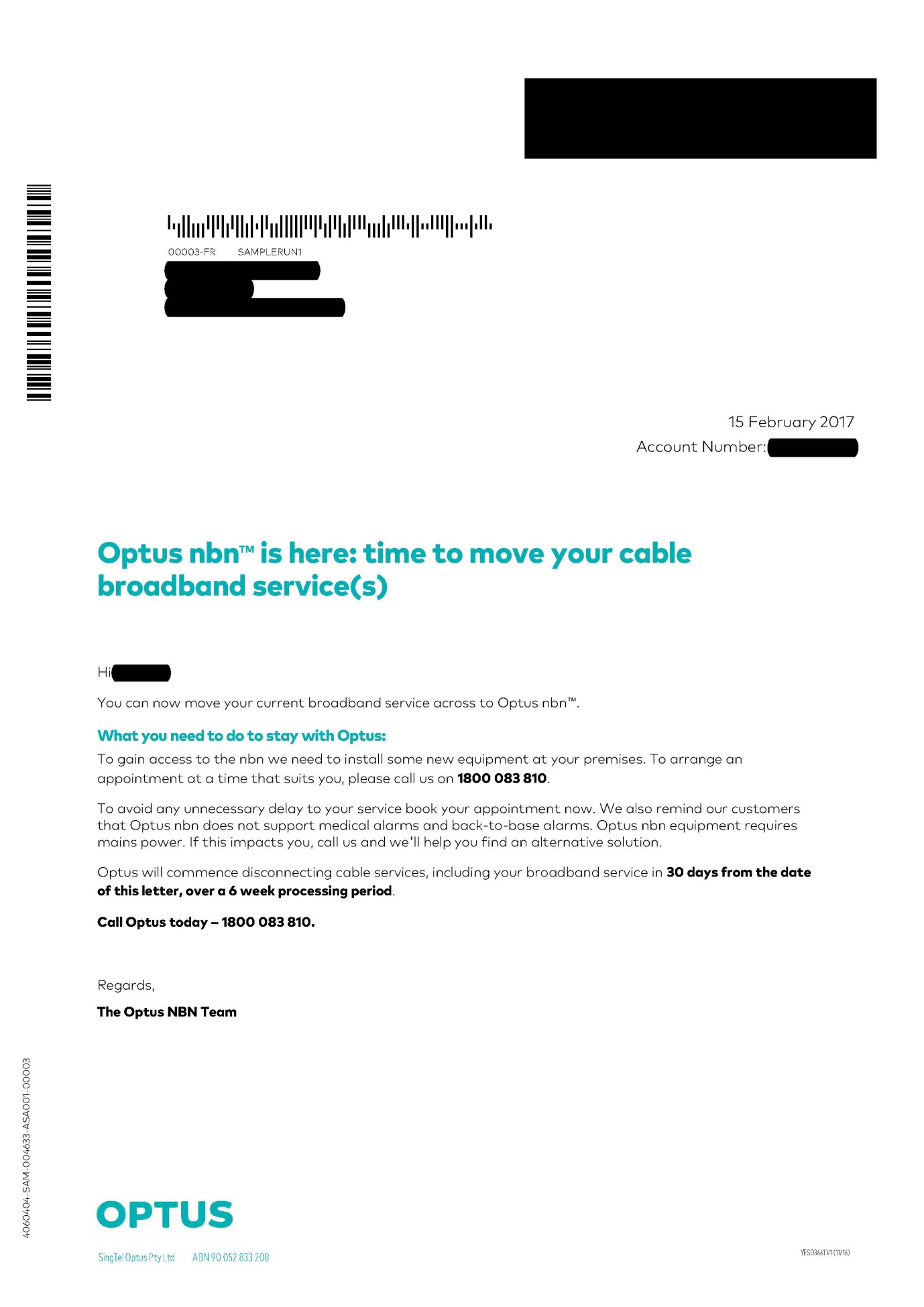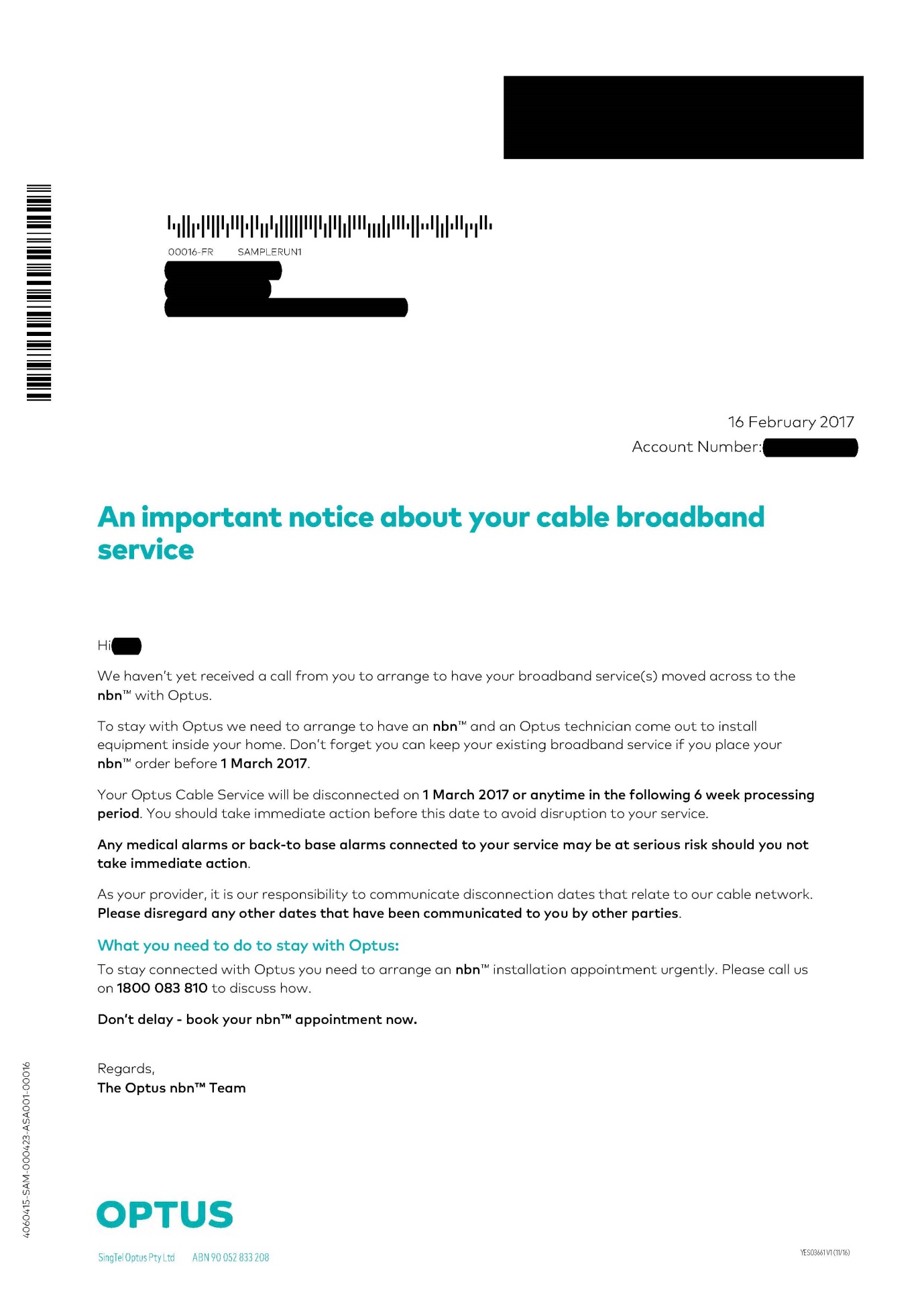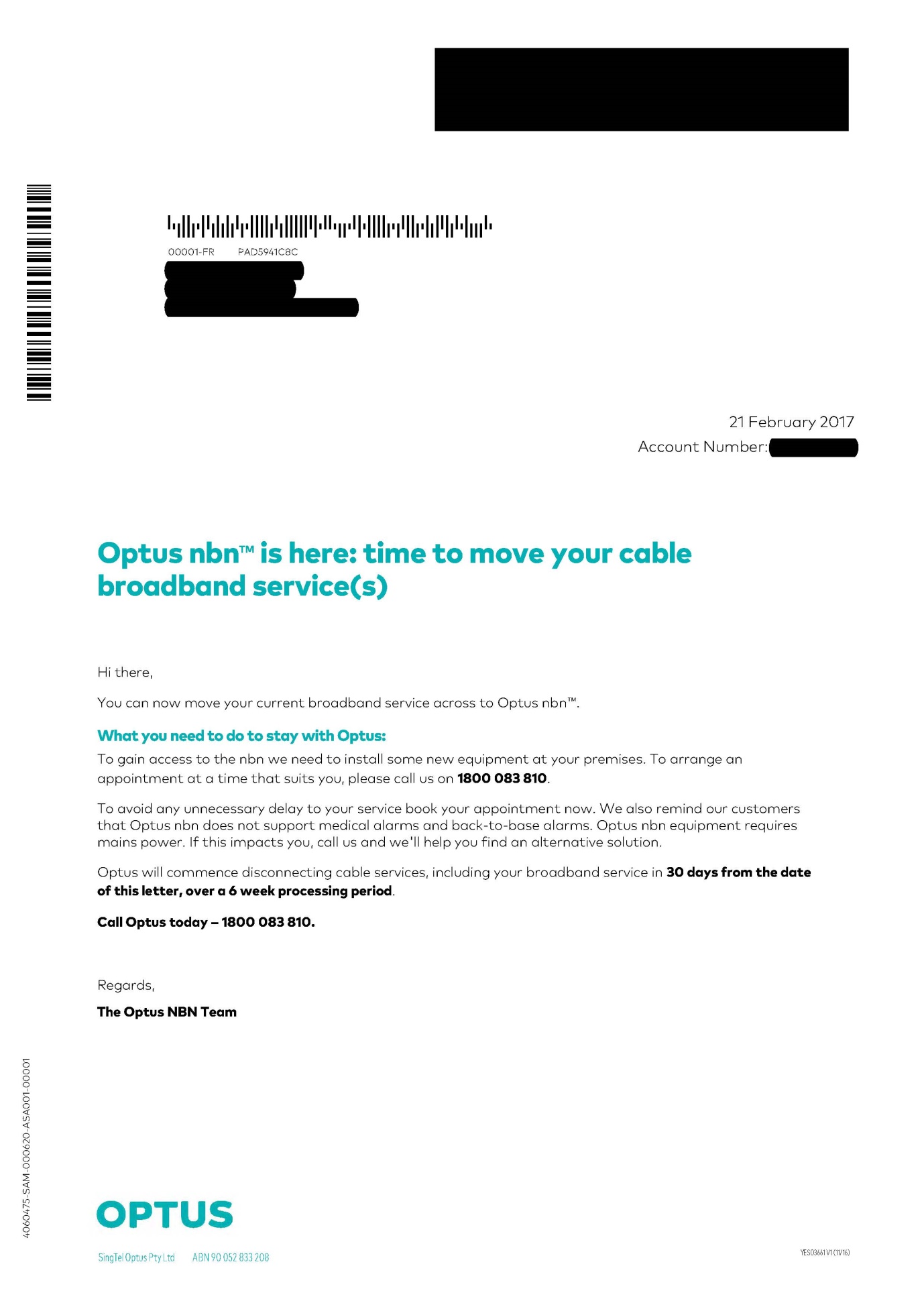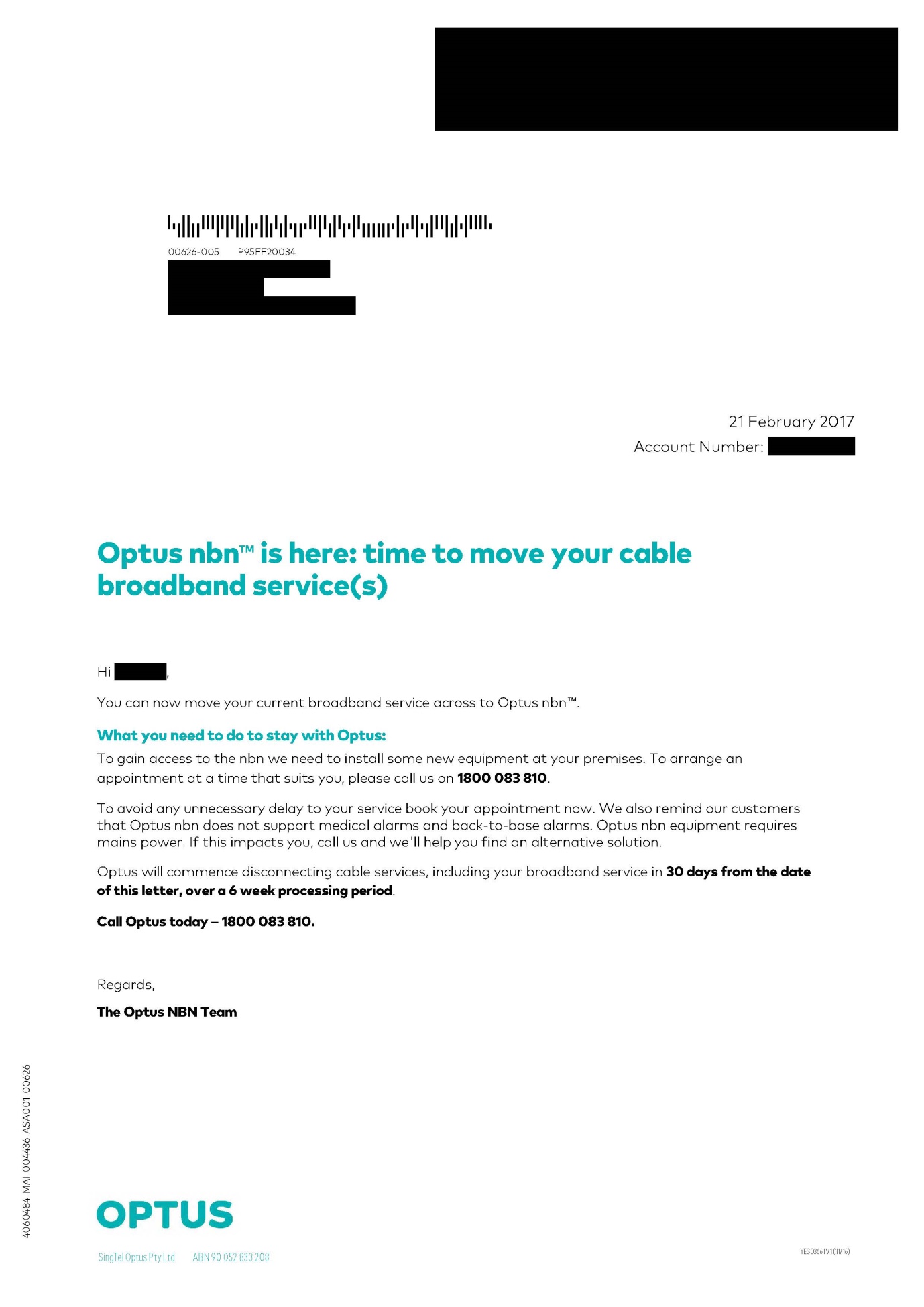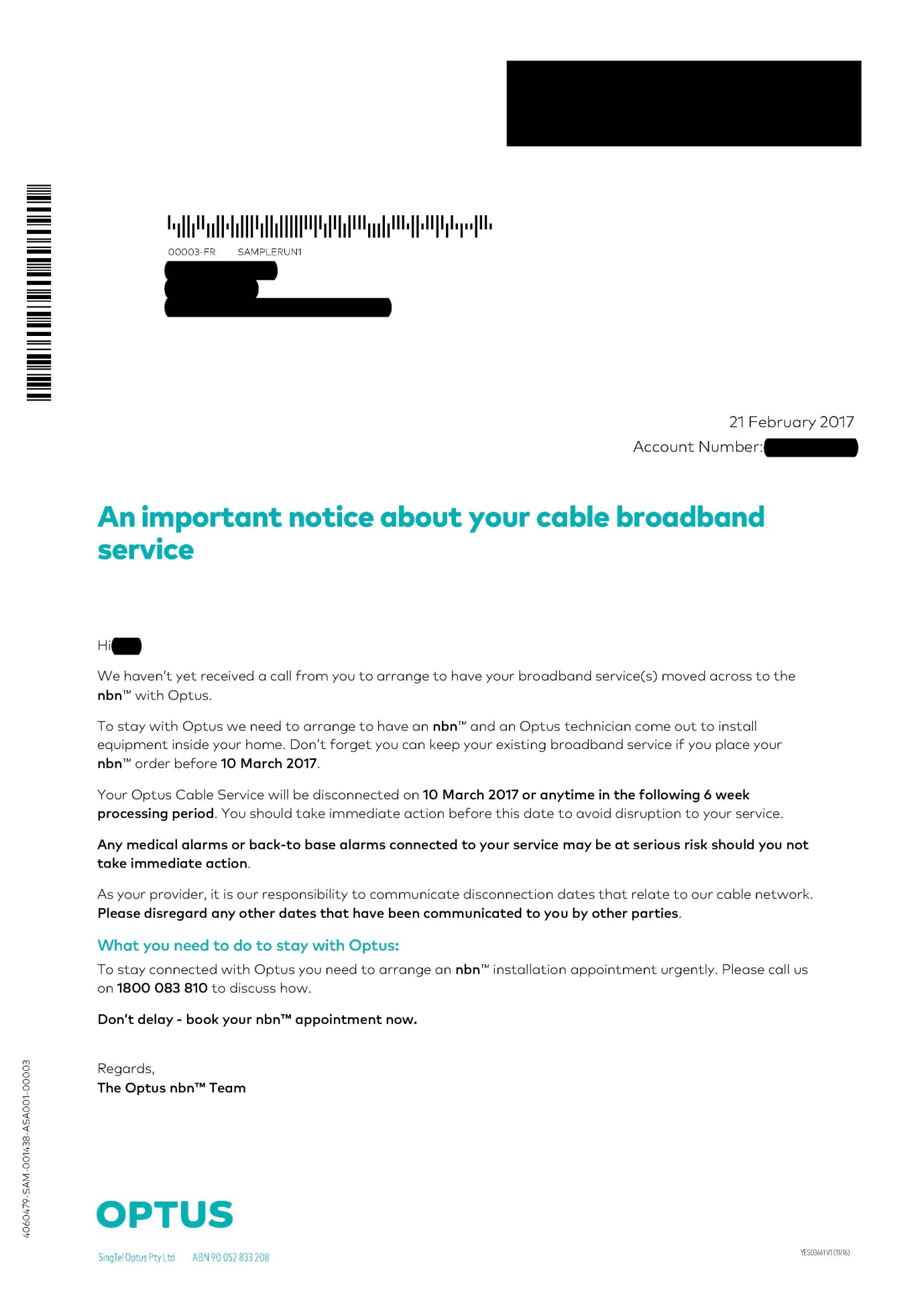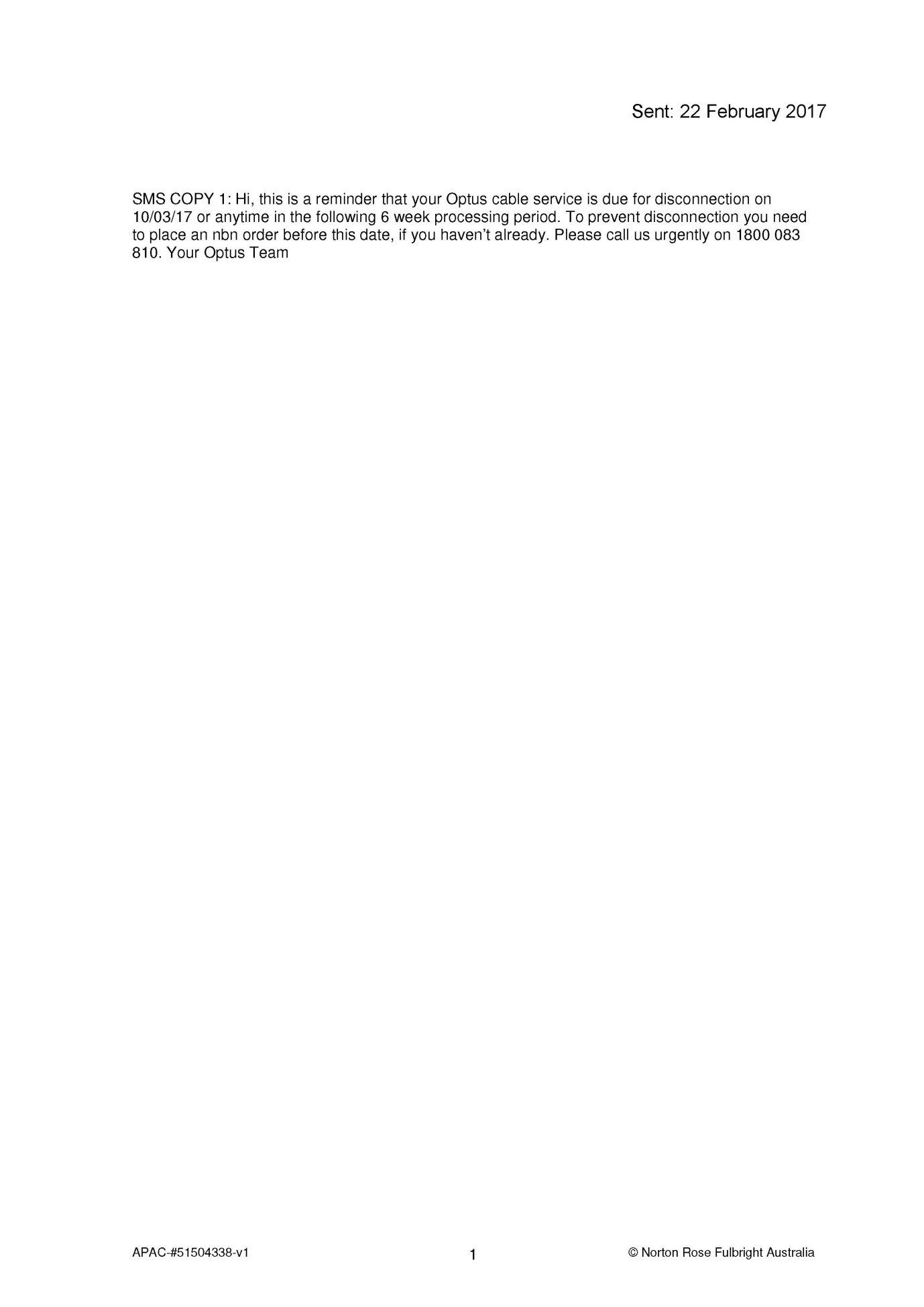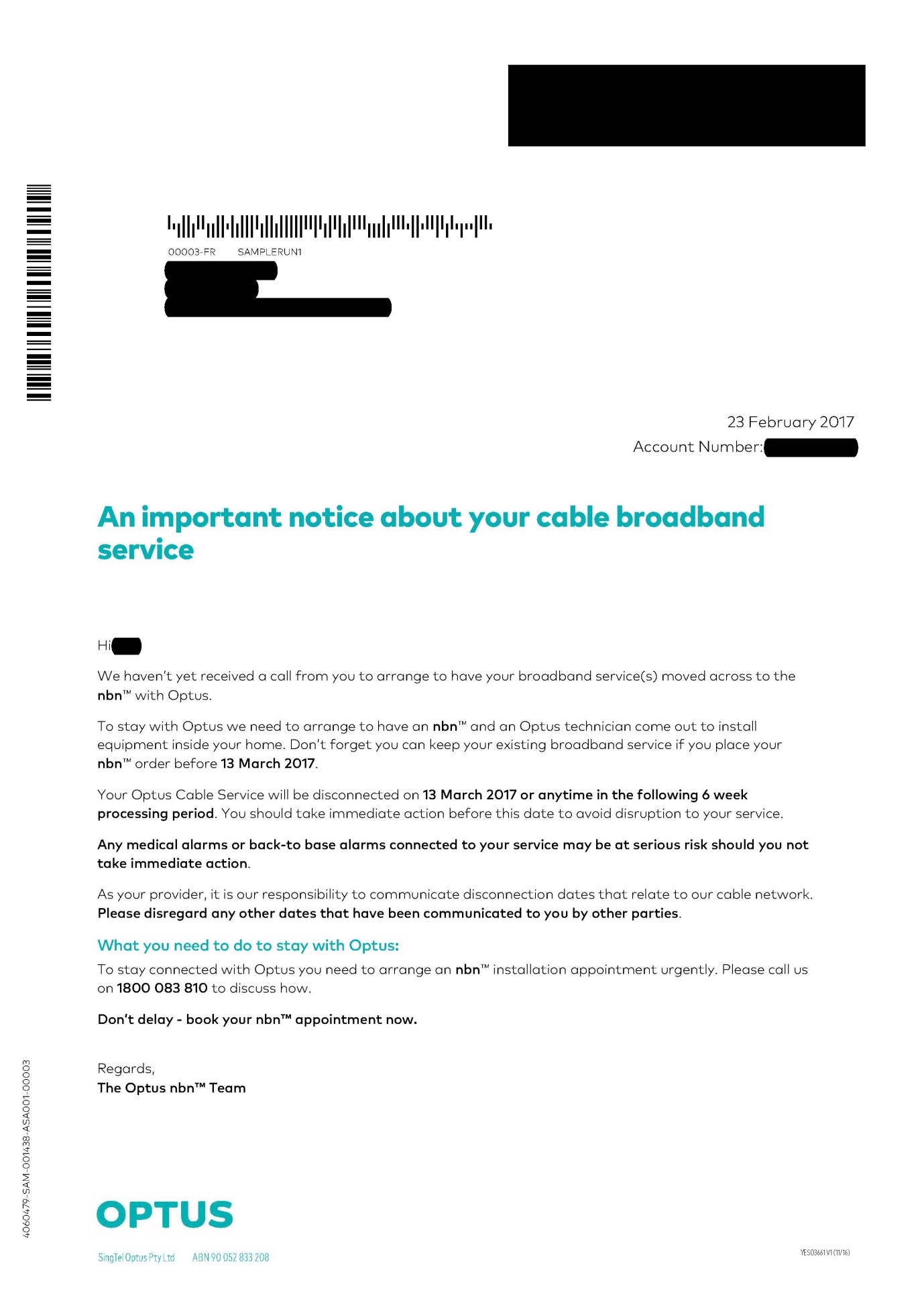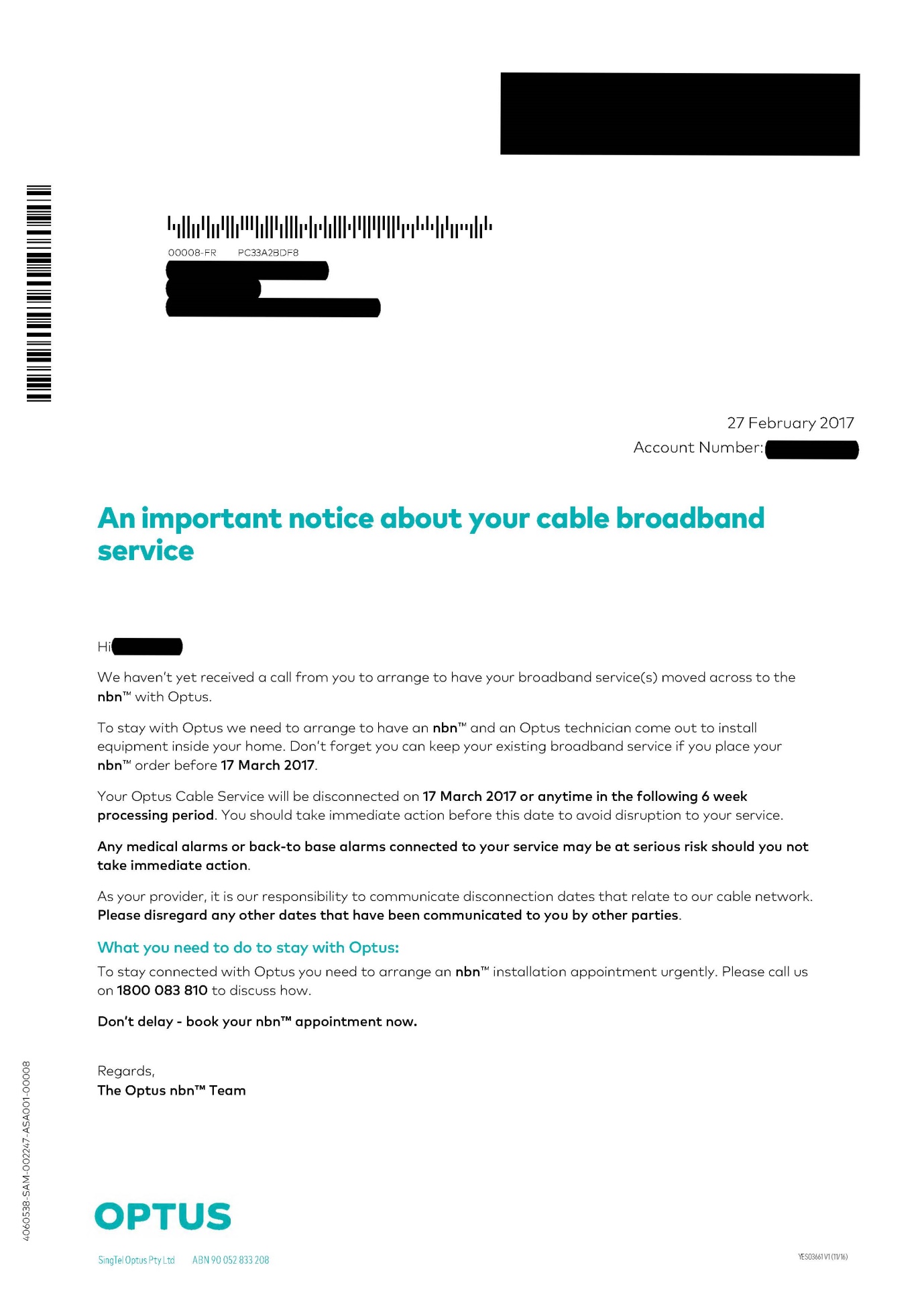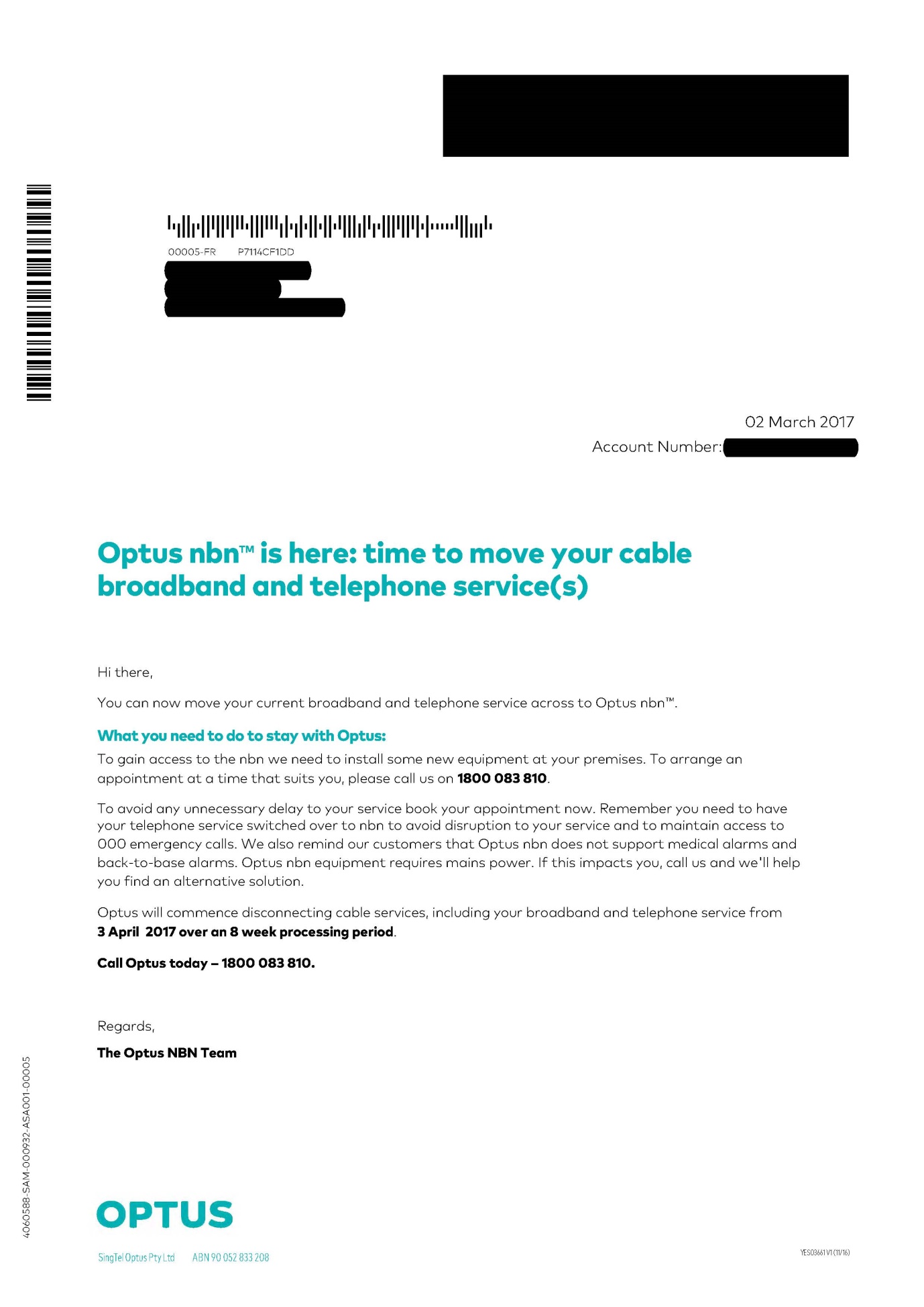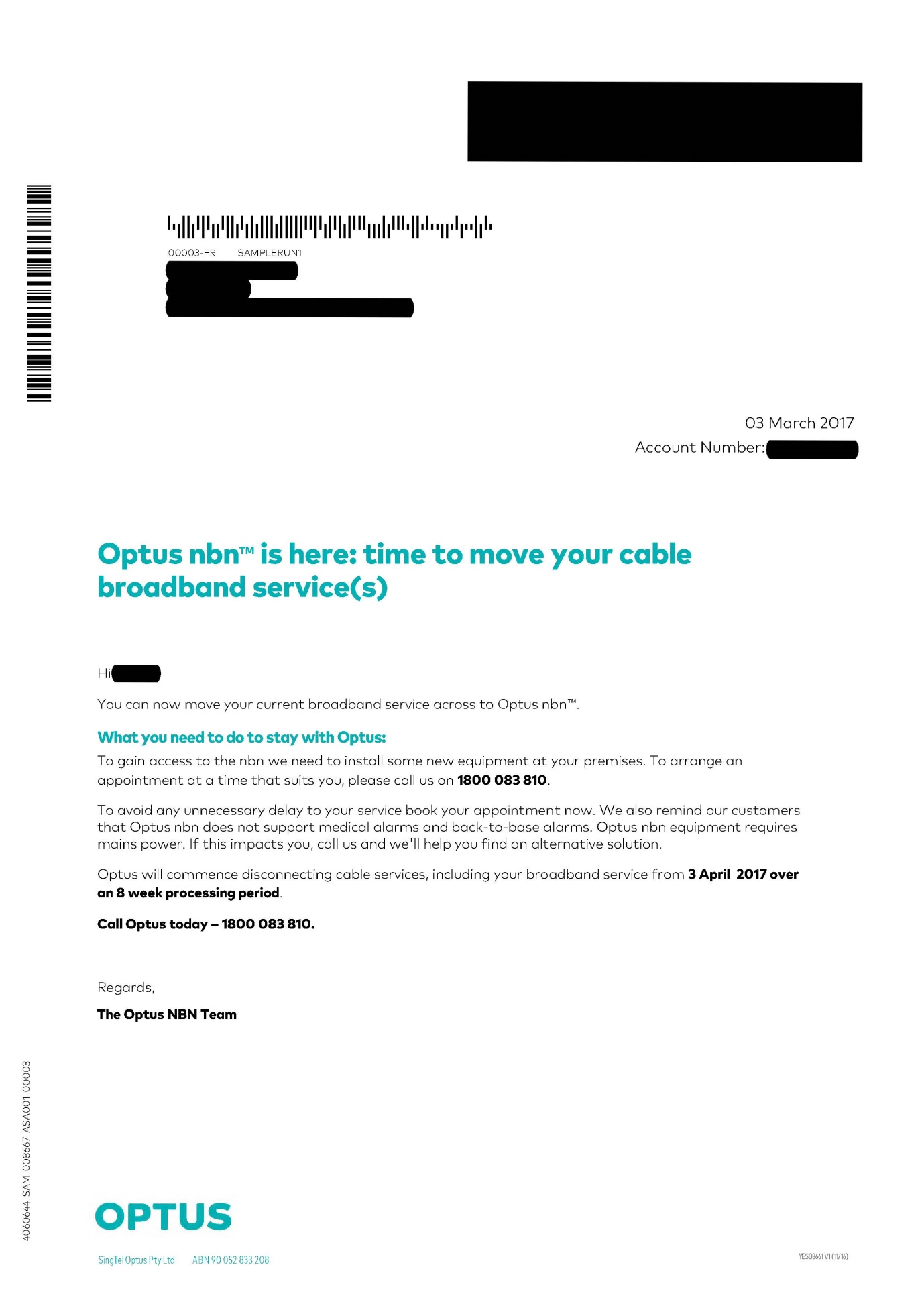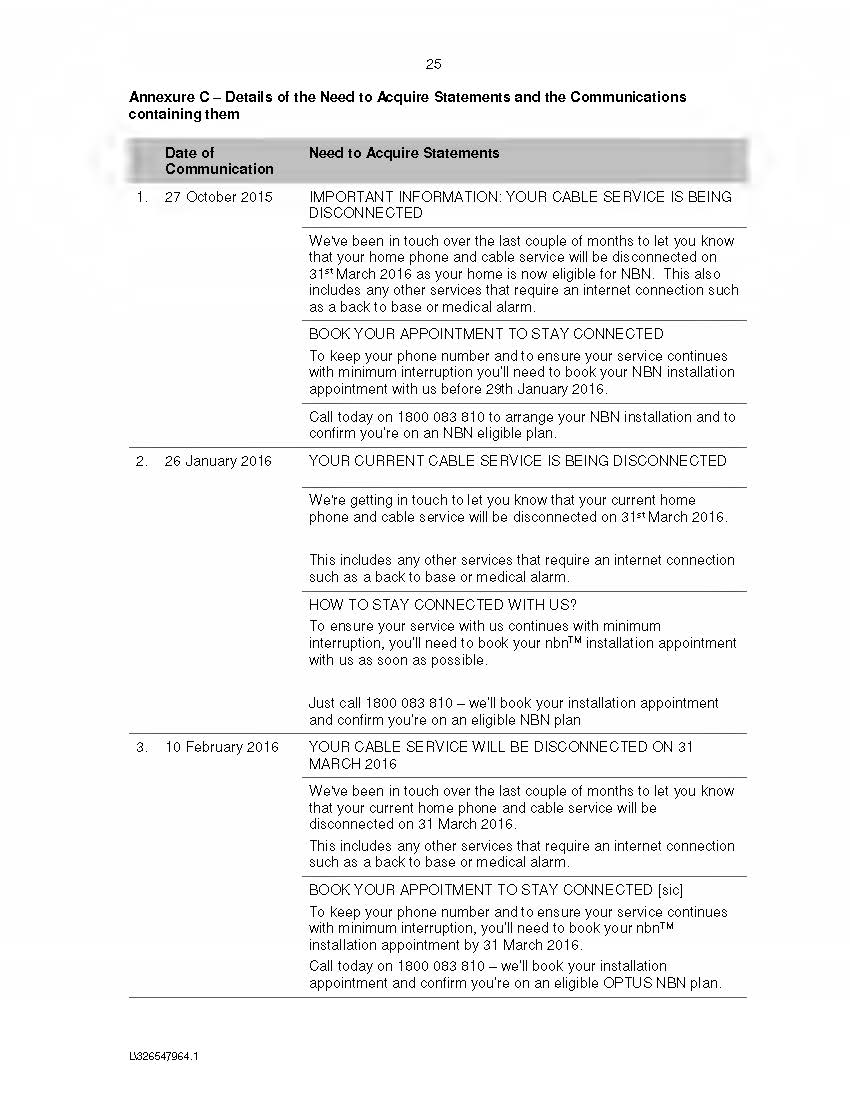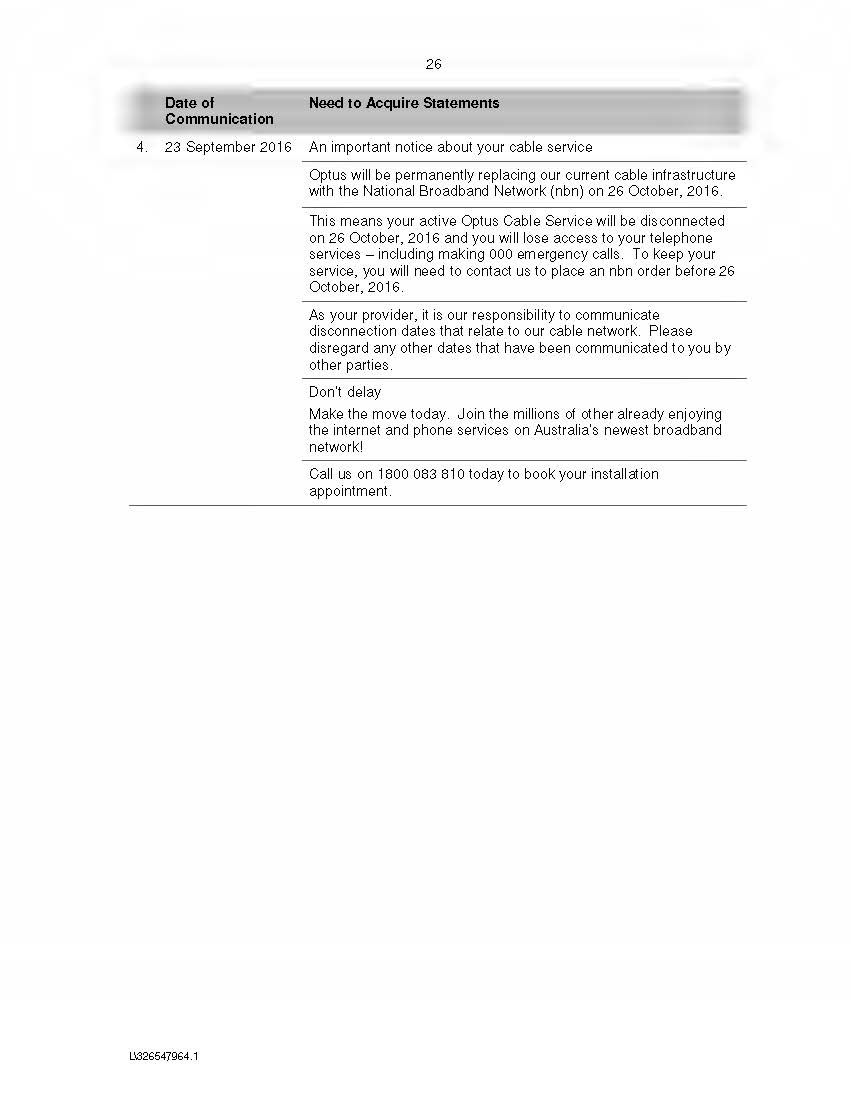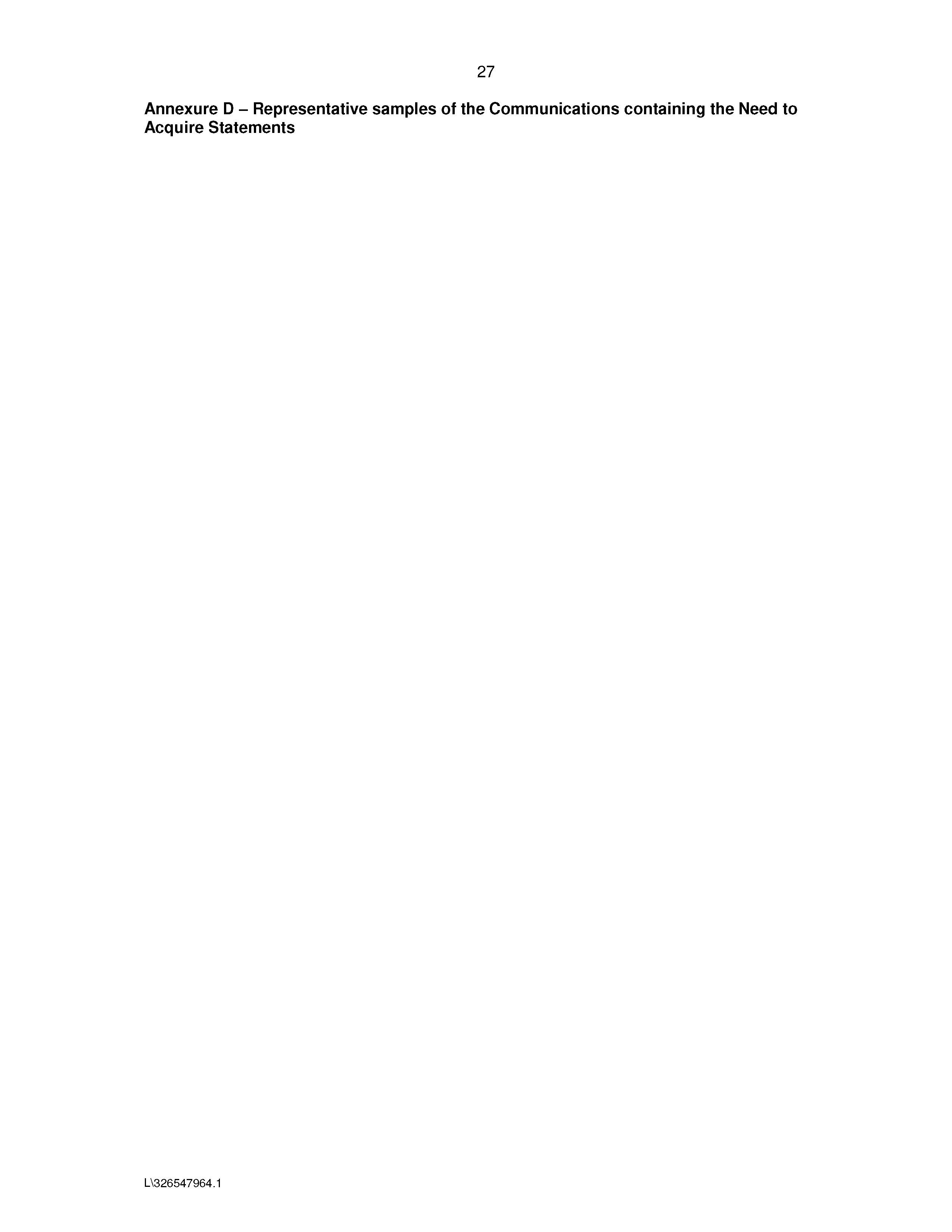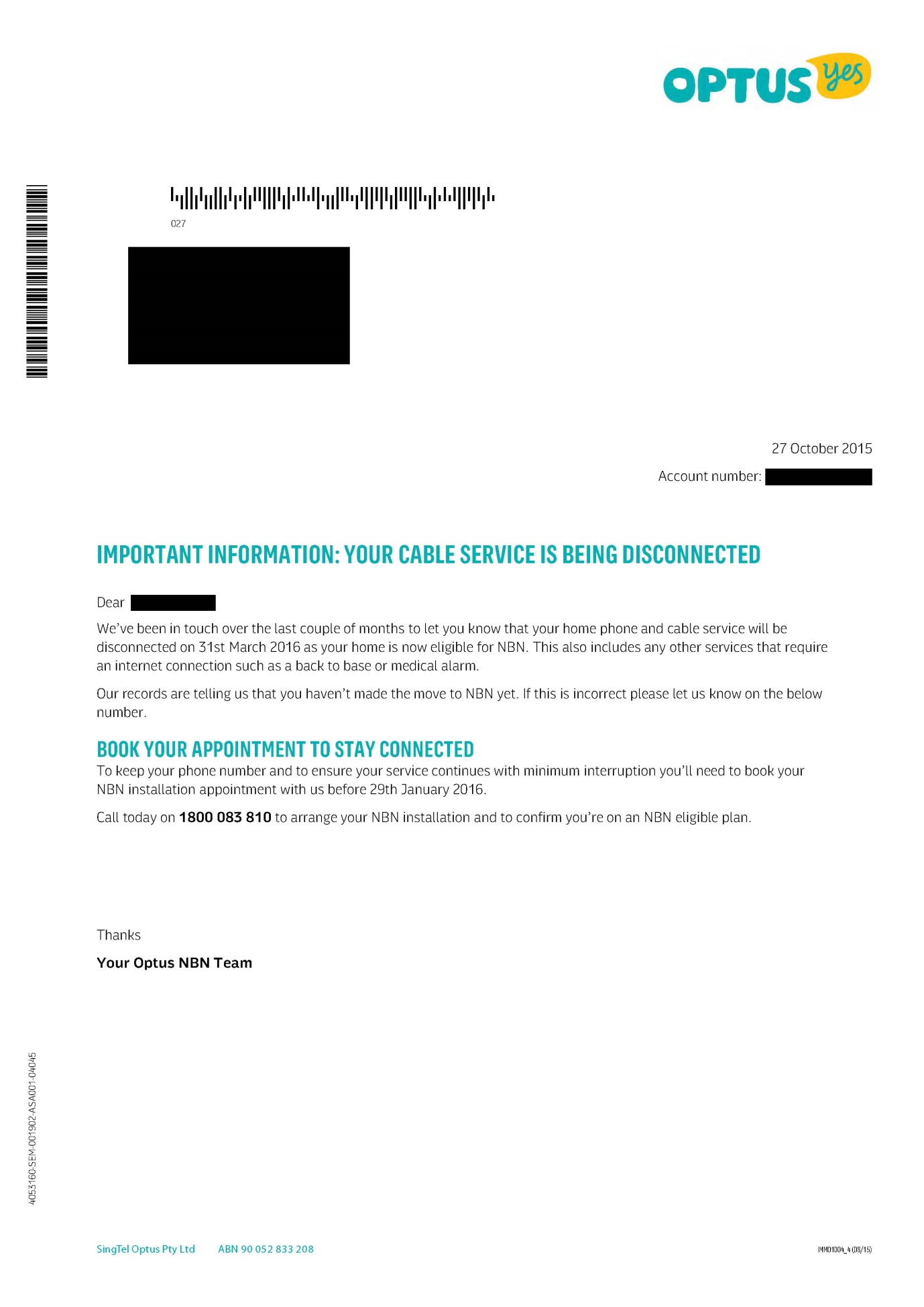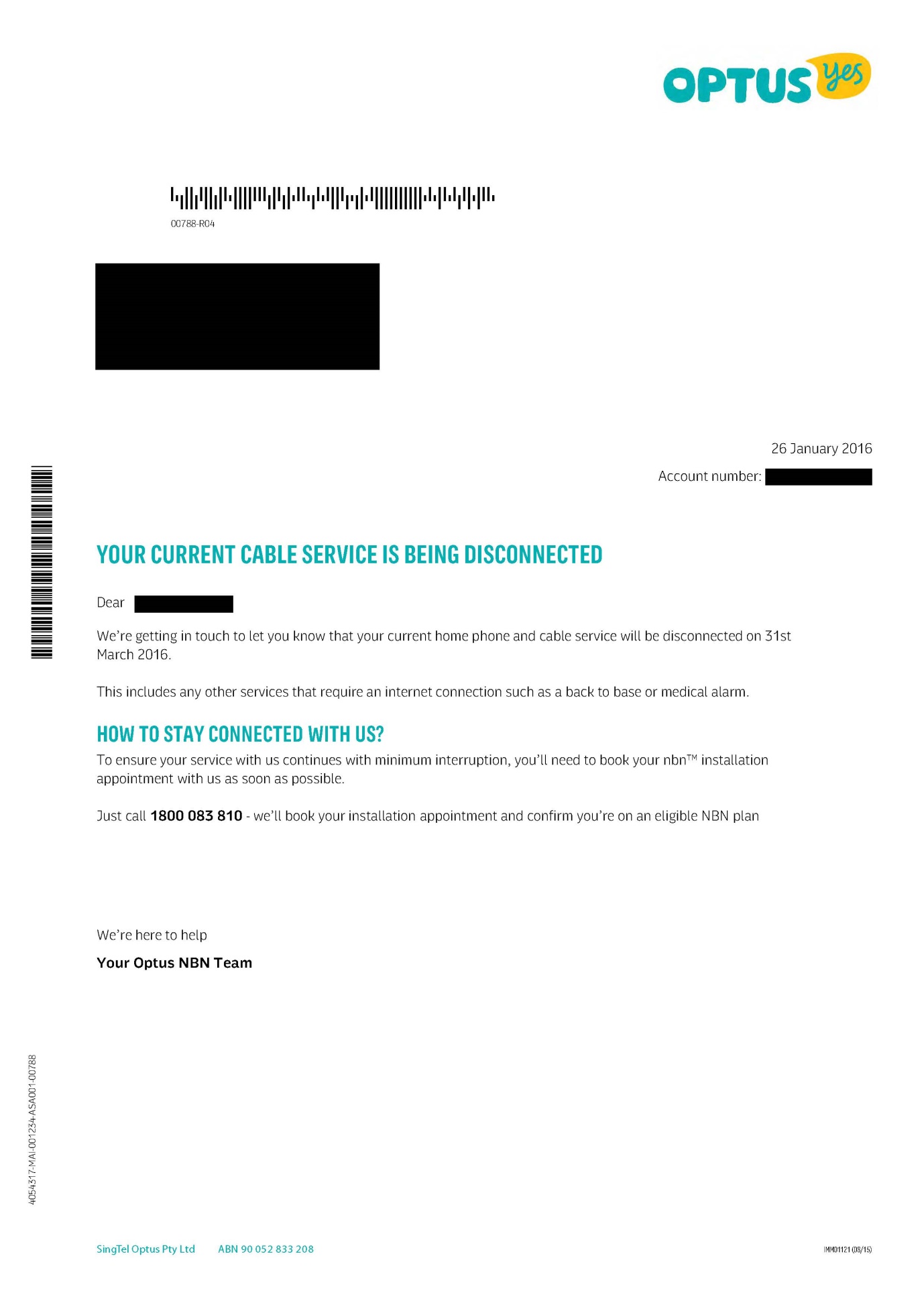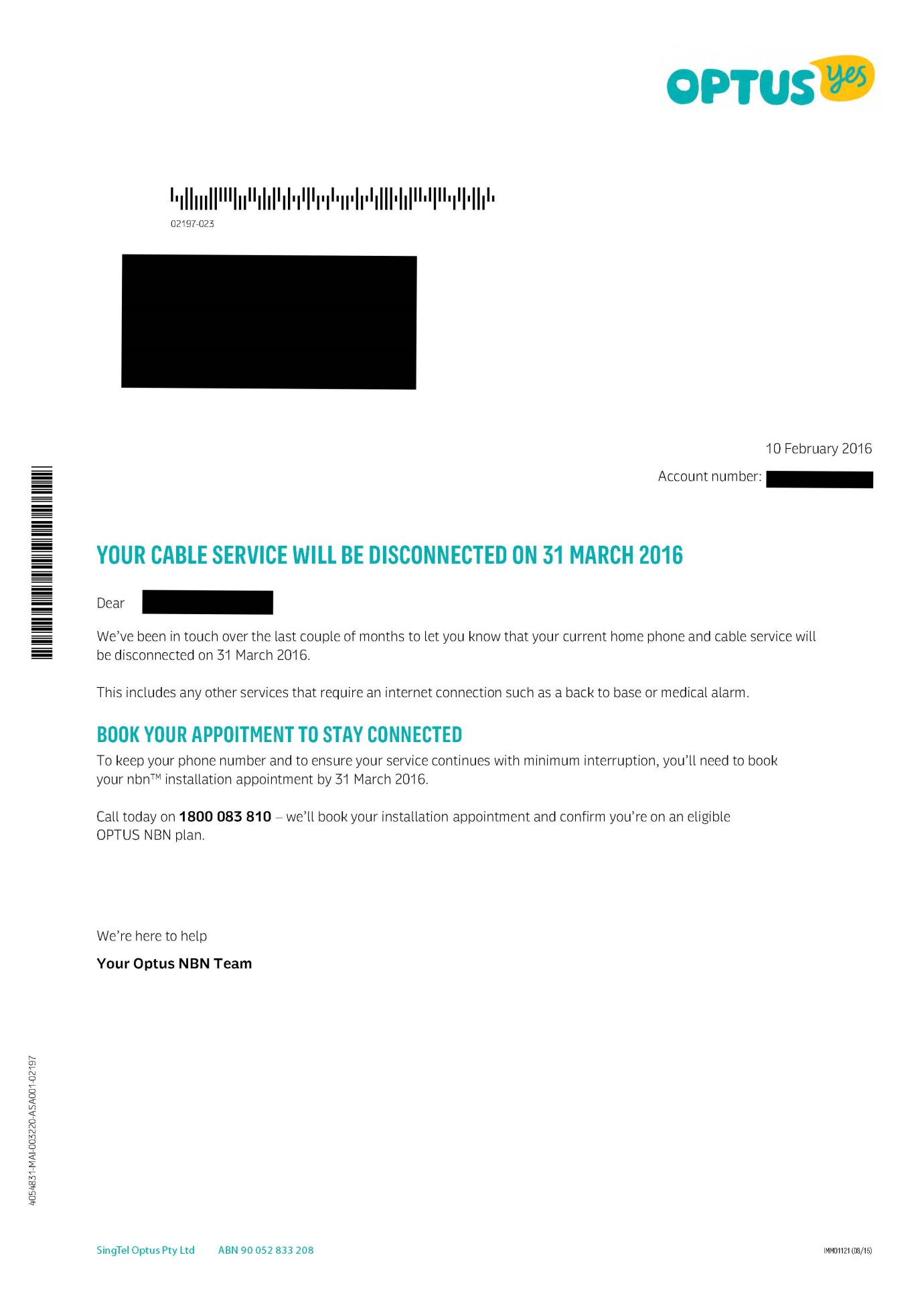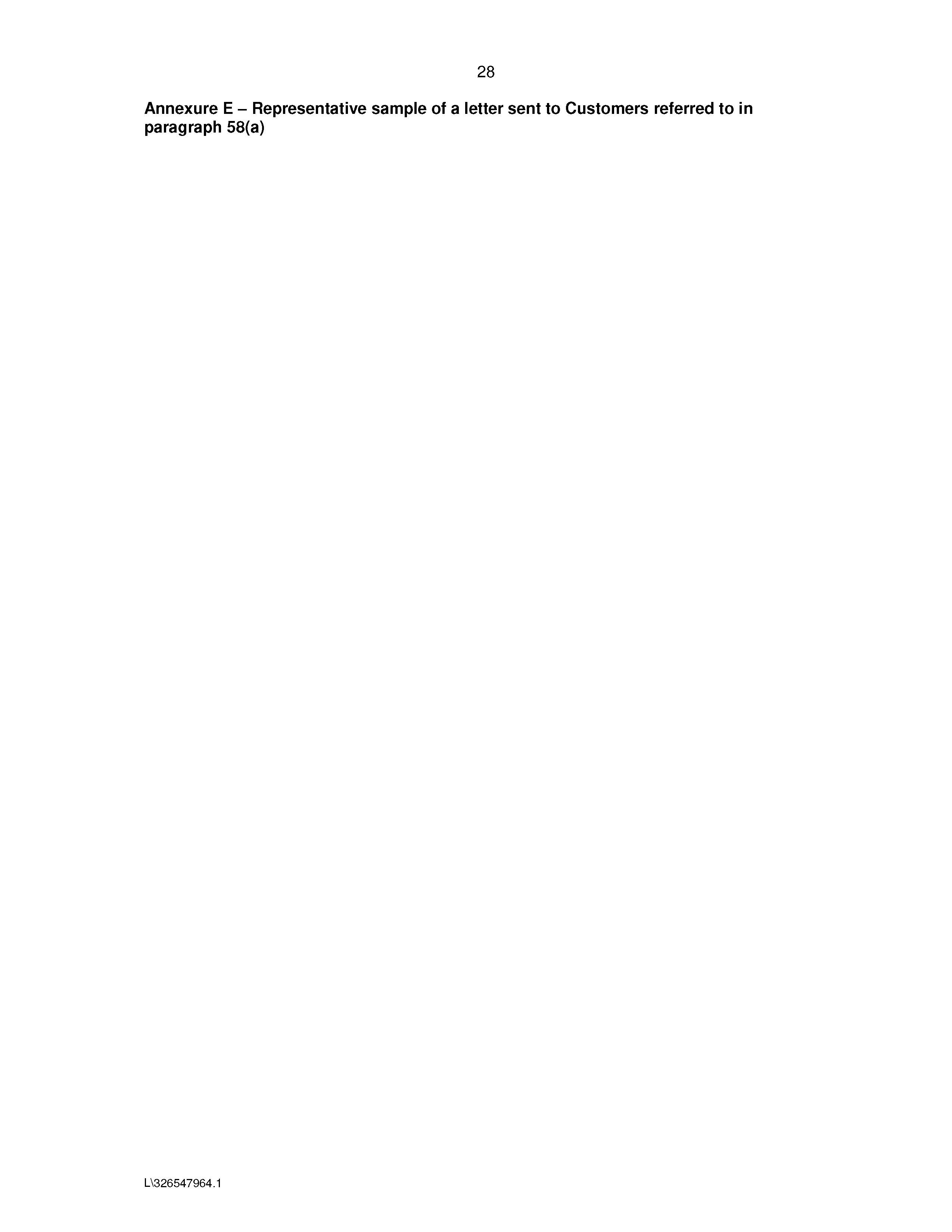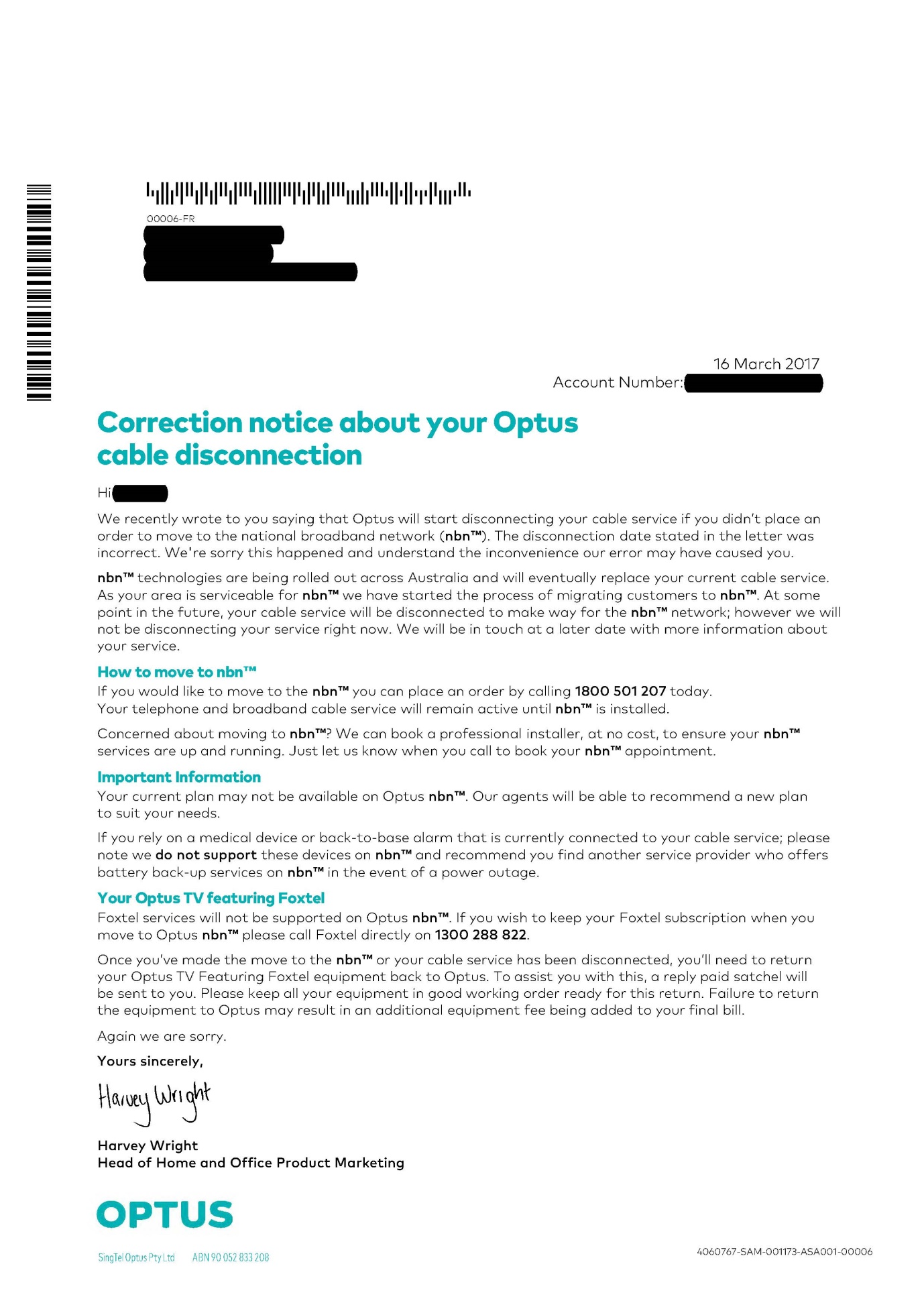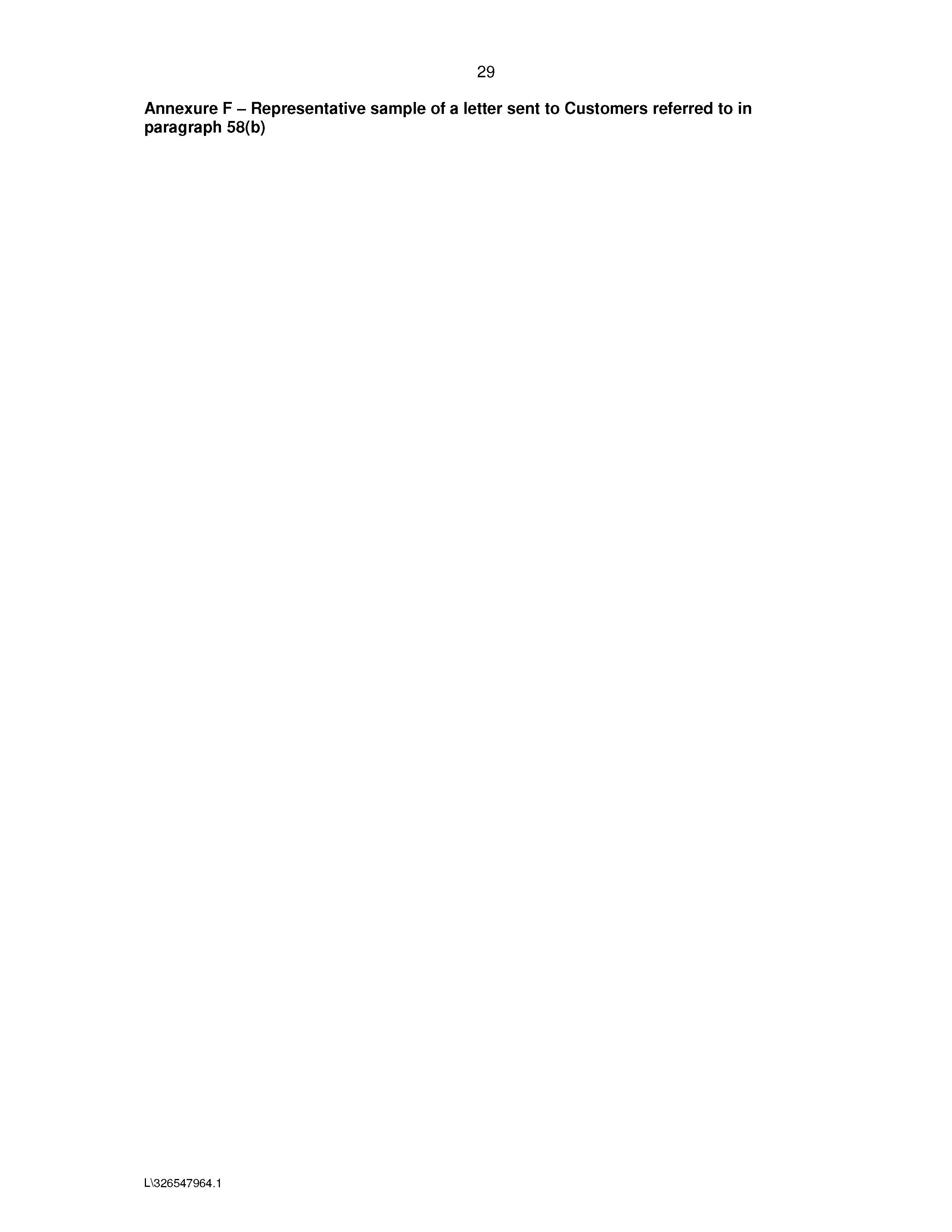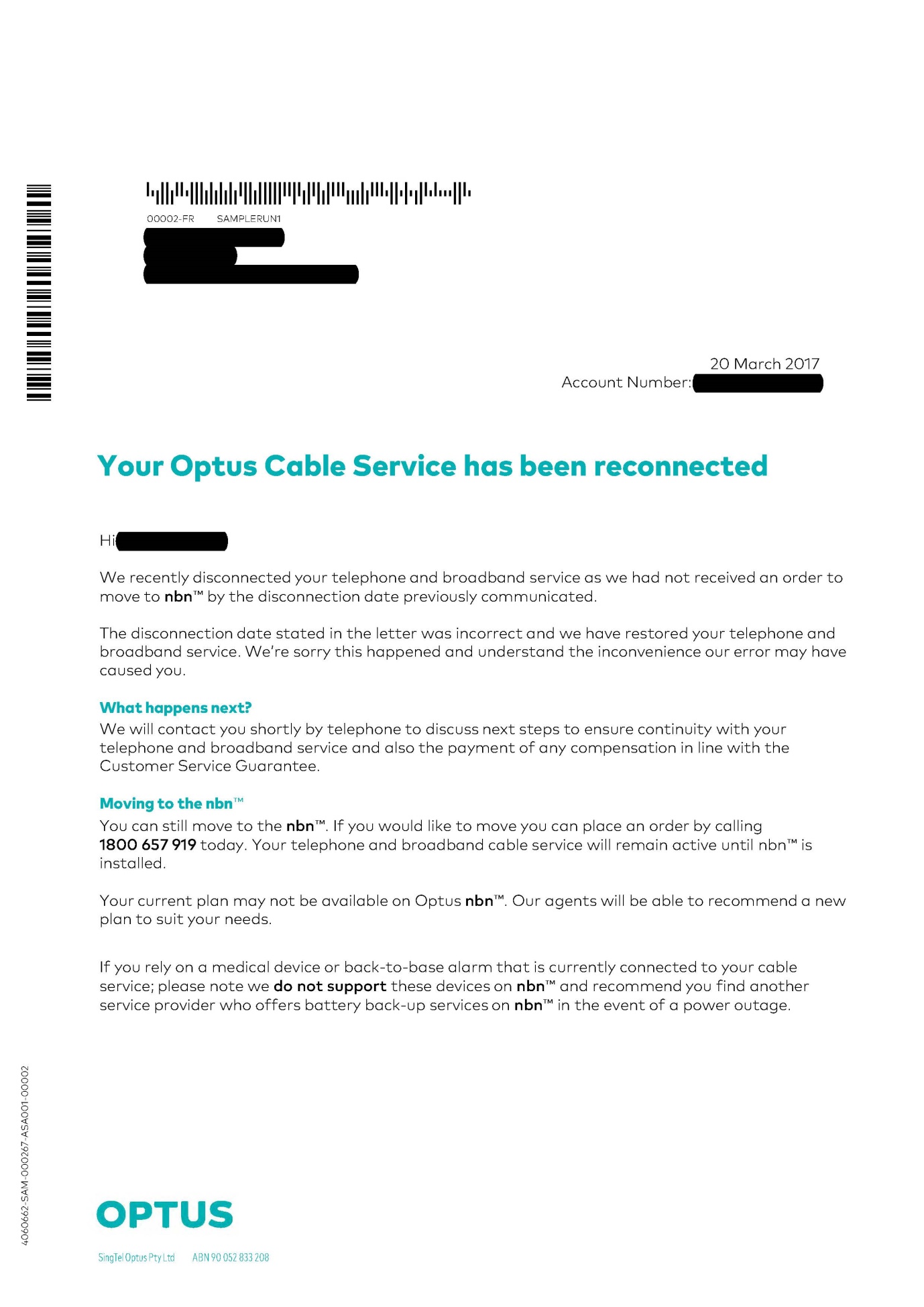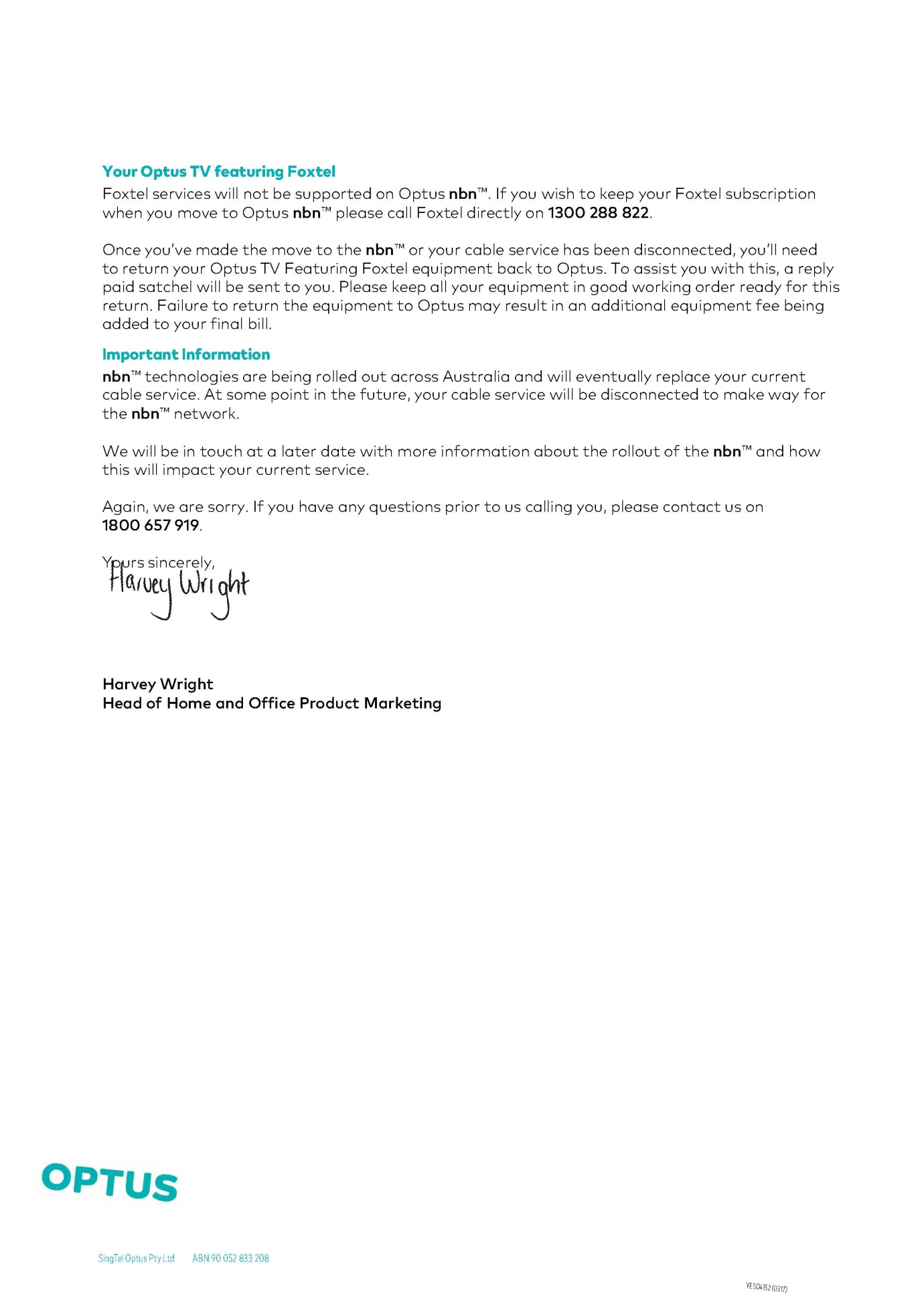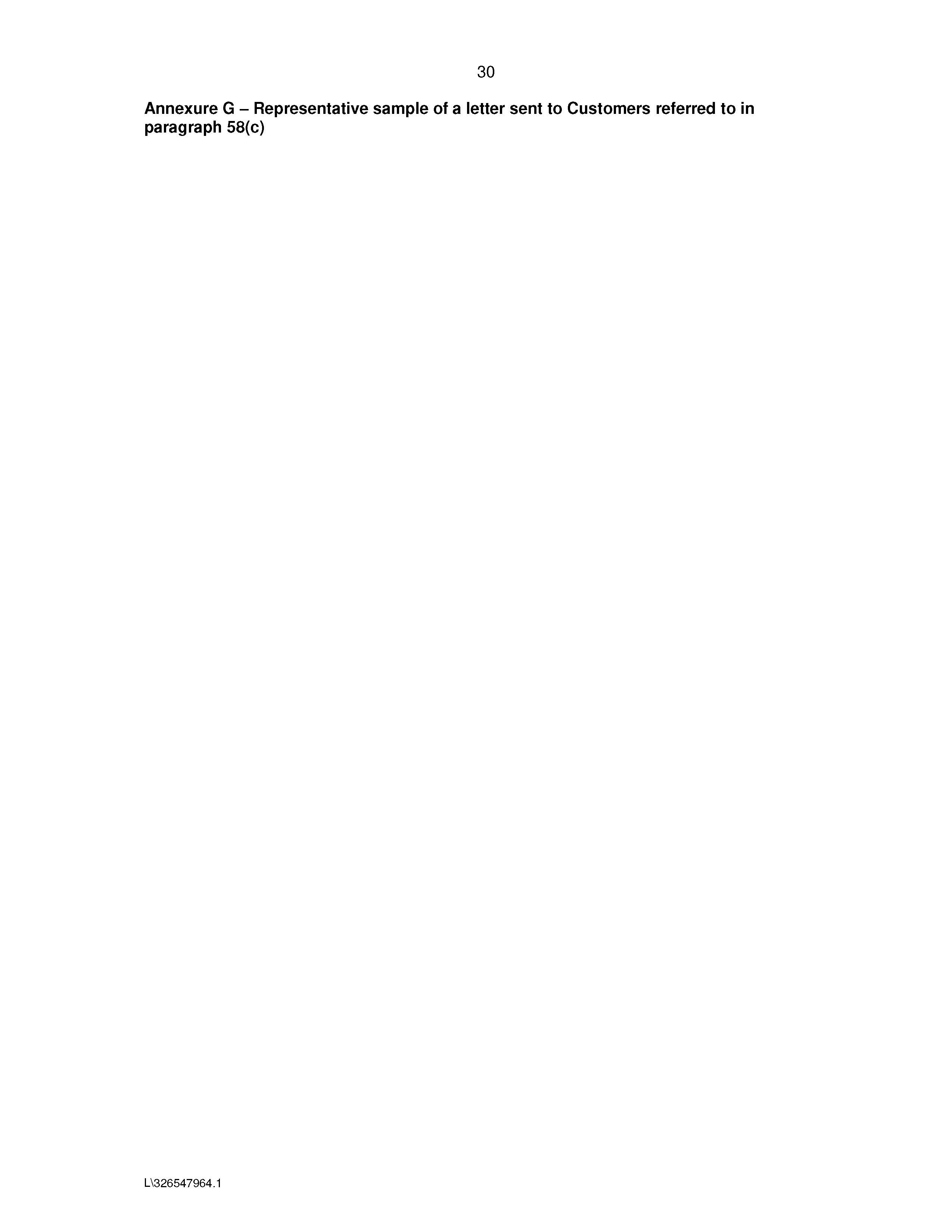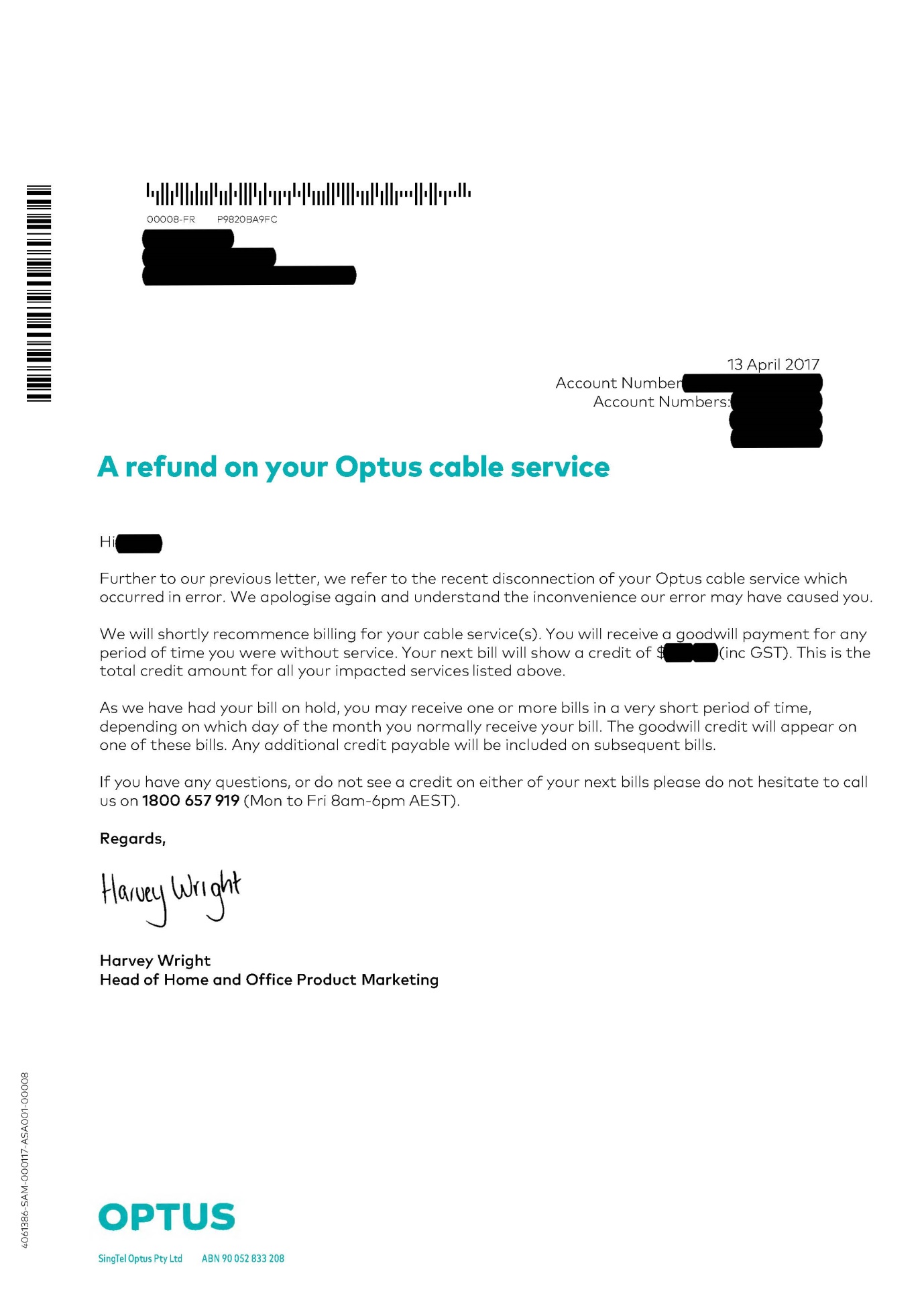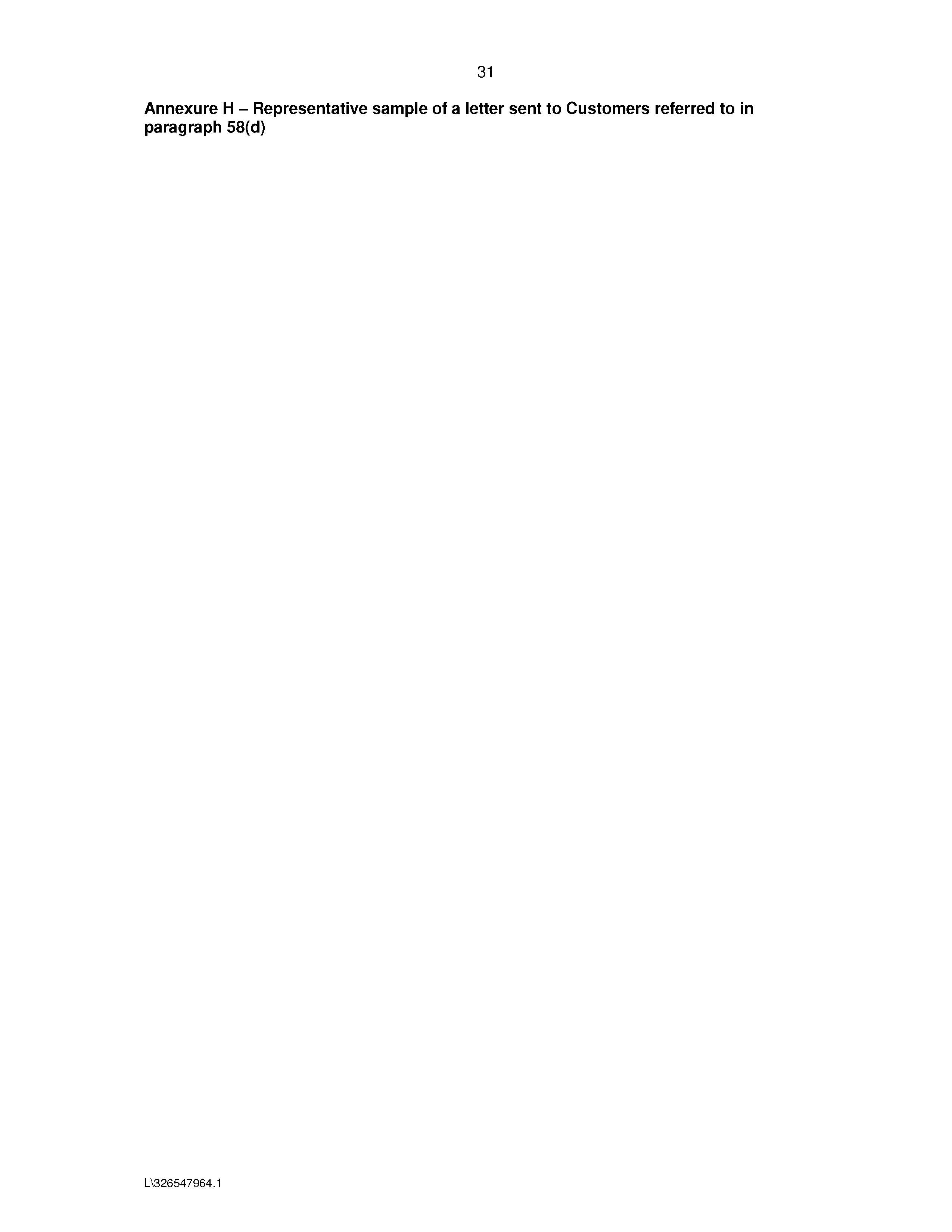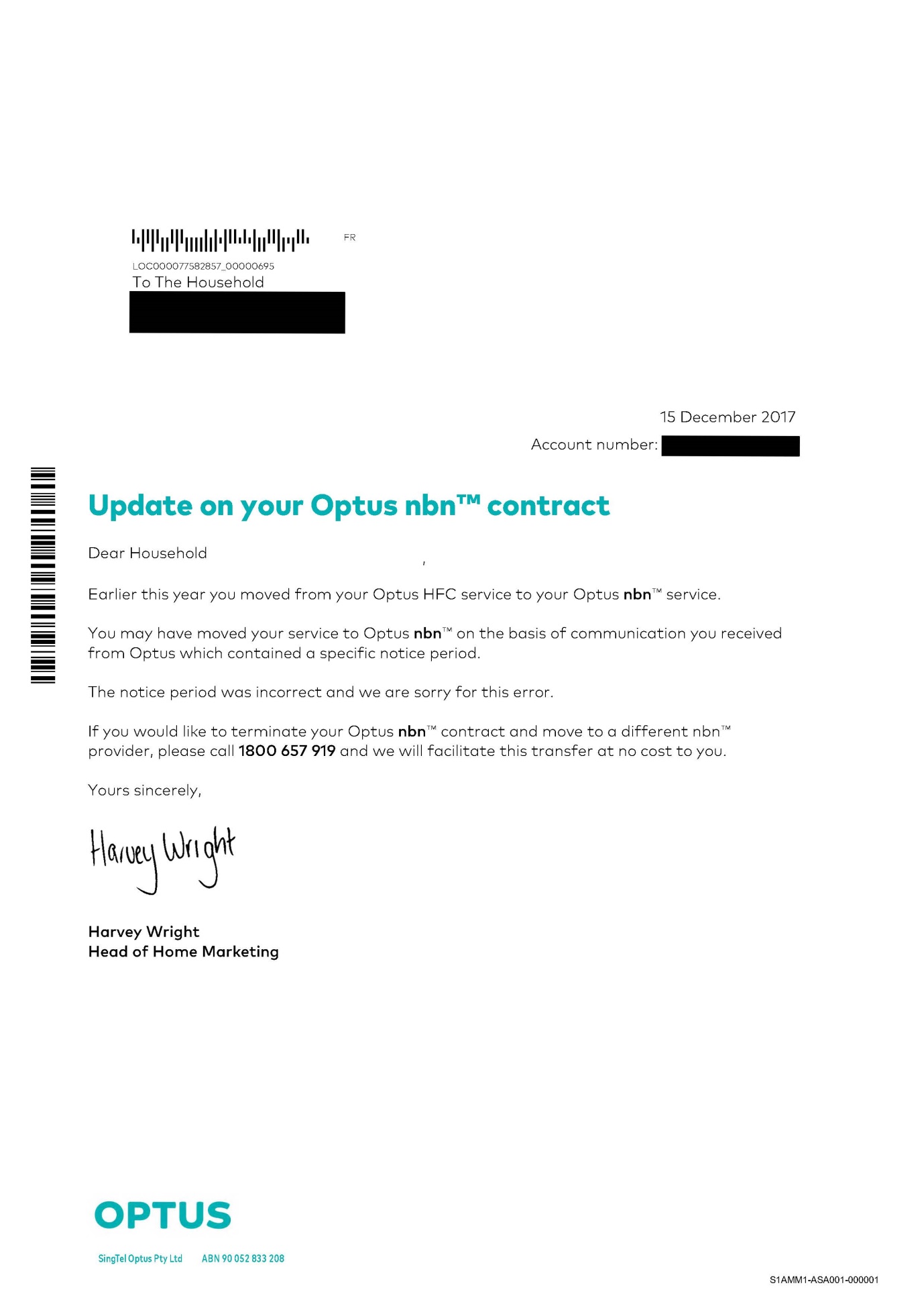FEDERAL COURT OF AUSTRALIA
Australian Competition and Consumer Commission v Optus Internet Pty Limited [2018] FCA 777
ORDERS
AUSTRALIAN COMPETITION AND CONSUMER COMMISSION Applicant | ||
AND: | OPTUS INTERNET PTY LIMITED (ACN 083 164 532) Respondent | |
DATE OF ORDER: |
THE COURT DECLARES THAT:
1. From 27 October 2015 to 3 March 2017, Optus Internet Pty Limited (Optus Internet), in trade or commerce:
(a) engaged in conduct that was misleading or deceptive, or likely to mislead or deceive, in contravention of s 18 of the Australian Consumer Law (ACL), being Sch 2 to the Competition and Consumer Act 2010 (Cth); and
(b) in connection with the supply or possible supply of services, and the promotion of the supply or use of services, made false or misleading representations concerning the existence of any right, in contravention of s 29(1)(m) of the ACL,
by representing to customers to whom Optus Internet supplied one or more of its telephone, internet and television services at 14,649 addresses using its hybrid-fibre coaxial cable network, in letters and short message service messages sent to mobile telephones, that Optus Internet had the right to cancel each customer’s service on a particular date, or within a specific period of time, in circumstances where Optus Internet had no such right.
2. From 27 October 2015 to 23 September 2016, Optus Internet, in trade or commerce:
(a) engaged in conduct that was misleading or deceptive, or likely to mislead or deceive, in contravention of s 18 of the ACL; and
(b) in connection with the supply or possible supply of services, and the promotion of the supply or use of services, made false or misleading representations concerning the need for services, in contravention of s 29(1)(l) of the ACL,
by representing in letters to customers to whom Optus Internet supplied one or more of its telephone, internet and television services at 8,403 addresses using its hybrid-fibre coaxial cable network that the customer would need to acquire services provided using the National Broadband Network (NBN based services) from Optus Internet in order to receive home telephone and/or internet services, in circumstances where they had no such need.
THE COURT ORDERS THAT:
3. Optus Internet is restrained for a period of three years from the date of this order, whether by itself, its servants, its agents or otherwise, in trade or commerce in connection with the supply or possible supply of telephone, internet or television services or the promotion of supply or use of telephone, internet or television services, from making any representation to the effect that:
(a) Optus Internet has a right to cancel a customer’s telephone, internet or television service, when Optus Internet has no such right; or
(b) a customer must acquire NBN based services from Optus Internet in order to receive home telephone and/or internet services, when they have no such requirement.
4. Within 30 days of the date of this order, Optus Internet pay to the Commonwealth of Australia a pecuniary penalty of:
(a) $1 million in respect of the contraventions of s 29(1)(m) of the ACL that are the subject of declaration 1 above; and
(b) $500,000 in respect of the contraventions of s 29(1)(l) of the ACL that are the subject of declaration 2 above.
5. Optus Internet implement an upgraded complaints handling system for consumer law complaints made to Optus Internet that relate to the NBN (NBN Complaints) for a period of three years, which requires Optus Internet to:
(a) identify and categorise any speed, migration, notice period or other NBN Complaints according to the nature of each complaint (including NBN Complaints from customers Optus Internet has encouraged to migrate from alternative services to the NBN);
(b) undertake root cause analysis to isolate the cause(s) of each category of NBN Complaints; and
(c) provide monthly reports in relation to paragraphs (a) and (b) above to the:
(i) Assistant General Counsel, Compliance in Optus Internet’s legal department;
(ii) Managing Director, Digital Consumer; and
(iii) Head of Home and Office Product Marketing, Products and Device Marketing.
6. Within 100 days of the date of this order, Optus Internet serve on the applicant an affidavit verifying that it has carried out its obligations under paragraph 5 above.
7. Within 30 days of the date of this order, Optus Internet pay the applicant $75,000 in respect of the applicant’s costs of the proceeding.
Note: Entry of orders is dealt with in Rule 39.32 of the Federal Court Rules 2011.
MOSHINSKY J:
Introduction
1 The respondent (Optus Internet) is wholly owned by Singtel Optus Pty Limited, which owns a large telecommunications group in Australia that includes Optus Internet and a number of other corporate entities (together, the Optus Group).
2 From 27 October 2015 to 3 March 2017, Optus Internet sent letters and messages (Communications) to certain of its customers, being customers accessing telephone, internet and television services using its hybrid-fibre coaxial cable (HFC) networks at 19,862 addresses. In each case, the supply of these services was governed by an agreement between Optus Internet and the customer. Each Communication contained one or both of the following representations:
(a) that Optus Internet would disconnect the customer’s service on a particular date or during a particular period, implicitly representing that it had the right to cancel the customer’s service or services on the date or within the specific period identified (the Cancellation Representations);
(b) that, as a result of the pending disconnection of the customer’s service, the customer would need to acquire National Broadband Network (NBN) based services from Optus Internet in order to receive home telephone and/or internet services (the Need to Acquire Representations),
(together, the Representations).
3 The applicant (the ACCC) commenced this proceeding in December 2017. By its concise statement, the ACCC alleged that Optus Internet engaged in conduct that contravened ss 18, 29(1)(l) and 29(1)(m) of the Australian Consumer Law, being Sch 2 to the Competition and Consumer Act 2010 (Cth). Section 29(1) relevantly provides as follows:
A person must not, in trade or commerce, in connection with the supply or possible supply of goods or services or in connection with the promotion by any means of the supply or use of goods or services:
…
(l) make a false or misleading representation concerning the need for any goods or services; or
(m) make a false or misleading representation concerning the existence, exclusion or effect of any condition, warranty, guarantee, right or remedy (including a guarantee under Division 1 of Part 3-2) …
4 In summary, the ACCC alleged that:
(a) In relation to the Cancellation Representations, in fact the agreements between Optus Internet and customers at 14,649 addresses to which the Communications were sent did not permit Optus Internet to cancel the customer’s services in the way that was represented. Thus, in making the Cancellation Representations to these customers, Optus Internet contravened s 29(1)(m).
(b) In relation to the Need to Acquire Representations (which were made to customers at 8,403 addresses), in fact the agreements between Optus Internet and its customers left them free to acquire such services from other providers. Thus, in making the Need to Acquire Representations, Optus Internet contravened s 29(1)(l).
5 The ACCC and Optus Internet have reached an agreement regarding the resolution of this proceeding. In summary, Optus Internet has admitted that, in making the Representations, it contravened the relevant provisions of the Australian Consumer Law. The parties jointly propose that the Court impose pecuniary penalties on Optus Internet totalling $1.5 million in respect of the contraventions.
6 The parties have prepared a statement of agreed facts and admissions (SOAF), a copy of which appears as a schedule to these reasons. The SOAF includes the following admissions, which are made for the purposes of this proceeding only:
(a) Optus Internet admits that, by making the Cancellation Representations and the Need to Acquire Representations, Optus Internet engaged in conduct in trade or commerce that was misleading or deceptive, or likely to mislead or deceive, in contravention of s 18 of the Australian Consumer Law.
(b) Optus Internet admits that, by making the Cancellation Representations, Optus Internet made false or misleading representations that it had the right to cancel customers’ services on the dates or within the timeframes specified, in contravention of s 29(1)(m).
(c) Optus Internet admits that, by making the Need to Acquire Representations, Optus Internet made false or misleading representations that customers needed to acquire NBN based services from Optus Internet in order to receive home telephone and/or internet services, in contravention of section 29(1)(l).
7 The parties have provided an agreed minute of proposed orders and a joint submission on contraventions and relief. The proposed declarations are as follows:
1. From 27 October 2015 to 3 March 2017, Optus Internet Pty Limited (Optus Internet), in trade or commerce:
(a) engaged in conduct that was misleading or deceptive, or likely to mislead or deceive, in contravention of s 18 of the Australian Consumer Law (ACL), being Sch 2 to the Competition and Consumer Act 2010 (Cth) (CCA); and
(b) in connection with the supply or possible supply of services, and the promotion of the supply or use of services, made false or misleading representations concerning the existence of any right, in contravention of s 29(1)(m) of the ACL,
by representing to customers to whom Optus Internet supplied one or more of its telephone, internet and television services at 14,649 addresses using its hybrid-fibre coaxial cable network, in letters and short message service messages sent to mobile telephones, that Optus Internet had the right to cancel each customer’s service on a particular date, or within a specific period of time, in circumstances where Optus Internet had no such right.
2. From 27 October 2015 to 23 September 2016, Optus Internet, in trade or commerce:
(a) engaged in conduct that was misleading or deceptive, or likely to mislead or deceive, in contravention of s 18 of the ACL; and
(b) in connection with the supply or possible supply of services, and the promotion of the supply or use of services, made false or misleading representations concerning the need for services, in contravention of s 29(1)(l) of the ACL,
by representing in letters to customers to whom Optus Internet supplied one or more of its telephone, internet and television services at 8,403 addresses using its hybrid-fibre coaxial cable network that the customer would need to acquire services provided using the National Broadband Network (NBN based services) from Optus Internet in order to receive home telephone and/or internet services, in circumstances where they had no such need.
8 The proposed orders include an injunction, pecuniary penalties, a compliance program, and a costs order. The proposed orders are as follows:
3. Optus Internet is restrained for a period of three years from the date of this order, whether by itself, its servants, its agents or otherwise, in trade or commerce in connection with the supply or possible supply of telephone, internet or television services or the promotion of supply or use of telephone, internet or television services, from making any representation to the effect that:
(a) Optus Internet has a right to cancel a customer’s telephone, internet or television service, when Optus Internet has no such right; or
(b) a customer must acquire NBN based services from Optus Internet in order to receive home telephone and/or internet services, when they have no such requirement.
4. Within 30 days of the date of this order, Optus Internet pay to the Commonwealth of Australia a pecuniary penalty of:
(a) $1 million in respect of the contraventions of s 29(1)(m) of the ACL that are the subject of declaration 1 above; and
(b) $500,000 in respect of the contraventions of s 29(1)(l) of the ACL that are the subject of declaration 2 above.
5. Optus Internet implement an upgraded complaints handling system for consumer law complaints made to Optus Internet that relate to the NBN (NBN Complaints) for a period of three years, which requires Optus Internet to:
(a) identify and categorise any speed, migration, notice period or other NBN Complaints according to the nature of each complaint (including NBN Complaints from customers Optus Internet has encouraged to migrate from alternative services to the NBN);
(b) undertake root cause analysis to isolate the cause(s) of each category of NBN Complaints; and
(c) provide monthly reports in relation to paragraphs (a) and (b) above to the:
(i) Assistant General Counsel, Compliance in Optus Internet’s legal department;
(ii) Managing Director, Digital Consumer; and
(iii) Head of Home and Office Product Marketing, Products and Device Marketing.
6. Within 100 days of the date of this order, Optus Internet serve on the applicant an affidavit verifying that it has carried out its obligations under paragraph 5 above.
7. Within 30 days of the date of this order, Optus Internet pay the applicant $75,000 in respect of the applicant’s costs of the proceeding.
9 At the hearing, the parties made oral submissions in support of the proposed declarations and orders.
10 For the reasons that follow, I consider there to be a proper basis for making the proposed declarations. I also consider the proposed penalties to be appropriate penalties and will make an order that Optus Internet pay: $1 million in respect of the contraventions of 29(1)(m) that are the subject of the first declaration; and $500,000 in respect of the contraventions of s 29(1)(l) that are the subject of the second declaration. These penalties reflect the circumstances of the contraventions and should operate as a deterrent against such conduct being engaged in by Optus Internet or other companies in the future.
11 I also consider it appropriate to impose the injunction and to make the other orders proposed by the parties.
Applicable principles
Making of orders by agreement and declarations
12 The applicable principles as regards the making of orders by agreement and as regards declarations were summarised by Gordon J in Australian Competition and Consumer Commission v Coles Supermarkets Australia Pty Ltd [2014] FCA 1405 at [70]-[79] as follows:
2.3.1 Orders sought by agreement
…
70 The applicable principles are well established. First, there is a well-recognised public interest in the settlement of cases under the [Competition and Consumer Act]: NW Frozen Foods Pty Ltd v Australian Competition & Consumer Commission (1996) 71 FCR 285 at 291. Second, the orders proposed by agreement of the parties must be not contrary to the public interest and at least consistent with it: Australian Competition & Consumer Commission v Real Estate Institute of Western Australia Inc (1999) 161 ALR 79 at [18].
71 Third, when deciding whether to make orders that are consented to by the parties, the Court must be satisfied that it has the power to make the orders proposed and that the orders are appropriate: Real Estate Institute at [17] and [20] and Australian Competition & Consumer Commission v Virgin Mobile Australia Pty Ltd (No 2) [2002] FCA 1548 at [1]. Parties cannot by consent confer power to make orders that the Court otherwise lacks the power to make: Thomson Australian Holdings Pty Ltd v Trade Practices Commission (1981) 148 CLR 150 at 163.
72 Fourth, once the Court is satisfied that orders are within power and appropriate, it should exercise a degree of restraint when scrutinising the proposed settlement terms, particularly where both parties are legally represented and able to understand and evaluate the desirability of the settlement: Australian Competition & Consumer Commission v Woolworths (South Australia) Pty Ltd (Trading as Mac’s Liquor) [2003] FCA 530 at [21]; Australian Competition & Consumer Commission v Target Australia Pty Ltd [2001] FCA 1326 at [24]; Real Estate Institute at [20]-[21]; Australian Competition & Consumer Commission v Econovite Pty Ltd [2003] FCA 964 at [11] and [22] and Australian Competition & Consumer Commission v The Construction, Forestry, Mining and Energy Union [2007] FCA 1370 at [4].
73 Finally, in deciding whether agreed orders conform with legal principle, the Court is entitled to treat the consent of Coles as an admission of all facts necessary or appropriate to the granting of the relief sought against it: Thomson Australian Holdings at 164.
2.3.2 Declarations
74 The Court has a wide discretionary power to make declarations under s 21 of the Federal Court Act: Forster v Jododex Australia Pty Ltd (1972) 127 CLR 421 at 437-8; Ainsworth v Criminal Justice Commission (1992) 175 CLR 564 at 581-2 and Tobacco Institute of Australia Ltd v Australian Federation of Consumer Organisations Inc (No 2) (1993) 41 FCR 89 at 99.
75 Where a declaration is sought with the consent of the parties, the Court’s discretion is not supplanted, but nor will the Court refuse to give effect to terms of settlement by refusing to make orders where they are within the Court’s jurisdiction and are otherwise unobjectionable: see, for example, Econovite at [11].
76 However, before making declarations, three requirements should be satisfied:
(1) The question must be a real and not a hypothetical or theoretical one;
(2) The applicant must have a real interest in raising it; and
(3) There must be a proper contradictor:
Forster v Jododex at 437-8.
77 In this proceeding, these requirements are satisfied. The proposed declarations relate to conduct that contravenes the ACL and the matters in issue have been identified and particularised by the parties with precision: Australian Competition & Consumer Commission v MSY Technology Pty Ltd (2012) 201 FCR 378 at [35]. The proposed declarations contain sufficient indication of how and why the relevant conduct is a contravention of the ACL: BMW Australia Ltd v Australian Competition & Consumer Commission [2004] FCAFC 167 at [35].
78 It is in the public interest for the ACCC to seek to have the declarations made and for the declarations to be made (see the factors outlined in ACCC v CFMEU at [6]). There is a significant legal controversy in this case which is being resolved. The ACCC, as a public regulator under the ACL, has a genuine interest in seeking the declaratory relief and Coles is a proper contradictor because it has contravened the ACL and is the subject of the declarations. Coles has an interest in opposing the making of them: MSY Technology at [30]. No less importantly, the declarations sought are appropriate because they serve to record the Court’s disapproval of the contravening conduct, vindicate the ACCC’s claim that Coles contravened the ACL, assist the ACCC to carry out the duties conferred upon it by the Act (including the ACL) in relation to other similar conduct, inform the public of the harm arising from Coles’ contravening conduct and deter other corporations from contravening the ACL.
79 Finally, the facts and admissions in Annexure 1 provide a sufficient factual foundation for the making of the declarations: s 191 of the Evidence Act; Australian Competition & Consumer Commission v Dataline.Net.Au Pty Ltd (2006) 236 ALR 665 at [57]-[59] endorsed by the Full Court in Australian Competition & Consumer Commission v Dataline.Net.Au Pty Ltd (2007) 161 FCR 513 at [92]; Hadgkiss v Aldin (No 2) [2007] FCA 2069 at [21]–[22]; Secretary, Department of Health & Ageing v Pagasa Australia Pty Ltd [2008] FCA 1545 at [77]-[79] and Ponzio v B & P Caelli Constructions Pty Ltd (2007) 158 FCR 543.
Pecuniary penalties
13 Section 224(1) of the Australian Consumer Law provides for the Court’s power to impose a pecuniary penalty upon a person who has contravened (among other things) s 29 of the Australian Consumer Law.
14 Section 224(2) provides that, in determining the appropriate pecuniary penalty, the court must have regard to all relevant matters including:
(a) the nature and extent of the act or omission and of any loss or damage suffered as a result of the act or omission; and
(b) the circumstances in which the act or omission took place; and
(c) whether the person has previously been found by a court in proceedings under Ch 4 or Pt 5-2 of the Australian Consumer Law to have engaged in any similar conduct.
15 The maximum pecuniary penalty is specified in s 224(3). In the case of a body corporate, the maximum applicable for each act or omission that relates to a contravention of s 29 is $1.1 million.
16 Section 224(4) provides as follows:
If conduct constitutes a contravention of 2 or more provisions referred to in subsection (1)(a):
(a) a proceeding may be instituted under this Schedule [ie, the Australian Consumer Law] against a person in relation to the contravention of any one or more of the provisions; but
(b) a person is not liable to more than one pecuniary penalty under this section in respect of the same conduct.
17 The principles applicable to the discretion to impose pecuniary penalties have been discussed in many cases.
18 In Commonwealth v Director, Fair Work Building Industry Inspectorate (2015) 258 CLR 482 (FWBII), the High Court emphasised that the primary purpose of civil penalties is to secure deterrence. In contrast to criminal sentences they are not concerned with retribution and rehabilitation but are “primarily if not wholly protective in promoting the public interest in compliance”: FWBII at [55]; see also at [59] and [110].
19 The High Court in FWBII affirmed and applied a long line of authority including the well-known statements of French J, as his Honour then was, in Trade Practices Commission v CSR Limited [1991] ATPR 41-076; [1990] FCA 762. In that case, his Honour referred to the “primacy of the deterrent purpose in the imposition of penalty” and described deterrence, both specific and general, as the “principal, and I think probably the only, object of the penalties”. Accordingly, the various penalty factors were to be considered in setting a penalty of “appropriate deterrent value”.
20 The primacy of deterrence has been emphasised in various cases in relation to breaches of the Australian Consumer Law. For example:
(a) The Full Court of this Court has explained the need to ensure that the penalty in such cases “is not such as to be regarded by that offender or others as an acceptable cost of doing business” and will deter them “from the cynical calculation involved in weighing up the risk of penalty against the profits to be made from contravention”: Singtel Optus Pty Ltd v Australian Competition and Consumer Commission (2012) 287 ALR 249 (Singtel Optus) at [62]-[63].
(c) The High Court, applying the observations in Singtel Optus, has referred to the “primary role” of deterrence in assessing the appropriate penalty for contraventions where commercial profit is the driver of the contravening conduct: Australian Competition and Consumer Commission v TPG Internet Pty Ltd (2013) 250 CLR 640 (TPG) at [64]-[66].
(d) The Full Court of this Court has emphasised that the “critical importance of effective deterrence must inform the assessment of the appropriate penalty”: Australian Competition and Consumer Commission v Reckitt Benckiser (Aust) Pty Ltd (2016) 340 ALR 25 (Reckitt Benckiser) at [153]. The Court explained that “the greater the risk of consumers being misled and the greater the prospect of gain to the contravener, the greater the sanction required, so as to make the risk/benefit equation less palatable to a potential wrongdoer and the deterrence sufficiently effective in achieving voluntary compliance”: Reckitt Benckiser at [151]; see also [57], [148]-[153], [164] and [176].
21 Separate contraventions arising from separate acts should ordinarily attract separate penalties. However, a different principle may apply where there is an interrelationship between the factual and legal elements of two or more contraventions such that they should be viewed as a ‘course of conduct’ or ‘one transaction’. This provides one way of avoiding double-punishment for those parts of the legally distinct contraventions that involve overlap in wrongdoing.
22 The question whether certain contraventions should be treated as a single course of conduct is made having regard to all of the circumstances of the case. It is a ‘tool of analysis’ which can, but need not, be used in any given case in order to ensure an appropriate deterrent effect: Construction, Forestry, Mining and Energy Union v Cahill (2010) 269 ALR 1 at [39]-[42]; Australian Competition and Consumer Commission v Cement Australia Pty Ltd [2017] ATPR 42-557; [2017] FCAFC 159 (Cement Australia) at [421]-[424]; Singtel Optus at [53]. The principle has been applied consistently in imposing penalties for breaches of the consumer law, particularly when the number of legally distinct breaches is large: Australian Competition and Consumer Commission v Coles Supermarkets Australia Pty Ltd (2015) 327 ALR 540 at [82]-[85], [103]; Reckitt Benckiser at [139]-[145] and [157]; TPG at [60]-[61]; and Singtel Optus at [51]-[55]. See also Australian Competition and Consumer Commission v Yazaki Corporation [2018] FCAFC 73 at [227]-[237].
23 Where multiple separate penalties are to be imposed upon a particular wrongdoer, the ‘totality principle’ requires the Court to make a ‘final check’ of the penalties to be imposed on a wrongdoer, considered as a whole. It will not necessarily result in a reduction. However, in cases where the Court believes that the cumulative total of the penalties to be imposed would be too low or too high, the Court should alter the final penalties to ensure that they are ‘just and appropriate’: see Australian Competition and Consumer Commission v Australian Safeway Stores Pty Ltd (1997) 145 ALR 36 at 53; Australian Competition and Consumer Commission v Energy Australia Pty Ltd [2014] ATPR 42-469; [2014] FCA 336 at [101]-[102].
24 In considering consumer harm it is relevant to consider steps taken to ameliorate loss or damage as potentially mitigatory considerations in determining the appropriate penalty: Australian Competition and Consumer Commission v Woolworths Limited [2016] FCA 44 at [166]-[167]; Australian Competition and Consumer Commission v AGL South Australia Pty Ltd (2015) 146 ALD 385; [2015] FCA 399 (AGL South Australia) at [38]. While it is relevant to consider the making of appropriate reparation, undue significance should not be given to reparation that involves little more than disgorgement of profits or “a recognition of the inevitable”: AGL South Australia at [38]-[41].
25 Co-operation with authorities in the course of investigations and subsequent proceedings can properly reduce the penalty that would otherwise be imposed. The reduction reflects the fact that such co-operation: increases the likelihood of co-operation in future cases in a way that furthers the object of the legislation; frees up the regulator’s resources, thereby increasing the likelihood that other contravenors will be detected and brought to justice; and facilitates the course of justice: see, eg, FWBII at [46]; NW Frozen Foods Pty Ltd v Australian Competition and Consumer Commission (1996) 71 FCR 285 (NW Frozen Foods) at 293-294.
26 In FWBII, the High Court held that, in the context of civil penalty provisions, it was open to the Court to receive submissions, including joint submissions, as to an appropriate penalty. French CJ, Kiefel, Bell, Nettle and Gordon JJ (with whom Keane J agreed) stated at [46] that there is “an important public policy involved in promoting predictability of outcome in civil penalty proceedings” and that “the practice of receiving and, if appropriate, accepting agreed penalty submissions increases the predictability of outcome for regulators and wrongdoers”. Their Honours stated that, as was recognised in Trade Practices Commission v Allied Mills Industries Pty Ltd (No 5) (1981) 60 FLR 38; 37 ALR 256 and determined in NW Frozen Foods, “such predictability of outcome encourages corporations to acknowledge contraventions, which, in turn, assists in avoiding lengthy and complex litigation and thus tends to free the courts to deal with other matters and to free investigating officers to turn to other areas of investigation that await their attention”.
27 Their Honours stated, at [57], that in civil proceedings there is generally very considerable scope for the parties to agree on the facts and their consequences, and that there “is also very considerable scope for them to agree upon the appropriate remedy and for the court to be persuaded that it is an appropriate remedy”. In relation to civil penalty proceedings, their Honours stated at [58]:
Subject to the court being sufficiently persuaded of the accuracy of the parties’ agreement as to facts and consequences, and that the penalty which the parties propose is an appropriate remedy in the circumstances thus revealed, it is consistent with principle and, for the reasons identified in Allied Mills, highly desirable in practice for the court to accept the parties’ proposal and therefore impose the proposed penalty.
(Footnote omitted.)
28 Their Honours in FWBII also made observations, at [60]-[61], regarding submissions by a regulator in such a context.
Injunctions and compliance program orders
29 The Court has power to grant the proposed injunction under ss 232 and 233 of the Australian Consumer Law. Under s 232(1)(a) the Court may grant an injunction “in such terms as the court considers appropriate” if it is satisfied that a person has engaged, or is proposing to engage, in conduct that constitutes a contravention of (among other things) s 18 or 29.
30 Such an injunction does not depend on an expectation that the conduct may be continued: s 232(4)(a). Indeed, under s 233 the Court may grant an injunction by consent “if it considers that it is appropriate to do so”, regardless of whether it is satisfied that there has been a contravention.
31 Such provisions are designed to ensure that the court “be given the widest possible injunctive powers, devoid of traditional constraints, though the power must be exercised judicially and sensibly”: ICI Australia Operations Pty Limited v Trade Practices Commission (1992) 38 FCR 248 at 256; Foster v Australian Competition and Consumer Commission (2006) 149 FCR 135 at [30]-[32]. While those decisions related to the predecessor provision in s 80 of the Trade Practices Act 1974 (Cth), they provide guidance on the approach to the relevantly similar terms of s 232 of the Australian Consumer Law: see, eg, Australian Competition and Consumer Commission v Willesee Healthcare Pty Ltd [2011] FCA 301 at [38]-[40].
32 The Court has the power to make compliance program orders under s 246 of the Australian Consumer Law. As with injunctions, the Court has recognised a number of considerations as being applicable to the discretion to grant a compliance program order: see generally Australian Competition and Consumer Commission v Sontax Australia (1988) Pty Ltd [2011] ATPR 42-379; [2011] FCA 1202 (Sontax) at [36] per Gordon J.
Application of principles in the present case
The contraventions
33 In my view, the contraventions alleged by the ACCC against Optus Internet (summarised above) are established by the facts and admissions in the SOAF.
34 At all relevant times, Optus Internet’s supply of services provided by the HFC network to its customers was governed by an agreement between Optus Internet and each customer.
35 There were two types of agreements: “fixed-length” and “non-fixed length” agreements:
(a) “Fixed-length” agreements had a minimum term, during which Optus Internet was required to supply the customer’s service in accordance with the agreement, and neither Optus Internet nor the customer could cancel the service, other than as specifically provided for in the agreement.
(b) “Non-fixed length” agreements either:
(i) did not have a minimum term; or
(ii) did have a minimum term but had not been terminated following the expiry of that minimum term.
36 The agreements governed Optus Internet’s rights and obligations in relation to cancellation (including disconnection) of a customer’s service:
(a) Under “non-fixed length” agreements, Optus Internet had a right to cancel a customer’s service at any time by giving at least 30 days’ notice. “Fixed length” agreements did not contain any equivalent right for Optus Internet to cancel a customer’s service.
(c) Under both “non-fixed length” and “fixed-length” agreements, Optus Internet had a right to request that a customer agree to Optus Internet changing the technology by which their service was provided (for example, to providing a service using the NBN instead of the HFC network); if the customer refused this request, Optus Internet could, on reasonable grounds, cancel the service by giving the customer at least 90 days’ notice.
37 In around June 2011, NBN Co Limited (NBN Co) entered into an agreement with Optus Internet and some other entities in the Optus Group (which was later amended in around December 2014), under which NBN Co agreed to make payments to Optus Internet and/or other entities in the Optus Group in respect of each customer who migrated from Optus Internet’s HFC network to the NBN (migration payments). NBN Co agreed to make the migration payments based on the actual number of subscribers who were migrated to the NBN from the Optus HFC network by any retail service provider.
38 At all relevant times, there was typically an 18 month period between NBN based services first becoming available in a particular area, and the date by which Optus Internet needed customers in that area to have ceased obtaining services on its HFC network. (I was informed at the hearing that this time constraint was an NBN deadline.) As a result, customers would typically have a maximum of 18 months in which to make decisions about moving from a service provided by Optus Internet’s HFC network to an NBN based service.
39 Optus Internet developed a strategy to accelerate the migration of its customers to NBN based services (Acceleration Strategy). This involved, among other things, sending a series of written communications to customers advising that the NBN was coming, that the NBN was available, that their existing service would be disconnected within an identified time period, that they should contact Optus Internet to arrange an NBN based service, and providing a reminder that their service would be disconnected by the identified time period.
40 During the period from 27 October 2015 to 3 March 2017, Optus Internet sent Communications to customers to whom it supplied services at 14,649 addresses that contained statements to the effect that the service Optus Internet supplied to the Customer would be disconnected either on a particular date or within a specific period (the Cancellation Statements). The Cancellation Statements included statements such as “Optus Internet will commence disconnecting cable services, including your [particular service] in 30 days from the date of this letter, over a six week processing period”. Details of these Communications, and the Cancellation Statements, are identified in Annexure A to the SOAF. Copies of representative samples of the Communications containing the Cancellation Statements are contained in Annexure B to the SOAF.
41 An example of such a communication (being the fourth example in Annexure B to the SOAF), is as follows:
23 September 2016
Dear …
Optus will be permanently replacing our current cable infrastructure with the National Broadband Network (nbn) on 26 October, 2016.
This means your active Optus Cable Service will be disconnected on 26 October, 2016 and you will lose access to your telephone services – including making 000 emergency calls. To keep your service, you will need to contact us to place an nbn order before 26 October, 2016.
As your provider, it is our responsibility to communicate disconnection dates that relate to our cable network. Please disregard any other dates that have been communicated to you by other parties.
Don’t delay
Make the move today. Join the millions of others already enjoying the internet and phone services on Australia’s newest broadband network!
Call us on 1800 083 810 today to book your installation appointment.
Thanks
Your Optus NBN Team
(Emphasis in original.)
This letter was sent to a customer with a “fixed-length” agreement. Optus did not have the right to cancel the agreement on 30 days’ notice.
42 The parties have agreed, and I accept, that, by making the Cancellation Statements, Optus Internet implicitly represented to customers with services at 14,649 addresses that it had the right to cancel the customer’s service or services on the date or within the specific period identified. (These representations are referred to in the SOAF and these reasons as the “Cancellation Representations”).
43 Optus Internet made the Cancellation Representations over an 18 month period, in 26 different standard form letters and SMS messages sent to customers in New South Wales, Queensland and Victoria. Optus Internet made the Cancellation Statements as part of Optus Internet’s Acceleration Strategy. Optus Internet varied the form of the Cancellation Statements during the 18 month period in which it made those statements, including by changing the stated time period for disconnection of different customers’ services.
44 Optus Internet’s agreements with the relevant customers were “fixed-length” agreements. These agreements did not permit Optus Internet to cancel those customers’ services in the manner described in the Cancellation Representations.
45 Further, in the period from 27 October 2015 to 23 September 2016, Optus Internet sent letters to customers with services at 8,403 addresses that contained statements to the effect that the Customer would need to acquire NBN based services from Optus Internet in order to receive home telephone and/or internet services (the Need to Acquire Statements).
46 Details of these letters, and the Need to Acquire Statements, are identified in Annexure C. Copies of representative samples of the Communications containing the Need to Acquire Statements are contained in Annexure D.
47 The parties have agreed, and I accept that, by making the Need to Acquire Statements, Optus Internet implicitly represented to customers with services at 8,403 addresses that they would need to acquire NBN based services from Optus Internet in order to receive home telephone and/or internet services (referred to in the SOAF and these reasons as the “Need to Acquire Representations”).
48 Optus Internet made the Need to Acquire Representations over an 11 month period, in four different standard form letters sent to Customers in New South Wales, Queensland and Victoria. Optus Internet made the Need to Acquire Statements as part of Optus Internet’s Acceleration Strategy. Optus Internet varied the form of the Need to Acquire Statements during the 11 month period in which it made those statements.
49 At the date of the Communications containing the Need to Acquire Representations, some of the customers to whom Optus Internet sent those Communications had “fixed-length” agreements with Optus Internet, and some of the customers had “non-fixed length” agreements with Optus Internet. None of the customers to whom Optus Internet sent those Communications were required under their agreements to acquire NBN based services from Optus Internet, and the customers were able to enter into arrangements to acquire home telephone and/or internet services from retail service providers other than Optus Internet.
50 In these circumstances, and taking into account the admissions made by Optus Internet in the SOAF, I am satisfied that:
(a) by making the Cancellation Representations and the Need to Acquire Representations, Optus Internet engaged in conduct in trade or commerce that was misleading or deceptive, or likely to mislead or deceive, in contravention of s 18 of the Australian Consumer Law;
(b) by making the Cancellation Representations, Optus Internet made false or misleading representations that it had the right to cancel customers’ services on the dates or within the timeframes specified, in contravention of s 29(1)(m);
(c) by making the Need to Acquire Representations, Optus Internet made false or misleading representations that customers needed to acquire NBN based services from Optus Internet in order to receive home telephone and/or internet services, in contravention of s 29(1)(l).
51 I consider it appropriate to make declarations substantially in the terms proposed by the parties. The preconditions for the making of declarations, as set out above, are satisfied in the present case. In particular, I am satisfied that: there is a real and not a hypothetical question; the applicant has a real interest in raising the question; and there is a proper contradictor.
52 It is convenient to note at this point that it is concerning that, notwithstanding the processes that Optus Internet had in place, it made false or misleading representations to customers as described above. The SOAF indicates that the Communications were sent to Optus Internet’s internal legal team (Optus Legal) for review and ‘sign off’ (see SOAF, [69]-[70]). Somehow, notwithstanding that Optus Internet did not have the right to cancel “fixed-length” agreements during their term (save in limited circumstances that were not applicable), the Communications containing the Cancellation Statements, stating that the customer’s service would be disconnected on a specified date or in a specified period, were approved. Those Communications were sent to 14,649 addresses of customers with fixed-term agreements. Similarly, the Communications containing the Need to Acquire Statements, stating that the customer would need to acquire NBN based services from Optus Internet in order to receive home telephone and/or internet services, were approved in circumstances where none of the customers who received those Communications were required to acquire NBN based services from Optus Internet. Plainly, the processes that Optus Internet had in place were inadequate to identify, what would seem to be, a substantial disconformity between the Communications and Optus Internet’s rights.
Pecuniary penalties
53 The parties propose the following pecuniary penalties:
(a) $1 million in respect of the contraventions of s 29(1)(m) of the Australian Consumer Law that are the subject of the first declaration; and
(b) $500,000 in respect of the contraventions of s 29(1)(l) that are the subject of the second declaration.
54 I consider each of these pecuniary penalties to be an appropriate penalty. My reasons are as follows.
55 The parties submit, and I accept, that it is appropriate to treat the contraventions as falling into two groups – those involving the Cancellation Representations and those involving the Need to Acquire Representations. Such a grouping takes into account the significantly overlapping nature of each of those categories of contravention and the interrelationship between such contraventions in terms of their nature and circumstances, the harms suffered and gains achieved.
56 To take such an approach is not to downplay the wrongdoing. This approach does not convert the many separate contraventions into only two contraventions, nor does it constrain the available maximum penalty. Further, notwithstanding a grouping into courses of conduct, it remains critical to ensure that the penalties ultimately imposed are of appropriate deterrent value having regard to the actual, substantive wrongdoing: Reckitt Benckiser at [139]-[145] and [157]; Cement Australia at [425]-[428].
57 As noted above, the Need to Acquire Representations were made to customers at 8,403 addresses. In each instance, the statements conveying the Need to Acquire Representations included statements regarding a pending cancellation of Optus Internet’s service at that address. Those statements about cancellation were accurate in relation to customers at 5,213 addresses, but were misleading in relation to customers at 3,190 addresses. As a result, there was a Cancellation Representation in relation to the customers at those 3,190 addresses which arose from the same conduct as comprised the Need to Acquire Representation. As such s 224(4) of the Australian Consumer Law (set out above) requires that penalties not be imposed twice for the Communications to those 3,190 addresses. I was informed at the hearing that the parties had taken this into account in the penalties proposed.
58 As noted above, the maximum penalty for each contravention by a company of s 29 of the Australian Consumer Law is $1.1 million. This maximum applies to each of Optus Internet’s many thousands of contraventions, notwithstanding that the parties seek the imposition of penalties on a course of conduct basis. As explained in the cases referred to above, the statutory maximum for one contravention is not converted into a maximum for the entire course of conduct; the maximum continues to apply to each contravention which forms part of the course of conduct.
59 I will now address the mandatory considerations relevant to determination of the appropriate penalty, as well as some additional considerations referred to in the cases.
Nature, extent and duration of conduct
60 The contravening conduct was serious and extensive. It involved misrepresentations as to the terms of agreements between Optus Internet and its customers that governed the provision of basic services.
61 The Cancellation Representations falsely conveyed that services could be disconnected, in some cases in as soon as 30 days. In fact, there was no entitlement under the “fixed-length” agreements to disconnect the relevant services in those timeframes, or in the circumstances indicated. Customers were denied the opportunity to make choices free from the false pressure created by the misrepresentations that they had to urgently move to the NBN or face the prospect of losing the relevant telecommunications services. The Need to Acquire Representations falsely conveyed that the relevant customers needed to acquire relevant NBN services from Optus Internet in order to avoid phone number changes and service interruptions. Customers were denied the opportunity to make choices free from the false pressure created by the misrepresentations that they had to take up an NBN based service with Optus Internet rather than a different provider.
62 The Cancellation Representations were made to customers at 14,649 addresses in New South Wales, Queensland and Victoria over the period 27 October 2015 to 3 March 2017, using 26 different standard form letters and SMS messages. The Need to Acquire Representations were sent to customers at 8,403 addresses in New South Wales, Queensland and Victoria over the period 27 October 2015 to 23 September 2016, using four different standard form letters.
Relevant circumstances, including deliberateness and the role of management
63 The contraventions occurred in the context of pursuing a specific business strategy, the Acceleration Strategy, to speed up customer migration to the NBN. The Acceleration Strategy was designed to shorten the ordinary 18 month customer migration period, thereby securing more quickly the revenue associated with migration payments and savings from closure of the HFC network. The strategy was a substantial one, relevant to Optus Internet’s achievement of annual financial targets and settled by key senior managers.
64 The purpose of the Communications (containing the misrepresentations) was to enhance to the Acceleration Strategy. They were, in that sense, calculated and deliberate. This is not to say that they were made with the intention to mislead and the agreed facts do not establish as much. However, the inaccuracy of the Representations was readily avoidable and a corporation of the size, status and resources of Optus Internet should have had compliance arrangements in place to prevent the contraventions at the outset. That the conduct occurred, and then continued for some 18 months, points to a serious compliance failure.
65 It is nonetheless important to have regard to the fact that, while senior management approved the Acceleration Strategy, it did not consider or approve the text of the Communications. Senior management had expected that the strategy would be pursued lawfully and without misleading customers. It had done so in circumstances where it understood that Optus Legal would review and ‘sign off’ specific communications before they were finalised and dispatched. Although Optus Internet’s compliance process was followed in seeking that ‘sign off’, Optus Legal failed to ensure the Acceleration Strategy was pursued in a way that complied with the terms of the relevant agreements. While that does not excuse or justify the contraventions, it underscores that the compliance failing was below the level of senior management and not the result of a failure to have any compliance mechanism in place.
66 The contraventions, involving widespread representations as they did, were necessarily not covert and were able to be detected by a proper study of the Communications against the terms of the Agreements. However, customers were nonetheless entitled to assume that a major corporation such as Optus Internet would not make misleading representations about the agreements and were entitled to accept the Representations at face value.
Benefits to Optus Internet
67 Optus Internet obtained commercial benefits from making the Representations. The most significant was that the Cancellation Representations led customers to acquire an NBN based service, and hence Optus Internet to receive the associated migration payments from NBN Co earlier than would otherwise have occurred.
68 Optus Internet may also have received other commercial benefits from making the Representations. Optus Internet may have obtained an additional commercial benefit if the Representations resulted in Optus Internet receiving increased migration payments from NBN Co, in larger numbers of customers remaining with Optus Internet, or in customers acquiring more profitable services with Optus Internet. The Representations may also have resulted in Optus Internet gaining a competitive advantage over competing retail providers of NBN based services. However, these other forms of commercial benefit are not readily quantifiable, and on the evidence available they are not likely to be substantial.
69 The total estimated financial benefit to Optus Internet was $750,000. The proposed penalties significantly exceed the value of these benefits, and as a result could not be regarded as an “acceptable cost of doing business” (Singtel Optus at [62]) and could be expected to appropriately make any “risk/benefit equation” materially less palatable to a potential wrongdoer (Reckitt Benckiser at [151]).
Amount of loss or damage caused
70 The Representations caused harm to customers. Customers lost the opportunity to make decisions regarding the exercise of their rights under their agreements, and the acquisition of NBN based services, based on accurate information and free from the false pressure created by the Representations. The Representations may also have caused customers to choose to acquire NBN based services from Optus Internet when they may otherwise have chosen to acquire such services from a different and preferred provider, or not to acquire any such service. The amount of this loss is not readily quantifiable, but the evidence suggests that it is unlikely to be substantial.
71 Optus Internet has taken steps to prevent and redress harm to customers from the Representations. This has included advising some customers to ignore the Cancellation Representations, facilitating reconnection of some services which had been disconnected, and offering customers who had moved to an NBN based service with Optus Internet the opportunity to move to a different provider.
72 Optus Internet has paid compensation totalling $833,000 to customers who received the Cancellation Representation regarding periods in which their service was disconnected. Optus Internet had supplied one or more of fixed line telephone, internet or television services to those customers. Optus Internet paid compensation in relation to the fixed line telephone services in compliance with Optus Internet’s obligations under the Telecommunications (Customer Service Guarantee) Standard 2011. Optus Internet paid compensation in relation to the disconnection of internet or television services voluntarily. The disconnection of customers’ services is not, strictly speaking, a harm suffered as a result of the making of the Cancellation Representations, although it is closely connected with those Representations. Optus Internet has not quantified the amount of compensation it paid voluntarily. The parties indicated that the proposed penalties recognise that, to the extent that some reparation occurred voluntarily (and not pursuant to Optus Internet’s regulatory obligations), it has some mitigatory effect on the penalty.
Size of contravenor and financial position
73 The Optus Group, of which Optus Internet is a member, is a substantial and well-resourced corporate group. It is the second largest telecommunications operator in Australia, with a 30% overall market share, and over 1.1 million broadband customers (each of whom are customers of Optus Internet). In the financial year 2016/2017, the Optus Group earned revenue of A$8,425 million and net profit of A$794 million. As at 1 January 2018, the Optus Group had assets of A$18,108 million and liabilities of A$4,405 million.
74 The prominent position of Optus Internet, and the apparent financial strength of the Optus Group, require the imposition of a substantial penalty.
Prior similar conduct and culture of compliance
75 Relevant prior court action against members of the Optus Group, and recent enforcement action in relation to Optus Internet, is detailed in the SOAF. This history is relevant in three ways. First, it indicates that Optus Internet is not entitled to the kind of mitigation which would be appropriate in the case of a wrongdoer with a previously exemplary compliance record. Secondly, it reinforces the need for specific deterrence. Thirdly, it highlights the compliance deficiencies discussed above, which allowed the present contraventions to occur for so long and to such an extent. Those deficiencies can be seen as more serious in the context of the broader compliance history.
Co-operation
76 The SOAF indicates that the co-operation of Optus Internet in relation to the proceeding has been substantial. It contacted the ACCC and informed it of the conduct and co-operated with the ACCC’s investigation from the beginning of the investigation. It has made full admissions, agreed to the making of all appropriate orders, agreed in penalty amounts, and joined in the making of submissions which frankly reflect the seriousness of its wrongdoing. In the circumstances, a discount for co-operation is appropriate. The parties have indicated that, in formulating the proposed penalties, they have factored in such a discount.
Summary
77 In summary, in my view, the proposed penalties are appropriate. They reflect the circumstances of the contraventions and should operate as a deterrent against such conduct being engaged in by Optus Internet or other companies in the future.
Injunctions and compliance program
78 In my view, the proposed injunction is “appropriate” within the meaning of ss 232 and 233 of the Australian Consumer Law, on the basis of the following facts and matters:
(a) it has a close nexus to the contravening conduct, being expressed in terms that are directly tied to the admitted contraventions;
(b) it is designed to deter any repetition of the same kind of contravening conduct; and
(c) it is specifically and clearly expressed and can be readily obeyed without a need for Court supervision.
79 Further, I consider it appropriate to require Optus Internet to implement an upgraded complaints handling system as set out in paragraphs 5 and 6 of the proposed orders. To improve compliance in such ways secures a fundamental purpose of the statutory regime.
80 The preconditions in s 246 of the Australian Consumer Law are met in the present case. First, the order is sought by the regulator in relation to a person who has contravened provisions of Chapters 2 and 3 of the Australian Consumer Law: s 246(1). Secondly, the order has the purpose of ensuring that Optus Internet does not engage in the same conduct, or similar or related conduct, for a period not exceeding three years: s 246(2)(b).
81 By reference to the considerations summarised in Sontax at [36], the proposed order is desirable in the present case.
(a) It has a clear nexus to the contravening conduct. The order requires Optus Internet to upgrade its complaints handling system for consumer law complaints made to Optus Internet that relate to the NBN (NBN Complaints). These include complaints as to migration and notice periods, and from customers who Optus Internet has encouraged to migrate to the NBN, the very subject of the wrongdoing in the present case.
(b) It will ensure a company-wide awareness of responsibilities and obligations in relation to the contravening conduct or similar or related conduct by requiring Optus Internet to identify, categorise and analyse all NBN Complaints, and then provide monthly reports to senior officers in relevant areas. Paragraph 6 of the proposed orders ensures that the new system is put in place within a specified period and enables the ACCC to take appropriate steps if it is not.
(c) The order clearly sets out the steps to be taken to ensure they can be performed. It identifies the NBN Complaints, makes clear the steps to be taken in relation to them, and designates specific and appropriate reporting requirements.
(d) It is in the public interest that Optus Internet implement such a system having regard to the contraventions in the present case and, in particular, the fact that the conduct occurred for so long without being identified and addressed.
Conclusion
82 For the above reasons, I will make declarations and orders substantially in the form proposed by the parties.
I certify that the preceding eighty-two (82) numbered paragraphs are a true copy of the Reasons for Judgment herein of the Honourable Justice Moshinsky. |
Associate:
SCHEDULE
Statement of Agreed Facts and Admissions
(Footnotes omitted)
A. Introduction
1 This Statement of Agreed Facts and Admissions is made for the purposes of section 191 of the Evidence Act 1995 (Cth) jointly by the Applicant, the Australian Competition and Consumer Commission (ACCC), and the Respondent, Optus Internet Pty Limited (Optus Internet).
2 Optus Internet is incorporated under the Corporations Act 2001 (Cth).
3 Optus Internet is wholly owned by Singtel Optus Pty Limited, which owns Optus Internet and a number of other corporate entities (together, the Optus Group). The Optus Group is the second largest telecommunications operator in Australia, with a 30% overall market share and over 1.1 million broadband customers (who are all customers of Optus Internet). A single Executive Leadership Team oversees the operation of all members of the Optus Group, including Optus Internet, and the Chief Executive Officer of Singtel Optus Pty Limited is also the Chief Executive Officer of Optus Internet.
B. The contraventions
Optus Internet
4 Optus Internet has at all relevant times carried on the business, in trade or commerce, of promoting and supplying to customers in Australia fixed line telephone, internet and television services provided by a hybrid-fibre coaxial cable (HFC) network owned and operated by Optus Internet, and telephone and internet services provided using the National Broadband Network (NBN).
The NBN
5 The NBN is a wholesale broadband access network, which is being built, and is owned and operated, by NBN Co Limited (NBN Co), a Commonwealth Government owned corporation. NBN Co is building the NBN in stages. In areas where the NBN has been built and is operating, end-user customers can purchase telephone and internet services that are provided using the NBN (NBN based services) from a range of retail service providers, including Optus Internet.
Optus Internet’s agreements with customers
6 At all relevant times, Optus Internet’s supply of services provided by the HFC network to its customers was governed by an agreement between Optus Internet and each customer (Agreement).
7 There were two types of Agreements: “fixed-length” and “non-fixed length” Agreements.
(a) “Fixed-length” Agreements were Agreements that had a minimum term, during which Optus Internet was required to supply the customer’s service in accordance with the Agreement, and neither Optus Internet nor the customer could cancel the service, other than as specifically provided for in the Agreement.
(b) “Non-fixed length” Agreements were Agreements that either:
(i) did not have a minimum term; or
(ii) did have a minimum term but had not been terminated following the expiry of that minimum term.
(iii) The Agreements governed Optus Internet’s rights and obligations in relation to cancellation (including disconnection) of a customer’s service.
(c) Under “non-fixed length” Agreements, Optus Internet had a right to cancel a customer’s service at any time by giving at least 30 days’ notice. “Fixed length” Agreements did not contain any equivalent right for Optus Internet to cancel a customer’s service.
(d) Under both “non-fixed length” and “fixed-length” Agreements, Optus Internet had a right to request that a customer agree to Optus Internet changing the technology by which their service was provided (for example, to providing a service using the NBN instead of the HFC network); if the customer refused this request, Optus Internet could, on reasonable grounds, cancel the service by giving the customer at least 90 days’ notice.
Migration payments
8 In around June 2011, NBN Co entered into an agreement with Optus Internet and some other entities in the Optus Group (which was later amended in around December 2014), under which NBN Co agreed to make payments to Optus Internet and/or other entities in the Optus Group in respect of each customer who migrated from Optus Internet’s HFC network to the NBN (migration payments). NBN Co agreed to make the migration payments based on the actual number of subscribers who were migrated to the NBN from the Optus HFC network by any retail service provider.
Optus Internet’s strategy to accelerate customer migrations
9 At all relevant times, there was typically an 18 month period between NBN based services first becoming available in a particular area, and the date by which Optus Internet needed customers in that area to have ceased obtaining services on its HFC network. As a result, customers would typically have a maximum of 18 months in which to make decisions about moving from a service provided by Optus Internet’s HFC network to an NBN based service.
10 In the context of continued delays with the roll out of the NBN network, by late 2014, Optus Internet had identified a strategic priority for its business of materially accelerating the number of Optus Internet customers who migrated from a service provided by Optus Internet’s HFC network to an NBN based service. Accelerating the migration of customers was valuable to Optus Internet, because it would bring forward the migration payment the Optus Group would receive from NBN Co. Optus Internet expected that the accelerated migration would also allow Optus Internet to close down elements of the HFC network in a shorter timeframe, thereby achieving material cost savings.
11 Obtaining the payments associated with migration of Optus Internet’s customers from Optus Internet’s HFC network to NBN based services became part of Optus Internet’s annual financial targets. By 2016, Optus Internet had identified an “in-year profit opportunity from accelerated migration”, and “implemented a new approach to accelerate the normal 18 month migration window”. In addition to the accelerated rate at which Optus Internet would receive its migration payments, it was hoped that accelerating the migration timeframe would also allow Optus Internet to decommission its HFC network sooner. Optus Internet considered that customer transition to the NBN could be more effectively managed over a shorter timeframe.
12 Optus Internet referred to the migration payments as a “bounty”. By August 2016, Optus Internet had grown concerned that its ability to receive substantial migration payments in FYI7 was at risk and proposed further initiatives to assist it to achieve bounty targets.
13 Singtel Telecommunications Limited (Singtel) is incorporated in Singapore and is required to prepare financial statements in accordance with Singapore Financial Standards. Each quarter Singtel management publishes a document regarding Singtel and its subsidiaries (Singtel Group) entitled “Management Discussion and Analysis of Financial Condition, Results and Cash Flows for Singtel and Subsidiary Companies”. Singtel’s subsidiaries include the Optus Group. The Singtel Group’s quarterly Financial Results for the period 1 October 2015 to the end of December 2017 (Period) reported NBN migration and site preparation revenues in the Period as set out in the table below. Migration payments by NBN Co to Optus Internet formed a significant proportion of the monetary amounts shown in this table. However, migration payments in relation to the Customers to whom Optus made the representations the subject of this proceeding formed a small proportion of those amounts.
Singtel Group financial quarter | NBN Migration and Site Preparation revenues |
2017 (quarter to end Dec) | $78m |
2017 (quarter to end Sept) | $55m |
2017 (quarter to end June) | $41m |
2017 (quarter to end March) | $66m |
2016 (quarter to end Dec) | $24m |
2016 (quarter to end Sept) | $20m |
2016 (quarter to end June) | $15m |
2016 (quarter to end March) | $20m |
2015 (quarter to end December) | $28m |
14 Optus Internet’s strategy to accelerate the migration of its customers to NBN based services (Acceleration Strategy) involved, amongst other things, sending a series of written communications to customers advising that the NBN was coming, that the NBN was available, that their existing service would be disconnected within an identified time period, that they should contact Optus Internet to arrange an NBN based service, and providing a reminder that their service would be disconnected by the identified time period.
15 The provisions of Optus Internet’s Agreements described in paragraph 7 constrained the manner in which Optus Internet could implement the Acceleration Strategy, but did not prevent Optus Internet from implementing the Acceleration Strategy. For example, those Agreements allowed Optus Internet to give customers on “non-fixed length” Agreements 30 days’ notice that their service would be cancelled. Further, if a customer on a “fixed-length” Agreement refused Optus Internet’s request to change the technology used to provide their service, Optus Internet could, on reasonable grounds, cancel that customer’s service on 90 days’ notice.
[Optus] Internet’s communications with customers
16 During the period from 27 October 2015 to 3 March 2017, Optus Internet sent letters and, in some cases, short message service (SMS) messages (Communications) to customers to whom it supplied services using its HFC network at 19,862 addresses (the Customers).
17 Optus Internet sent the Communications in connection with the supply of one or more of its fixed line telephone, internet and television services (and, in most cases, the possible supply, and the promotion of the supply or use, of its telephone and/or internet services).
Cancellation Representations
18 In the period from 27 October 2015 to 3 March 2017, Optus Internet sent Communications to Customers to whom it supplied services at 14,649 addresses, which contained statements to the effect that the service Optus Internet supplied to the Customer would be disconnected either on a particular date or within a specific period (the Cancellation Statements). The Cancellation Statements included statements such as “Optus Internet will commence disconnecting cable services, including your [particular service] in 30 days from the date of this letter, over a six week processing period”. Details of these Communications, and the Cancellation Statements, are identified in Annexure A. Copies of representative samples of the Communications containing the Cancellation Statements are contained in Annexure B.
19 By making the Cancellation Statements, Optus Internet implicitly represented to Customers with services at 14,649 addresses that it had the right to cancel the Customer’s service or services on the date or within the specific period identified (the Cancellation Representations).
20 Optus Internet made the Cancellation Representations over an 18 month period, in 26 different standard form letters and SMS messages sent to Customers in New South Wales, Queensland and Victoria. Optus Internet made the Cancellation Statements as part of Optus Internet’s Acceleration Strategy. Optus Internet varied the form of the Cancellation Statements during the 18 month period in which it made those statements, including by changing the stated time period for disconnection of different Customers’ services.
21 At the date of the Communications containing the Cancellation Representations, Optus Internet’s Agreement with each Customer to whom it sent those Communications were “fixed-length” Agreements. and did not permit Optus Internet to cancel those Customers’ services in the manner described in the Cancellation Representations.
Need to Acquire Representations
22 In the period from 27 October 2015 to 23 September 2016, Optus Internet sent letters to Customers with services at 8,403 addresses, that contained statements to the effect that the Customer would need to acquire NBN based services from Optus Internet in order to receive home telephone and/or internet services (the Need to Acquire Statements).
23 The Need to Acquire Statements included statements such as the following:
BOOK YOUR APPOINTMENT TO STAY CONNECTED
To keep your phone number and to ensure your service continues with minimum interruption you’ll need to book your NBN installation appointment with us before 29th January 2016.
Call today on 1800 083 810 to arrange your NBN installation and confirm you’re on an NBN eligible plan.
24 Details of these letters, and the Need to Acquire Statements, are identified in Annexure C. Copies of representative samples of the Communications containing the Need to Acquire Statements are contained in Annexure D.
25 By making the Need to Acquire Statements, Optus Internet implicitly represented to Customers with services at 8,403 addresses that they would need to acquire NBN based services from Optus Internet in order to receive home telephone and/or internet services (the Need to Acquire Representations).
26 Optus Internet made the Need to Acquire Representations over an 11 month period, in four different standard form letters sent to Customers in New South Wales, Queensland and Victoria. Optus Internet made the Need to Acquire Statements as part of Optus Internet’s Acceleration Strategy. Optus Internet varied the form of the Need to Acquire Statements during the 11 month period in which it made those statements.
27 At the date of the Communications containing the Need to Acquire Representations, some of the Customers to whom Optus Internet sent those Communications had “fixed-length” Agreements with Optus Internet, and some of those Customers had “non-fixed length” Agreements with Optus Internet. None of the Customers to whom Optus Internet sent those Communications were required under their Agreements to acquire NBN based services from Optus Internet, and the Customers were able to enter into arrangements to acquire home telephone and/or internet services from retail service providers other than Optus Internet.
C. Formal admissions
28 For the purposes of this proceeding only, Optus Internet admits that, by making the Cancellation Representations and the Need to Acquire Representations (together, the Representations), Optus Internet engaged in conduct in trade or commerce that was misleading or deceptive, or likely to mislead or deceive, in contravention of section 18 of the Australian Consumer Law (ACL).
29 For the purposes of this proceeding only, Optus Internet admits that, by making the Cancellation Representations, Optus Internet made false or misleading representations that it had the right to cancel Customers’ services on the dates or within the timeframes specified, in contravention of section 29(1)(m) of the ACL.
30 For the purposes of this proceeding only, Optus Internet admits that, by making the Need to Acquire Representations, Optus Internet made false or misleading representations that Customers needed to acquire NBN based services from Optus Internet in order to receive home telephone and/or internet services, in contravention of section 29(1)(l) of the ACL.
Involvement of senior management
31 Optus Internet’s Acceleration Strategy was endorsed by, and recorded in documents that were prepared by or provided to, relevant members of the Optus Group’s Executive Leadership Team, and senior management of Optus Internet, specifically: the Head of Home and Office Product Marketing; the Chief Executive Officer; the Managing Director Marketing & Product; the Managing Director Customer; the Director Marketing, Commercial; the Associate Director NBN Products and Device Marketing; the Director Customer Commercial; the Head of Brand and Communications; the Vice President Mobile Product; the Vice President Retail Stores; the Vice President Digital; the Chief Financial Officer; the Managing Director Optus Wholesale and Satellite; the Managing Director Networks; and the Associate Director, Fixed Commercial.
32 The senior executives referred to in paragraph 31 required that the preparation and approval of communications used by Optus Internet as part of the Acceleration Strategy (including the Communications) occur in accordance with Optus Internet’s standard process. Optus Internet’s standard process required that such communications be reviewed and signed off by Optus Internet’s internal legal team (Optus Legal) before being finalised and dispatched.
33 None of the members of the Optus Group Executive Leadership Team or Optus Internet Senior Management referred to in paragraph 31 were involved in the process of preparing or approving the Communications, or the particular text constituting the Cancellation Statements and the Need to Acquire Statements, as this was managed by marketing staff, with the involvement of Optus Legal.
Factual position following the conduct
34 Optus Internet ceased making:
(a) the Cancellation Representations on 3 March 2017; and
(b) the Need to Acquire Representations on 23 September 2016.
35 In relation to the 19,862 addresses in respect of which Optus Internet made one or more Representations, as at 31 December 2017:
(a) Customers at 13,744 addresses had taken up NBN services with Optus Internet;
(b) Customers at 1,998 addresses had remained on HFC services with Optus Internet; and
(c) Customers at 4,219 addresses no longer had services with Optus Internet.
36 Between 27 October 2015 and 31 December 2017, Optus Internet and the Optus Group received substantial migration payments from NBN Co in relation to the Customers in respect of which Optus Internet made the Representations.
D. Benefit to Optus Internet and harm suffered by Customers
Benefit to Optus Internet
37 Optus Internet obtained commercial benefits from making the Representations. As explained below, the most significant benefit was that Optus Internet received migration payments from NBN Co at an earlier point in time than it otherwise would have. For reasons explained below, other commercial benefits are not likely to be substantial.
a. Accelerated receipt of migration payments
38 The Cancellation Statements identified to Customers that Optus Internet would disconnect their service on a date or within a specific period as follows:
(a) in relation to most of the Customers – disconnection on or from a date that was around 30 to 60 days from the date of the Communication; and
(b) in a smaller number of cases (relating to the Cancellation Statements dated 27 October 2015 and 26 January 2017) – disconnection on or from a date that was between two and five months from the date of the Communication.
39 Although Optus Internet did not have the right to disconnect the relevant Customers’ services within those time periods, it did have a right under the Agreements to request that a Customer agree to Optus Internet providing their service using the NBN instead of the HFC network. If the Customer refused that request, Optus Internet could, on reasonable grounds, cancel the service by giving the customer at least 90 days’ notice.
40 In those circumstances the Cancellation Representations led to Customers moving to the NBN earlier than they would otherwise have done so. The parties do not know in respect of any given Customer how long it would have taken them to move to the NBN if the Acceleration Strategy had been implemented in accordance with the Agreements. However, the parties agree that a reasonable estimate in the above circumstances is that Customers migrated to the NBN network in the order of two months earlier than would otherwise have been the case and that migration payments were, likewise, received by Optus Internet two months earlier than would otherwise have been the case.
41 On this basis, the parties estimate that the commercial benefit to Optus Internet from receiving migration payments two months earlier than it would have without the Representations, giving it a return on that money, is in the order of $750,000.
b. Receipt of additional migration payments
42 It is possible that Optus Internet may have obtained migration payments from NBN Co that it would not otherwise have received, if Customers responded to either of the Representations by acquiring an NBN based service from Optus Internet in circumstances where they would not have done so but for the Representations.
43 However, a comparison of the annualised rate at which Optus Internet customers generally take up NBN based services from Optus Internet (as opposed to moving to another retail service provider) with the rate at which the Customers took up an NBN based service with Optus Internet following receipt of one or more of the Representations shows that the rate at which the Customers took up such services was in the order of only one percentage point higher than Optus Internet’s annualised rate. A range of factors make it impossible to determine the extent to which this difference of around one percentage point may have been attributable to the relevant representations.
c. Retention of Customers who might otherwise have ceased acquiring services from Optus Internet
44 Optus Internet may have obtained a commercial benefit if Customers, in reliance on the Representations, chose to acquire an NBN based service from Optus Internet in circumstances where they would otherwise have chosen to acquire them from another provider. If this occurred, Optus Internet may have obtained commercial benefits in the form of ongoing earnings associated with those Customers that it would not have obtained absent the Customers’ reliance on either or both of the Representations.
45 However, the parties do not have information to enable them to identify the extent to which Customers may have relied on the Representations in the manner contemplated. Further, the comparison of conversion rates set out in paragraph 43 above suggests that the receipt of the Representations did not result in Customers taking up NBN based services with Optus at a substantially higher rate.
d. Benefit to Optus Internet of having Customers supplied on NBN based services, rather than on the HFC network
46 Optus Internet did not receive a commercial benefit as a result of any of the Customers taking up NBN based services rather than continuing to be supplied on Optus Internet’s HFC network. There is no evidence that Optus Internet received a higher margin for customers (including the Customers) to whom it supplied NBN based services than for customers to whom it supplied services using the HFC network.
e. Benefit to Optus Internet in competing with other retail providers of NBN based services
47 Optus Internet may have obtained a commercial benefit from making the Representations, to the extent that as a result of making those Representations, it obtained a competitive advantage over competing retail providers of NBN based services.
48 In any event, the extent of any such benefit is likely to have been limited, given:
(a) the comparison of customer conversion rates (as addressed in paragraph 43 above); and
(b) the availability of NBN based services has been the subject of extensive advertising and communications campaigns by NBN Co and retail providers of NBN based services, and competing providers’ ability to engage in such campaigns was not limited by Optus Internet’s Representations.
f. Benefit of Optus Internet regarding cost savings from closing elements of the HFC network in a shorter timeframe
49 Optus Internet did not achieve any cost savings from closing elements of the HFC network as a result of the conduct the subject of this proceeding. It did not close any elements of the HFC network in a shorter timeframe as a result of the conduct the subject of this proceeding.
Harm suffered by Customers
50 The Representations caused harms to Customers. As explained below, the most significant harm was likely to be the loss of opportunity to make decisions under the Agreements which were based on accurate information and free from false pressure.
Loss of opportunity to make decisions free from false information
51 The Customers to whom Optus Internet made the Cancellation Representations suffered harm, in that they were deprived of the opportunity, based on accurate information and free from the false pressure created by the Cancellation Representations, to consider and exercise their rights under their Agreements. The making of the Cancellation Representations to those Customers also deprived them of the ability to make an informed decision, free from the false pressure created by the Cancellation Representations, about whether, when, on what terms, and from whom, to acquire NBN based services.
52 The Customers to whom Optus Internet made the Need to Acquire Representations suffered harm, in that they were deprived of the opportunity to make an informed decision, free from the false limitation conveyed by the Need to Acquire Representations, about which retail service provider they would deal with if they chose to acquire NBN based services.
Other detriment to Customers from reliance on the Representations
53 Customers may also have otherwise acted to their detriment as a result of receiving one or more of the Representations. For example, Customers may have chosen to acquire an NBN based service from Optus Internet in circumstances where, absent the false pressure created by the Cancellation Representations, or the false limitation conveyed by the Need to Acquire Representations, they may have chosen to acquire an NBN based service from a retail service provider other than Optus Internet, or not to acquire an NBN based service at all.
54 However, the parties do not have information to enable them to identify the extent to which Customers may have acted to their detriment in these ways. The similarity between the customer conversion rates further suggests that the Representations did not result in Customers taking up NBN based services with Optus at a substantially higher rate. Further, the following variables make it difficult to assess the potential for, and extent of, any such possible harm:
(a) the extent to which the relevant Customers’ decision to take up an NBN based service with Optus may have been due to their having received the Representations, rather than other factors;
(b) the extent to which the relevant Customers’ decision to take up an NBN based service with Optus may have been detrimental to the Customer, having regard to the price, terms and conditions of the service they acquired, compared to any decision they may have made, absent the Representations; and
(c) the extent to which Optus Internet could have encouraged the relevant Customers to act in the way that they did by making representations that were not misleading or deceptive.
55 However, it is also relevant that, following Optus Internet’s offer to allow Customers who received the Communications who had moved to an Optus Internet NBN based service to terminate their NBN based services with Optus Internet (addressed in paragraph 58 below), Customers at 2021 addresses have chosen to take up that offer and terminate their NBN based service with Optus Internet. This figure does not take into account any terminations by Customers which did not occur in response to that particular offer by Optus Internet. The parties do not have any information to enable them to identify the extent to which Customers who terminated their NBN based service with Optus did so in response to the offer or due to other reasons or events that occurred during the period. A comparison of this number of terminations with Optus Internet’s usual rates of churn shows that the Customers who received this offer did not choose to terminate at a greater rate than Optus’ other customers. In addition, two events occurred at around the time the offer was made which may have been relevant to [Customers’] decision to terminate. The first is that in August 2017 the ACCC published its speed claims guidance, which has been adopted by a number of service providers resulting in the provision of improved retail plan information on speeds that supports consumers in their purchasing decisions. The second is that in mid-December 2017, NBN introduced changes to its wholesale pricing encouraging the uptake and promotion of higher speed services by service providers and competition between retail service providers offering NBN based services has since intensified.
E. Financial position of Optus Internet
56 In the financial years ending 31 March 2016 and 31 March 2017, the Optus Group earned the following revenue and net profit:
Financial year | Revenue | Net Profit |
2015/2016 | A$9,115 million | A$901 million |
2016/2017 | A$8,425 million | A$794 million |
57 The Optus Group’s assets and liabilities were as follows:
Date | Assets | Liabilities |
as at 31 March 2016 | A$16,610 million | A$6,374 million |
as at 31 March 2017 | A$17,361 million | A$6,951 million |
as at 1 January 2018 | A$18,108 million | A$4,405 million |
F. Steps taken by Optus Internet to address harm suffered by consumers
Remediation actions
58 Since March 2017, Optus Internet has provided or offered to provide compensation and other redress to the Customers as follows:
(a) Optus Internet notified Customers at 8633 addresses that “[t]he disconnection date stated in the letter was incorrect”, that Optus Internet was “sorry this happened” and that Optus Internet understood “the inconvenience our error may have caused you”. Optus Internet informed the Customer that their service would be disconnected “[a]t some point” in the future, but not “right now”, and that Optus Internet would be in contact at a later date with more information. A copy of such a letter is at Annexure E.
(b) Optus Internet automatically reconnected Customers who had been disconnected in the period since 1 January 2017 and wrote to Customers at 536 addresses informing the Customer that Optus Internet had disconnected their service “as we had not received an order to move to nbn™ by the disconnection date previously communicated”, that that date “was incorrect” and that the Customer’s service had been restored. Optus Internet stated “[w]e’re sorry this happened and understand the inconvenience our error may have caused you”. The letter stated that Optus Internet would contact the Customer “to discuss next steps to ensure continuity with your [particular service(s)] and also the payment of any compensation in line with the Customer Service Guarantee”. A copy of such a letter is at Annexure F.
(c) Optus Internet identified all Customers who had been disconnected and then reconnected, and calculated and paid compensation to those Customers (Customers at 2,037 addresses in total). Optus Internet wrote to those Customers and informed them that they would receive “a goodwill payment for any period of time you were without service”, and that their next bill would show a credit of a particular amount. In that letter, Optus Internet stated that the disconnection of the Customer’s service “occurred in error”, and that “[w]e apologise again and understand the inconvenience our error may have caused you”. A copy of such a letter is at Annexure G. The Compensation Optus Internet paid to Customers is discussed further from paragraph 60 below.
(d) Optus Internet wrote to all Customers who had moved to an Optus Internet NBN based service. That letter identified that the Customer had moved “from your Optus HFC service to your Optus nbn™ service”, and then included the following text:
You may have moved your service to Optus nbn™ on the basis of communication you received from Optus which contained a specific notice period.
The notice period was incorrect and we are sorry for this error.
If you would like to terminate your Optus nbn™ contract and move to a different nbn™ provider, please call 1800 657 919 and we will facilitate this transfer at no cost to you.
A copy of such a letter is at Annexure H. As at 11 May 2018, Customers at a total of 2021 addresses had chosen to terminate their service with Optus Internet following receipt of this letter.
59 As a result of the actions described in paragraph 58, Optus Internet has now undertaken remediation actions in relation to all of the Customers.
Extent to which Optus Internet paid compensation voluntarily
60 Optus Internet paid the compensation referred to in paragraph 58 by way of a credit to the relevant Customer’s account with Optus Internet or by cheque. Optus Internet calculated that compensation by reference to the approach adopted under the Telecommunications (Customer Service Guarantee) Standard 2011 (Customer Service Guarantee). The Customer Service Guarantee is a standard made by the Australian Communications and Media Authority under section 115 of the Telecommunications (Consumer Protection and Service Standards) Act 1999 (Cth). The standard required that carriage service providers, including Optus Internet, must meet minimum service standards in relation to the supply of fixed line telephony services, including by providing services such as new connections and the repair of faults within specified maximum timeframes. The Customer Service Guarantee required Optus Internet to pay damages to customers when it did not meet these standards in relation to its supply of fixed line telephony services, and specified the amount payable for failures to meet the minimum service standards.
61 Customers referred to in paragraph 58 to whom Optus Internet paid compensation calculated by reference to the Customer Service Guarantee, were Customers to whom Optus Internet had supplied one or more of fixed line telephone, internet and television services. To the extent that Optus Internet paid compensation to the Customers in this group in relation to the disconnection of their fixed line telephone service, it did so in compliance with the Customer Service Guarantee. To the extent that Optus Internet paid compensation to the Customers in this group in relation to the disconnection of their internet or television services, it did so voluntarily, in that it was not obliged to pay that compensation under the Customer Service Guarantee.
62 As at 11 May 2018, Optus Internet had paid a total of approximately $833,000 in compensation to Customers, calculated by reference to the Customer Service Guarantee.
G. Other facts relevant to relief
Previous matters involving Optus
63 The Court has not previously found that Optus Internet has itself engaged in contraventions of the prohibitions on false or misleading representations. However other members of the Optus Group have been found by courts to have made false and misleading representations and Optus Internet has provided court-enforceable undertakings to the ACCC.
64 In relation to court findings, Optus Internet’s parent entity, Singtel Optus Pty Limited, and other members of the Optus Group, have been found to have engaged in contraventions of the prohibitions on false or misleading representations, including by making representations to consumers regarding internet services, as follows:
(a) in 1996, the Federal Court declared the offer of “free weekend local calls”, used by Optus Communications Pty Ltd and Optus Mobile Pty Ltd in various advertisements, to be misleading in contravention of sections 52, 53(c), 53(e) and 53(g) of the Trade Practices Act 1974 (Cth) (TPA), the predecessor to the ACL;
(b) in 2010, the Federal Court declared that Prepaid Services Pty Ltd (a company wholly owned by Optus Mobile Pty Ltd) had engaged in misleading conduct and made false representations with regard to the value, price and benefits of their phone cards in contravention of sections 52(1), 53(aa) and 53(c) of the TPA;
(c) in 2011, the Federal Court declared the expression “Unlimited broadband”, used by Singtel Optus Pty Limited in various advertisements, to be misleading in contravention of section 52 of the TPA;
(d) in March 2012, the Full Federal Court ordered Singtel Optus Pty Limited to pay $3.61 million in civil pecuniary penalties in respect of misleading representations to consumers about broadband speeds in contravention of sections 52 and 55A of the TPA; and
(e) in February 2014, the Supreme Court of Victoria found, in a proceeding brought by Telstra Corporation Limited, that Singtel Optus Pty Limited had engaged in misleading conduct and made false representations with regard to the relative geographic coverages of the Telstra and Optus Group mobile telephone networks in contravention of sections 18, 29(1)(b) and 29(1)(g) of the ACL.
(f) [in] December 2015, Optus Internet provided a court-enforceable undertaking to the ACCC, in respect of allegations that it had made false or misleading representations to consumers that speeds available for services over Optus Internet’s HFC network were “NBN Like” when that was not the case, in contravention of sections 18, 29(1)(g), 29(1)(i) and 34 of the ACL. Optus Internet also paid $51,000 in penalties under infringement notices issued by the ACCC in relation to those allegations. Optus Internet acknowledged that it had engaged in conduct that may have contravened those sections of the ACL, and provided undertakings which:
(i) restrained its promotion of broadband services for a period of 5 years;
(ii) required it to send a letter to relevant customers who had purchased broadband products the subject of the relevant representations, in which Optus Internet advised them of the ACCC’s concerns, clarified the actual position regarding the speeds offered under Optus Internet’s products and the comparability of those speeds to NBN based products, and offered customers the opportunity to cancel their broadband service without incurring certain fees (and, if they had paid a “start-up fee” in relation to that service, to be refunded that fee upon cancellation of their service);
(iii) required it to refund “start-up” fees paid by customers who chose to cancel their broadband service as described above;
(iv) required it to engage an independent reviewer to review Optus Internet’s trade practices compliance program, so far as relevant to minimising the risk of contraventions by Optus Internet of the ACL; and
(v) required it to report to the ACCC on the number of customers who cancelled their broadband service and received refunds, pursuant to the arrangements described above, and in relation to the review of Optus Internet’s trade practices compliance program.
65 In December 2017, subsequent to the contravening conduct in the present case, Optus Internet provided a court-enforceable undertaking to the ACCC in respect of allegations that it had made false or misleading representations to consumers about speeds available for Optus Internet’s NBN based services in contravention of sections 18, 29(1)(b) and 29(1)(g) of the ACL. Optus Internet admitted that the relevant conduct was likely to have contravened those sections of the ACL, and provided undertakings which:
(a) restrained its conduct regarding the making of representations, and dealing with customers, about the speeds of its NBN based services for a period of 3 years;
(b) required it to offer and implement remediation options for customers who were not able to achieve the speeds described in the representations Optus Internet had made regarding their NBN based service; those options varied depending on the particular circumstances of the relevant customers, but included providing refunds to customers, and providing customers with the opportunity to change their service, or to exit the contract for their service without incurring associated exit costs;
(c) required it to communicate in writing with customers who were not able to achieve the speeds described in the representations Optus Internet had made regarding their NBN based service, outlining the relevant remediation options;
(d) required it to publish a corrective notice on certain Optus-branded web pages, identifying that Optus Internet’s conduct was likely to have breached the ACL, and describing the customer communications and the remediation options described above; and
(e) required it to report to the ACCC on customers’ choices regarding the remediation options, and the total amount of refunds Optus Internet provided.
Optus Internet’s compliance program, and its application in relation to the Communications
66 Optus Internet had in place a compliance program at all relevant times during the development, endorsement and implementation of the Acceleration Strategy, and the preparation, approval and sending of the Communications. That program required, amongst other things, that customer communications be reviewed and approved by Optus Legal. That program was reviewed by an independent reviewer in 2016, pursuant to the undertaking given by Optus Internet as described in paragraph 64. The independent reviewer did not identify any deficiencies in the program and concluded that there was a high level of activity within Optus Internet directed by its Chief Executive Officer and Senior Management aimed to increase the level and culture of compliance.
67 The members of the Optus Group Executive Leadership Team and Optus Internet senior management referred to in paragraph 31 participated in or were aware of and supported Optus Internet’s compliance program.
68 As described in paragraph 31 above, the senior executives who endorsed the Acceleration Strategy required that the communications used as part of the Acceleration Strategy be prepared and approved in accordance with Optus Internet’s standard process under this compliance program, which required that such communications be reviewed and signed off by Optus Legal.
69 The marketing staff who were involved in the preparation and approval of the communications associated with the Acceleration Strategy followed Optus Internet’s standard process in relation to the Communications the subject of this proceeding. As part of this process, each of the Communications was the subject of review and sign-off by Optus Legal.
70 As part of its investigation of the matters the subject of this proceeding, Optus Internet has considered the circumstances that led to the Communications being reviewed and signed off by Optus Legal. As a result of this process, Optus Internet has identified that a senior and experienced member of Optus Legal had carriage of the advice and sign off given in relation to the Communications. That individual no longer works for Optus Internet, or any member of the Optus Group.
71 Further, following the conduct the subject of this proceeding, Optus’ Managing Director, Marketing and Product, directed that Optus Internet implement an effective review and sign off process to be followed by Optus Legal, including by way of process improvements and training.
72 Optus Internet has also agreed to improve its complaints handling system for consumer law complaints made to Optus Internet that relate to the NBN (NBN Complaints) in accordance with proposed consent order 5, by:
(a) identifying and categorising any speed, migration, notice period or other NBN Complaints according to the nature of each complaint (including complaints from customers Optus Internet has encouraged to migrate from alternative services to the NBN);
(b) undertaking root cause analysis to isolate the cause(s) of each category of NBN Complaints; and
(c) providing monthly reports in relation to paragraphs (a) and (b) above to the
(i) Assistant General Counsel, Compliance in Optus Internet’s legal department;
(ii) Managing Director, Digital Consumer; and
(iii) Head of Home and Office Product Marketing, Products and Device Marketing.
Cooperation by Optus
73 When Optus Internet became aware of the misleading nature of the Representations, it took steps to investigate and address the matters the subject of this proceeding, including contacting the Commission on 10 March 2017 and commencing the process of re-connecting and compensating customers.
74 Optus Internet has offered a high degree of co-operation to the ACCC in relation to the conduct the subject of this proceeding:
(a) Optus Internet contacted the ACCC and informed it of the conduct, with an offer to cooperate, on 10 March 2017;
(b) Optus Internet provided information and documents to the ACCC voluntarily during the ACCC’s investigation, over the period from March to December 2017, which avoided the need for the ACCC to exercise its statutory powers under section 155 of the Competition and Consumer Act 2010 (Cth) in relation to its investigation; and
(c) Optus Internet admitted liability and agreed to the jointly proposed relief to settle the proceeding at an early stage, thereby entirely avoiding the need to prepare for, or conduct, a contested hearing in relation to liability or penalty.
H. Other ACCC enforcement action regarding misleading conduct and representations concerning the NBN
75 Since 2012, the ACCC has taken a number of enforcement actions in relation to false or misleading representations by telecommunications providers that relate to the supply of communications services using the NBN or other networks that are capable of supplying superfast carriage services as defined in section 141(10) [of] the Telecommunications Act 1997 (Cth). These actions are additional to the two matters involving Optus Internet which concerned the NBN, as described in paragraph 68 above.
(a) In October 2012 CNT Corp Pty Ltd (CNT) paid three infringement notices totalling $19,800 and provided a court enforceable undertaking to the ACCC after it offered and charged for wholesale fibre to the premises broadband internet services at data transfer rates that its network could not support. CNT admitted that its conduct was likely to have contravened sections 18, 29(1)(b) and 29(1)(g) of the ACL.
(b) In November 2017 the ACCC accepted a court enforceable undertaking from Telstra Corporation Limited (Telstra Corp) in respect of alleged misrepresentations to consumers about the speeds available for Telstra Corp’s NBN based services. Telstra Corp admitted that its conduct was likely to have contravened sections 18, 29(1)(b) and 29(1)(g) of the ACL.
(c) In December 2017, the ACCC accepted a court enforceable undertaking from TPG Internet Pty Ltd (TPG) in respect of alleged misrepresentations to consumers about the speeds available for TPG’s NBN based services. TPG admitted that its conduct was likely to have contravened sections 18, 29(1)(b) and 29(1)(g) of the ACL.
(d) In March 2018, the ACCC accepted court enforceable undertakings from iiNet Limited (iiNet) and Internode Pty Limited (Internode) which are both wholly owned subsidiaries of TPG Telecom Limited, in respect of alleged misrepresentations to consumers about the speeds available for their NBN based services. iiNet and Internode admitted that their conduct was likely to have contravened sections 18, 29(1)(b) and 29(1)(g) of the ACL.
(e) In March 2018, the ACCC accepted court enforceable undertakings from, Dodo Services Pty Ltd (Dodo), Primus Telecommunications Pty Limited (iPrimus), and M2 Commander Pty Ltd (Commander) which are wholly owned subsidiaries of Vocus Group Limited, in respect of alleged misrepresentations to consumers about the speeds available for each of their NBN based services. Dodo, iPrimus and Commander admitted that their conduct was likely to have contravened sections 18, 29(1)(b) and 29(1)(g) of the ACL.
Date: 15 May 2018



